12 Comparative Views On The New Covenant
A Summary Of The Teaching Video
Some of the points I cover in this teaching video:
In an effort to clarify my understanding of the New Covenant, I make a comparison of it with that of the Presbyterians, the traditional Reformed Baptists, the 1689 Federalists and the High-Calvinists.
Jared Smith, Muntinlupa, PH (27/01/2023)
An Outline Of The Teaching Video
The Arrangement Of The Biblical Covenants
Comparative Views Of The New Covenant
The Views I Set Forth For The Various Groups Are Representative Of The Whole, But Do Not Reflect Every View Maintained By The Individuals Within Each Group
The View Of The Presbyterians And The Traditional Reformed Baptists
The Reasons I Disagree With The Presbyterians And The Traditional Reformed Baptists
The View Of The 1689 Federalists
The Reasons I Disagree With The 1689 Federalists
The View Of The High/Hyper Calvinists
The Label “Hyper-Calvinist” Is Not To Be Feared
There Are Only Two Spiritual And Perpetual Covenants—Redemption And Works
The Covenant Of Works Was Established With Adam In Time, Whereas The Covenant Of Redemption Was Established With The TriUne Jehovah From Eternity
Throughout The Course Of History, The Human Race Is Under The Authority Of One Of Two Covenants—Unregenerate Sinners Are Accountable To God Under The Authority Of The Covenant Of Works; Regenerate Sinners Are Accountable To God Under The Authority Of The Covenant Of Redemption
Covenantal Authority Is The Basis Upon Which The Pernicious Doctrines Of Duty Faith And The Free Offer Are Rejected
The View Of John Gill As A Representative Of 18th Century Hyper-Calvinism
God Administers The Covenant Of Redemption To All His Elect People Throughout The Course Of History
God Administers The Covenant Of Redemption In The Earthly Covenants Throughout The Course Of History
My Response To The View Of The High/Hyper Calvinists
I Agree With Gill That There Are Two Major Covenants Of The Bible
I Agree With Gill That God Has Been Administering The Covenant Of Redemption To Individuals Throughout The Course Of History
I Disagree With Gill That God Administers The Covenant Of Grace In The Earthly Covenants Throughout The Course Of History
My Understanding Of The New Covenant Explained Within The Context Of The Framework Of Sovereign Grace
The Eternal Decree Of The TriUne Jehovah
The Electing Love Of God The Father
The Creation Of The World And The Time Continuum
The Covenant Of Works
The Reprobation Of The Non-Elect
The Salvation Of The Elect
The Redeeming Grace Of God The Son
The Sanctifying Power Of God The Spirit
The Elect Are Prepared Unto Glory According To The Covenantal Engagements Of The TriUne Jehovah
How Do The Two Spiritual And Perpetual Covenants Link Together With The Earthly And Temporary Covenants?
The Two Spiritual And Perpetual Covenants Have Been Active From The Garden Of Eden, With The Entire Human Race Subject To One Or The Other Throughout The Course Of History
God Is Administering Grace To The Members Of The Human Race According To The Authority Of The Covenant Under Which They Are Experientially Subject To Him
A Common Grace Unto Creation Administered To All, Including The Non-Elect
A Special Grace Unto Salvation Administered To The Elect, Excluding The Non-Elect
The Earthly Covenants Were Established By God With A Different Purpose And Design
The New Covenant Is Not An Administration, Republication, Actualization Or Fulfillment Of The Covenant Of Redemption Or A Conditional Covenant Of Grace, But Rather, An EXPLANATION Of The Covenant Of Redemption To The Jewish People As A Nation That Were Living During The Time Of The Old And Early New Testament Eras
Some Lessons That May Be Gleaned From This Teaching
I Hope This Overview On The Views Maintained By Various Groups Will Enable You To Exercise Discernment When Sitting Under Their Teachings
We Should Not Be Afraid To Nurture Views On Biblical Teachings Which Differ From Others If The Lord Is Pleased To Shed Light On Issues Sealed by Conviction
My Dear Friend, You Are A Dispensation Of God’s Grace
A Final Word
An Automated Transcript Of The Teaching Video
I’d like to welcome you back for another study in the Word of God. We come again to the series of studies on the biblical covenants. And for this study I’d like to take a look at some comparative views on the New Covenant. Allow me to begin by reading for you a text of scripture. I’ve selected Hebrews chapter 13. I’d like to begin reading for you in verse 20. Hebrews chapter 13 and verse 20. The Apostle Paul wrote—“Now the God of peace, that brought again from the dead our Lord Jesus, that great shepherd of the sheep, through the blood of the everlasting covenant, Make you perfect in every good work to do his will, working in you that which is wellpleasing in his sight, through Jesus Christ; to whom be glory for ever and ever. Amen.” It’s a beautiful statement given by the Apostle Paul on what we often refer to as the Covenant of Redemption, otherwise known as the Covenant of Grace, or as the Apostle Paul expresses it in this text, the everlasting covenant. And it is to the biblical covenants we turn our attention.
The Arrangement Of The Biblical Covenants
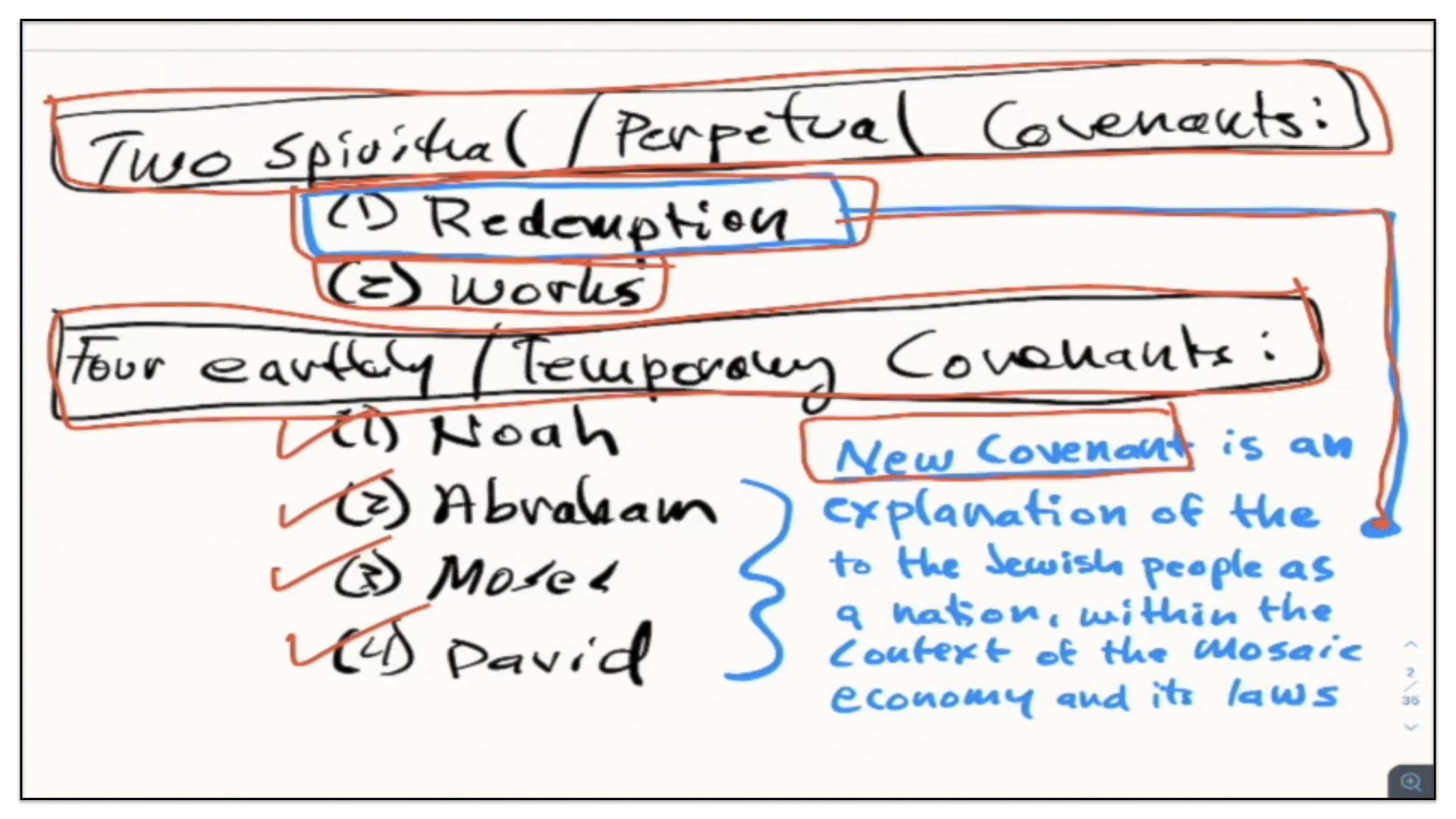
As you know—and I think by now you could probably write out the notes for yourself on a piece of paper by memory—as you know, I take the view that the biblical covenants are divided into two categories. The first category are two spiritual and perpetual covenants, that of Redemption and that of Works. The second category is four earthly and temporary covenants, that which God made with Noah, Abraham, Moses and David. As for the New Covenant, I don’t believe the New Covenant is an actual covenant, but rather, it’s an explanation of the Covenant of Redemption to the Jewish people as a nation within the context of the Mosaic economy and its laws.
Comparative Views Of The New Covenant
Now in our previous study, I dedicated the whole of that study to giving to you an overview on my thoughts concerning this New Covenant. And I mentioned at the close of last week’s study that I hadn’t yet finished my thoughts on the subject, which I hope to do now in this study. I’d like to do a little comparison with you on the way in which several different groups understand the New Covenant, and the reasons for which I don’t agree with those views. And then I’ll reaffirm to you my understanding of the New Covenant.
The Views I Set Forth For The Various Groups Are Representative Of The Whole, But Do Not Reflect Every View Maintained By The Individuals Within Each Group
Now let me preface my thoughts. I should have done this in previous studies and I may not have done so, but I take for granted you realize this, but I suppose it’s good that I mention it to you officially. Of course, the views I present to you from other groups or even the views I present to you from my own group—the High-Calvinists, or the Hyper-Calvinists—these are representative views. It’s not to say that the views I’m going to give to you from the Presbyterians and the Reformed Baptists and the High-Calvinists, that I’m crossing the t and dotting the i for every individual that belongs to each of those groups. I’m not. Within each of those groups, most people will cross their ’t’’s and dot their ‘i’’s different from one another. So there’s a wide range of views within these groups. All I’m doing is taking an overview or a representative view for each group. And it’s sufficient to give you a broad idea on what it is each of these groups believes concerning the biblical covenants and in particular, as I’ve said, what these groups believe concerning the New Covenant which will be our focus now.
The View Of The Presbyterians And The Traditional Reformed Baptists
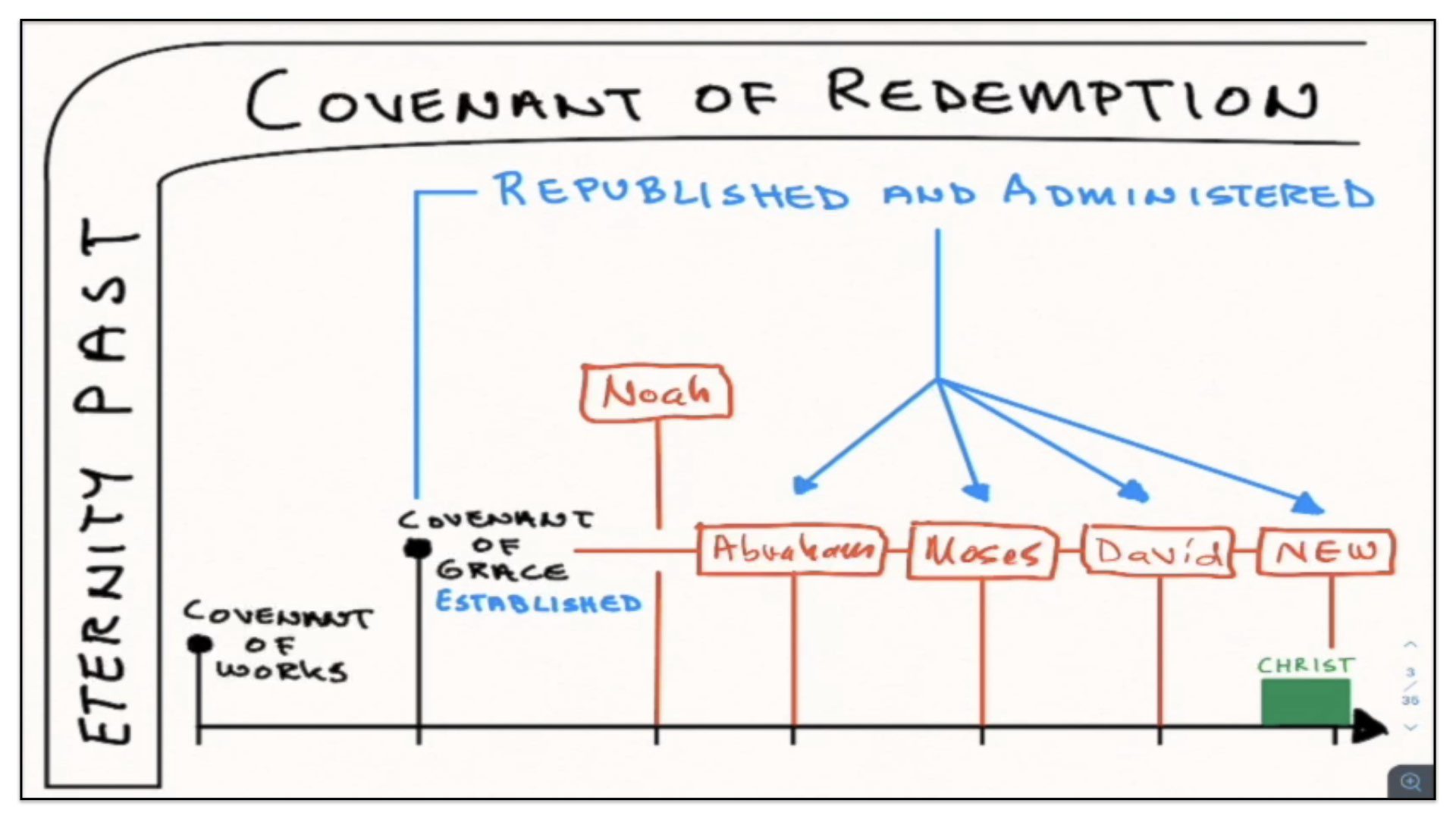
The first couple of groups I would like to highlight for you—and I have highlighted these groups for you in previous studies, I’m going to do it again—are the Presbyterians and the traditional Reformed Baptists. These two groups have a lot in common with each other. And if I understand their teachings correctly, their framework of the biblical covenants could be presented in this form. I don’t want you to be lost in the notes by trying yourself to decipher what you see on the screen. If you just follow my explanations without trying to figure it out for yourself, I think you’ll be benefited by that. So please listen carefully as I give the explanation to the chart or diagram.
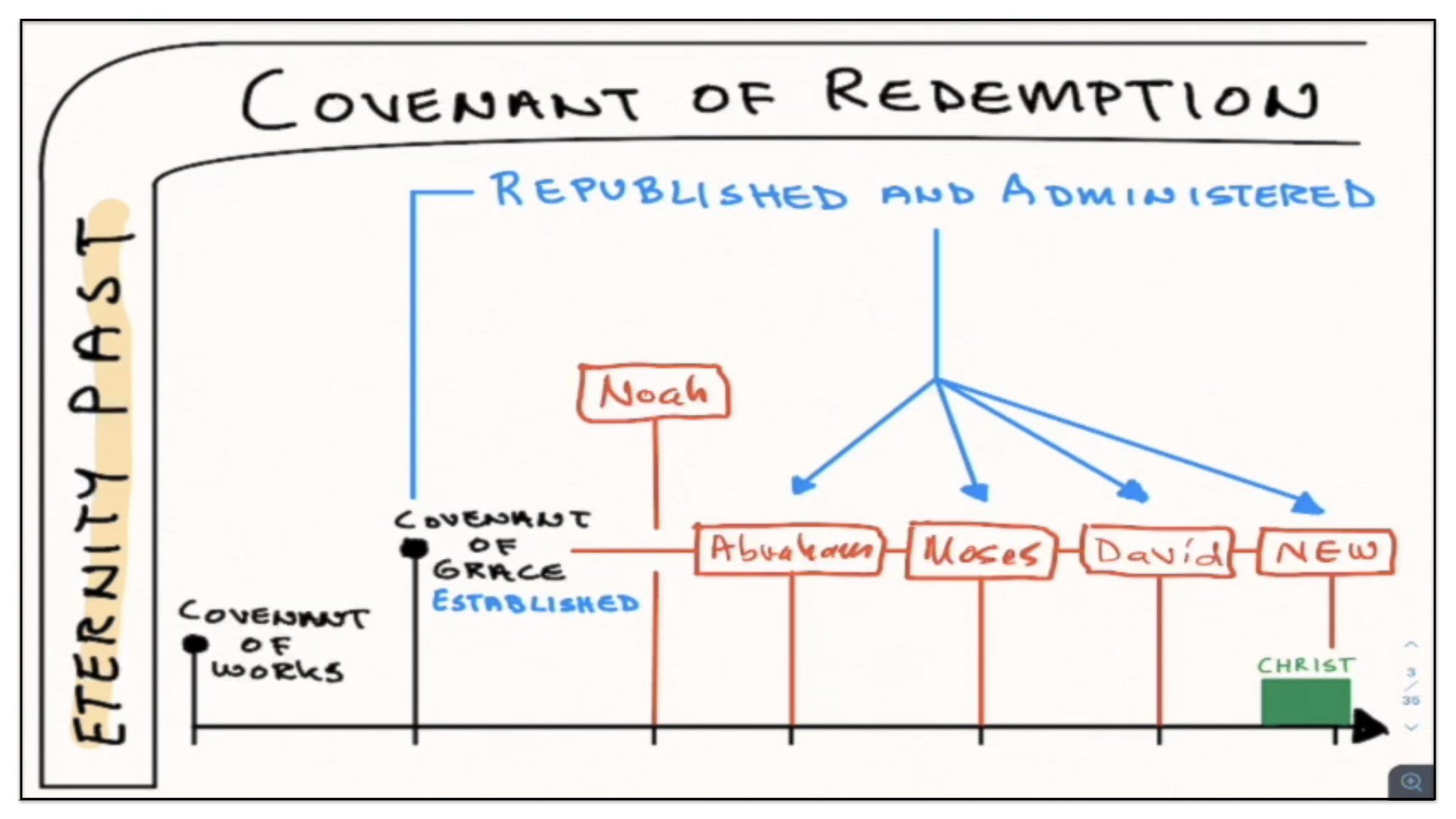
The Presbyterians and traditional Reformed Baptists will often refer to something they call eternity past and they get this idea from a scriptural expression, before the foundation of the world. So, before time began—they will refer to that point as eternity past.
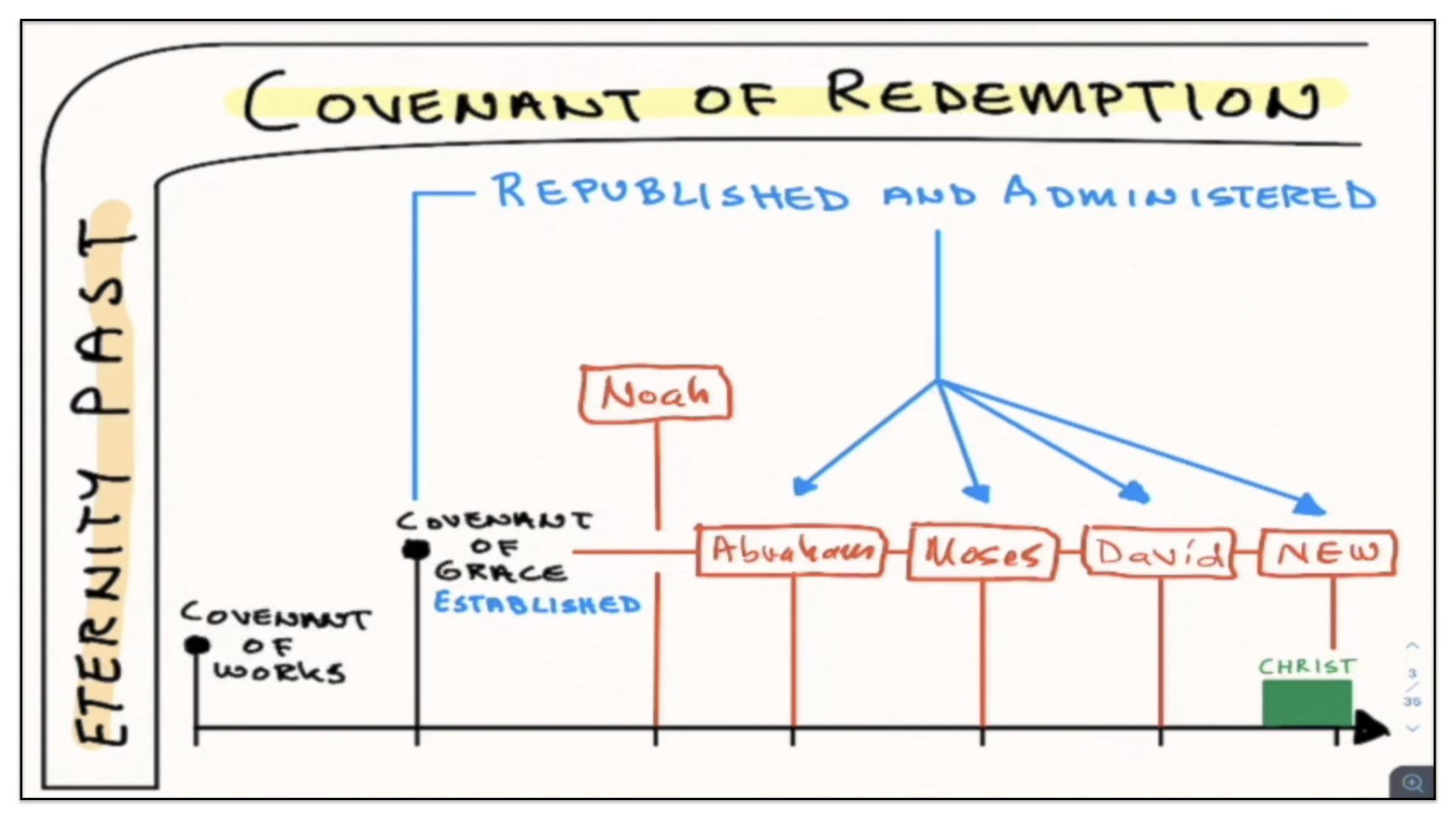
And in eternity past they believe that God has established a Covenant of Redemption. It’s an eternal covenant. The Covenant of Redemption is that agreement between the three Persons of the Godhead—the Father, the Son and the Holy Spirit—wherein the Father has chosen a people to Himself as objects of special love; the Son has agreed to redeem them from their sins; and the Spirit of God has agreed to sanctify them at the appointed time throughout the course of history. This is what they call the Covenant of Redemption. And here’s the important point—they do not believe the Covenant of Redemption penetrates time. They believe it’s purely or squarely an eternal covenant. Now that’s the first of three major covenants they subscribe to—a Covenant of Redemption.
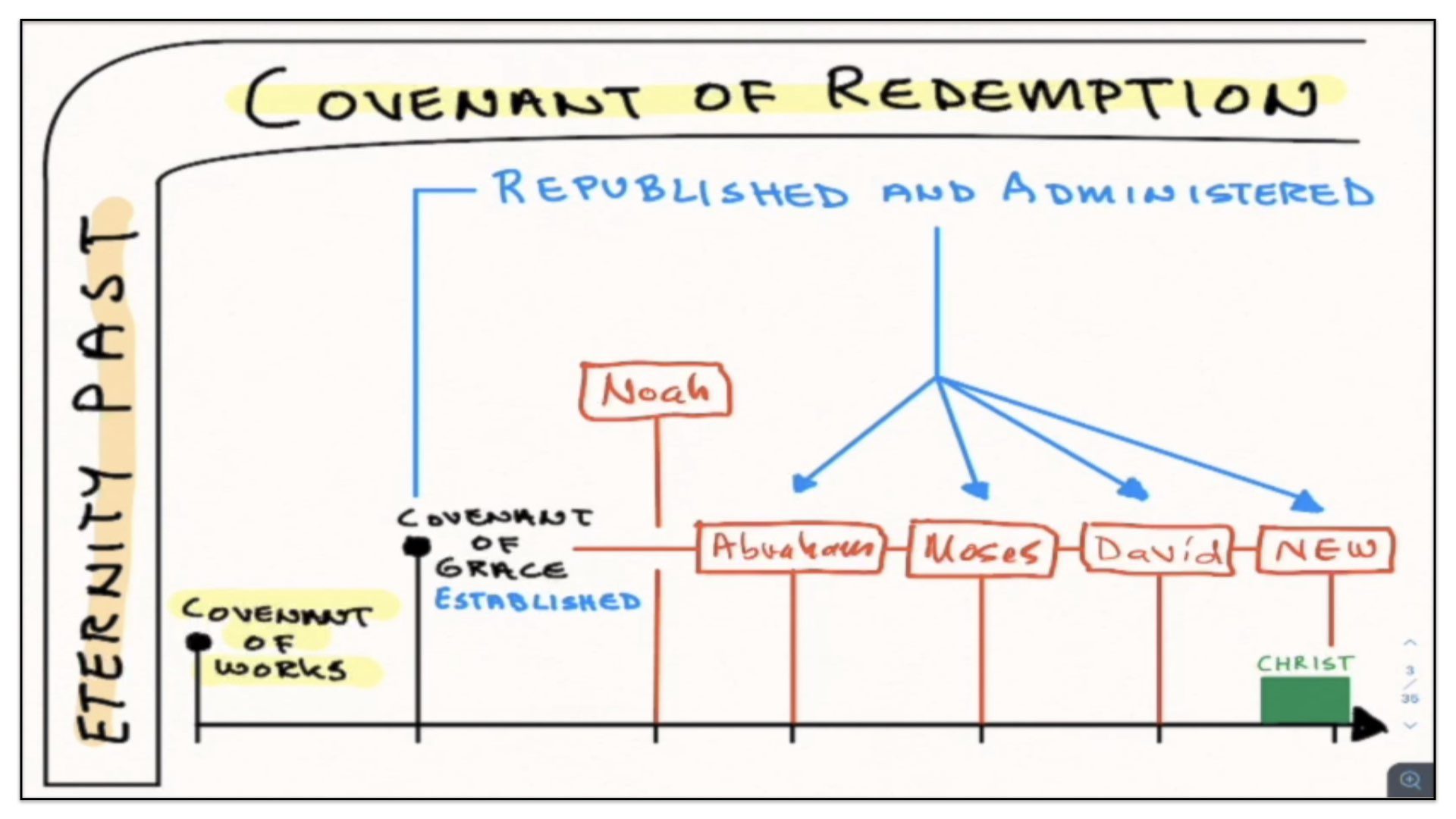
Now the second of three major covenants. They believe that after God created the heavens and the earth and created Adam, God established with Adam a Covenant of Works. It’s a conditional covenant, meaning that God required of Adam perfect obedience to the law inscribed upon his heart—to love God supremely and to love his neighbor as himself. And of course, Adam transgressed that law, violating the Covenant of Works and bringing himself under the curse of the Covenant of Works, meaning that he experienced spiritual death, physical death and possibly eternal death, unless God were to provide a means of salvation.
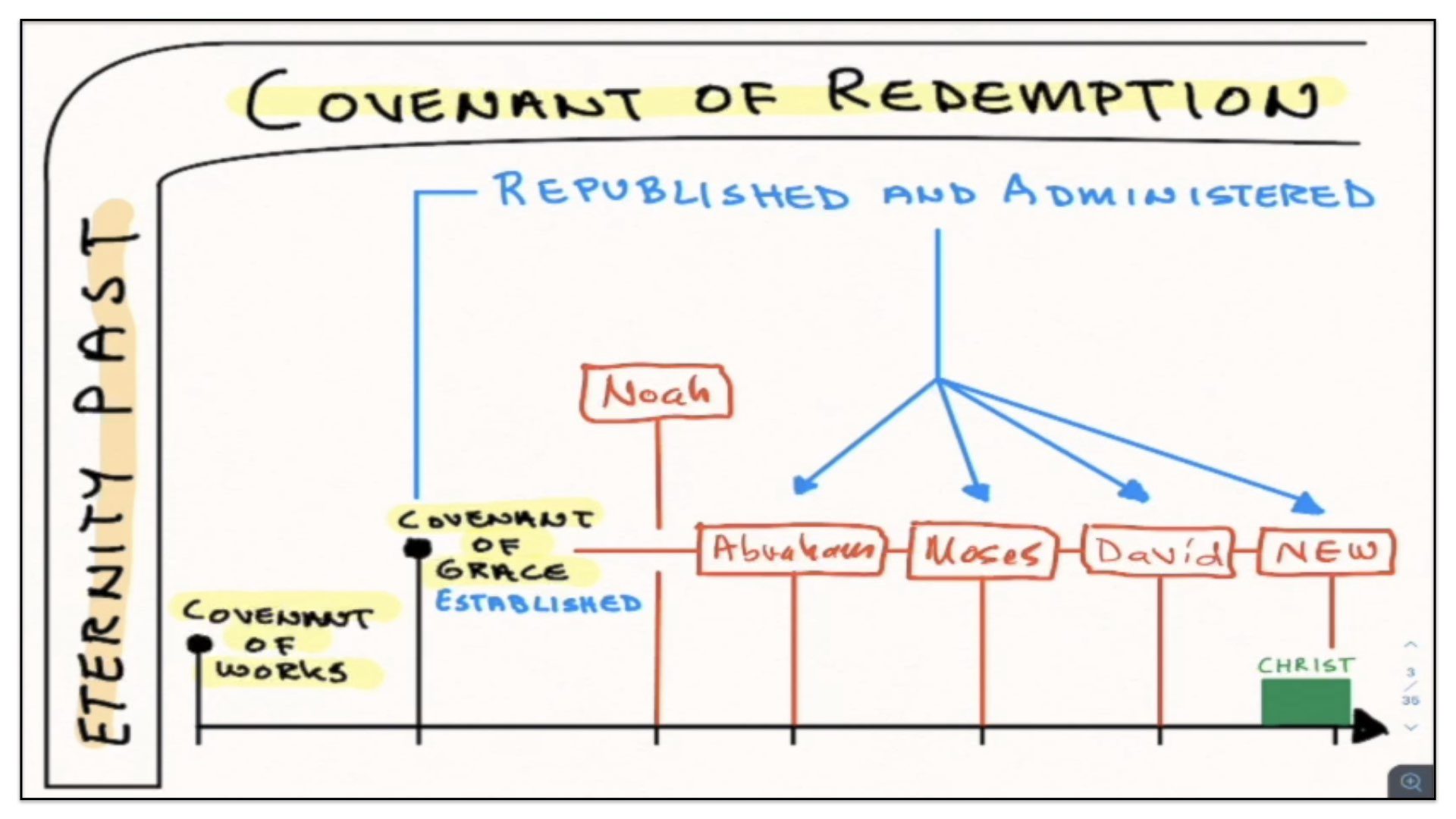
Now the third covenant the Presbyterians and the Reformed Baptists believe in—the traditional Reformed Baptists—is something they call the Covenant of Grace. This Covenant of Grace is not the same as the Covenant of Redemption. It’s a third and entirely separate covenant. They believe this Covenant of Grace is conditional on the sinner, meaning that God requires of the sinner saving faith in Christ in order to be saved. And they believe that God established this Covenant of Grace with Adam in the garden of Eden, after he sinned.
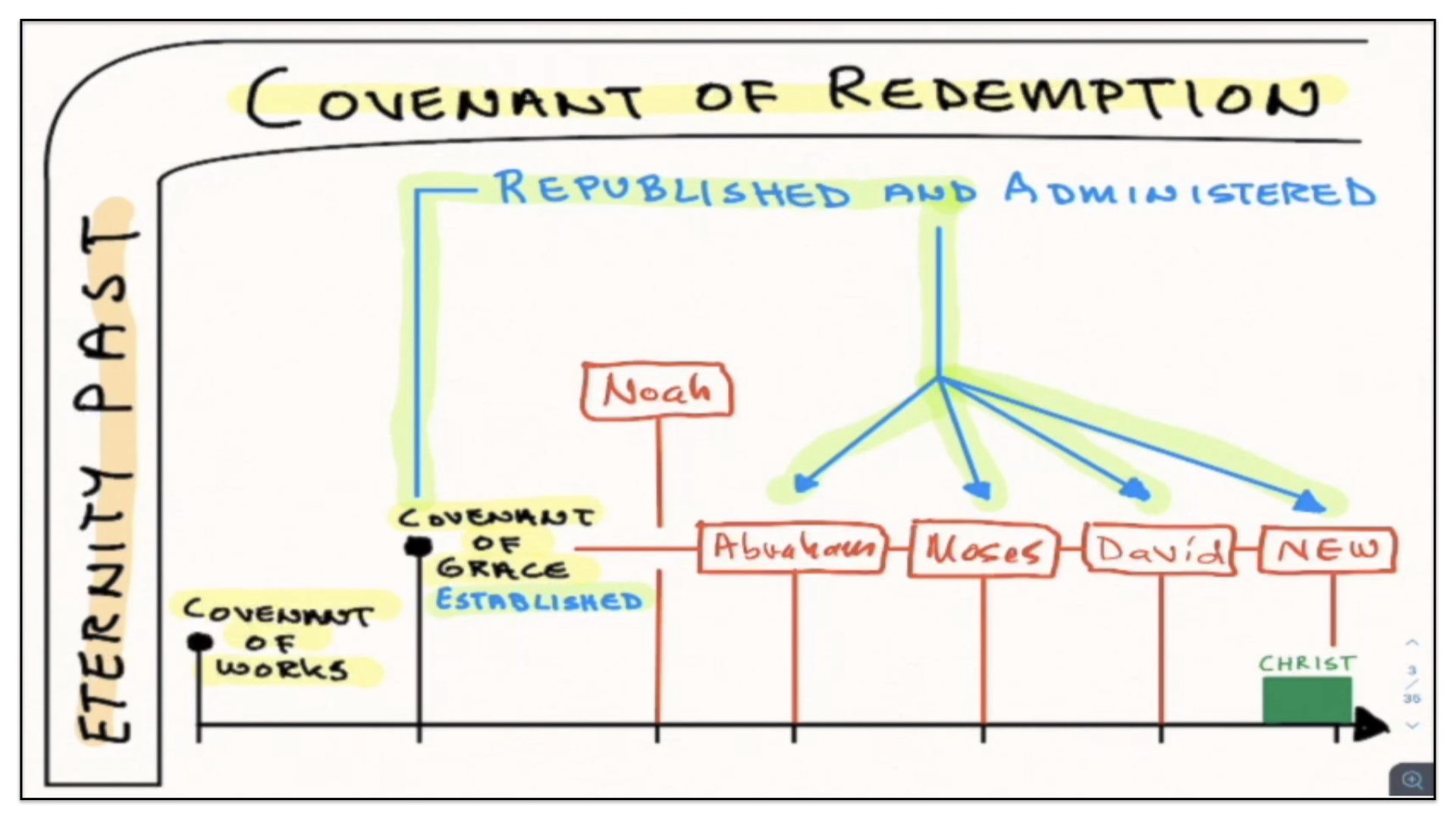
And after establishing this Covenant of Grace, this conditional Covenant of Grace, they then believe that God republished this Covenant of Grace, this conditional Covenant of Grace, with Abraham, and with Moses, and with David in what is called in the Old and New Testament scriptures the New Covenant. In other words, the Abrahamic Covenant, they say, is the Covenant of Grace; the Mosaic Covenant is also the Covenant of Grace; the Davidic Covenant is also the Covenant of Grace; the New Covenant is the Covenant of Grace. The difference between them—it’s the same covenant, but there is a difference—they say, that God is administering the Covenant of Grace he established in the garden of Eden in different ways throughout the course of history. So He administered it in one way to Adam and Eve in the garden of Eden, He then administered it in a slightly different way with Abraham under that covenant; then He administered it in a slightly different way with Moses and the children of Israel under that covenant; together with that of David and then finally when Christ came into the world, this Covenant of Grace, this conditional Covenant of Grace, is administered to Christians, it is called a New Covenant; a new administration of that same covenant. Now you see, in a nutshell that’s what the Presbyterians and the traditional Reformed Baptists believe concerning the New Covenant. They believe the New Covenant is this conditional Covenant of Grace.
The Reasons I Disagree With The Presbyterians And The Traditional Reformed Baptists
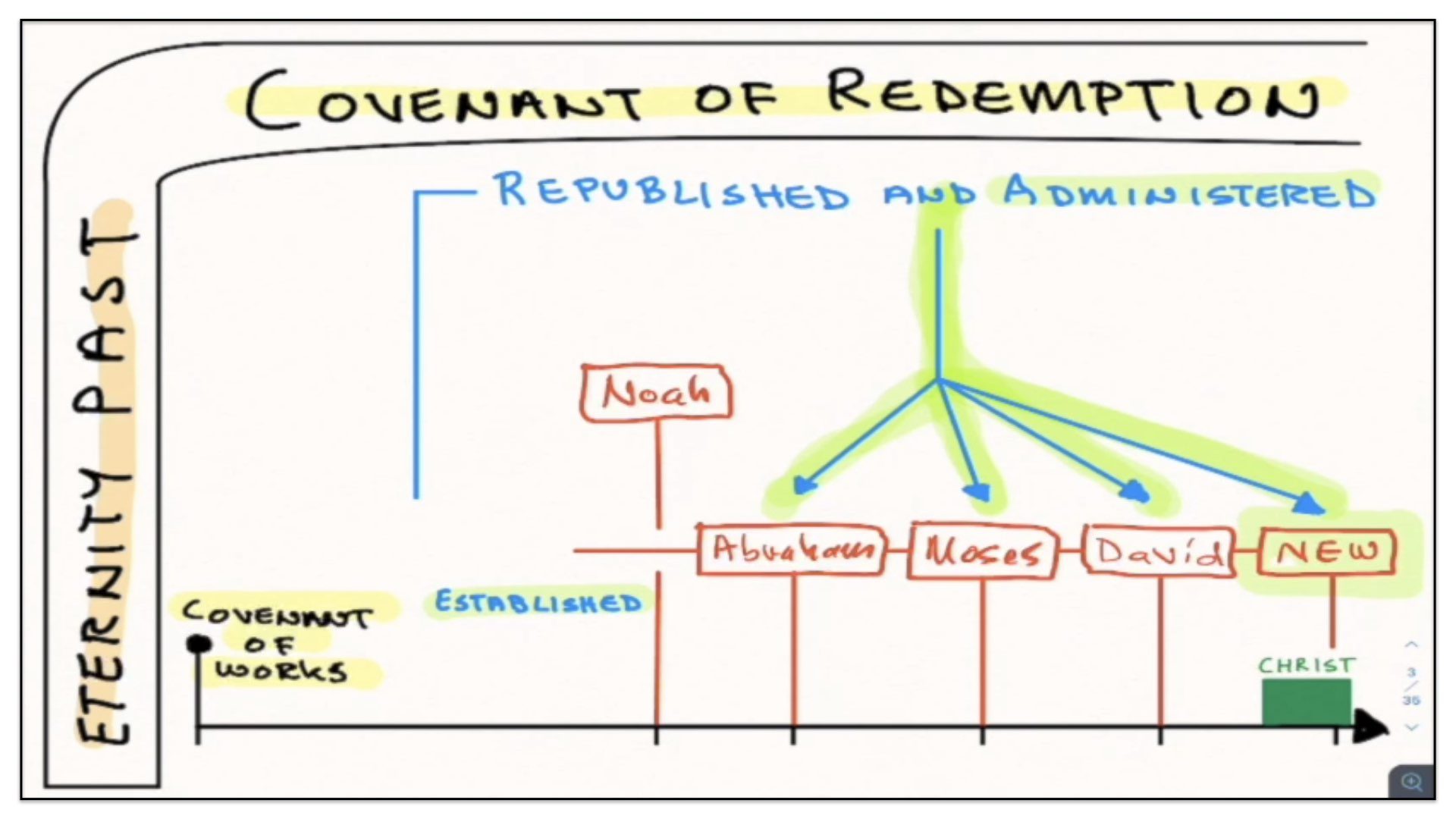
Okay. Well, let me just briefly explain why I disagree with this viewpoint. I do not believe the scriptures identify a conditional Covenant of Grace. I don’t believe it exists.
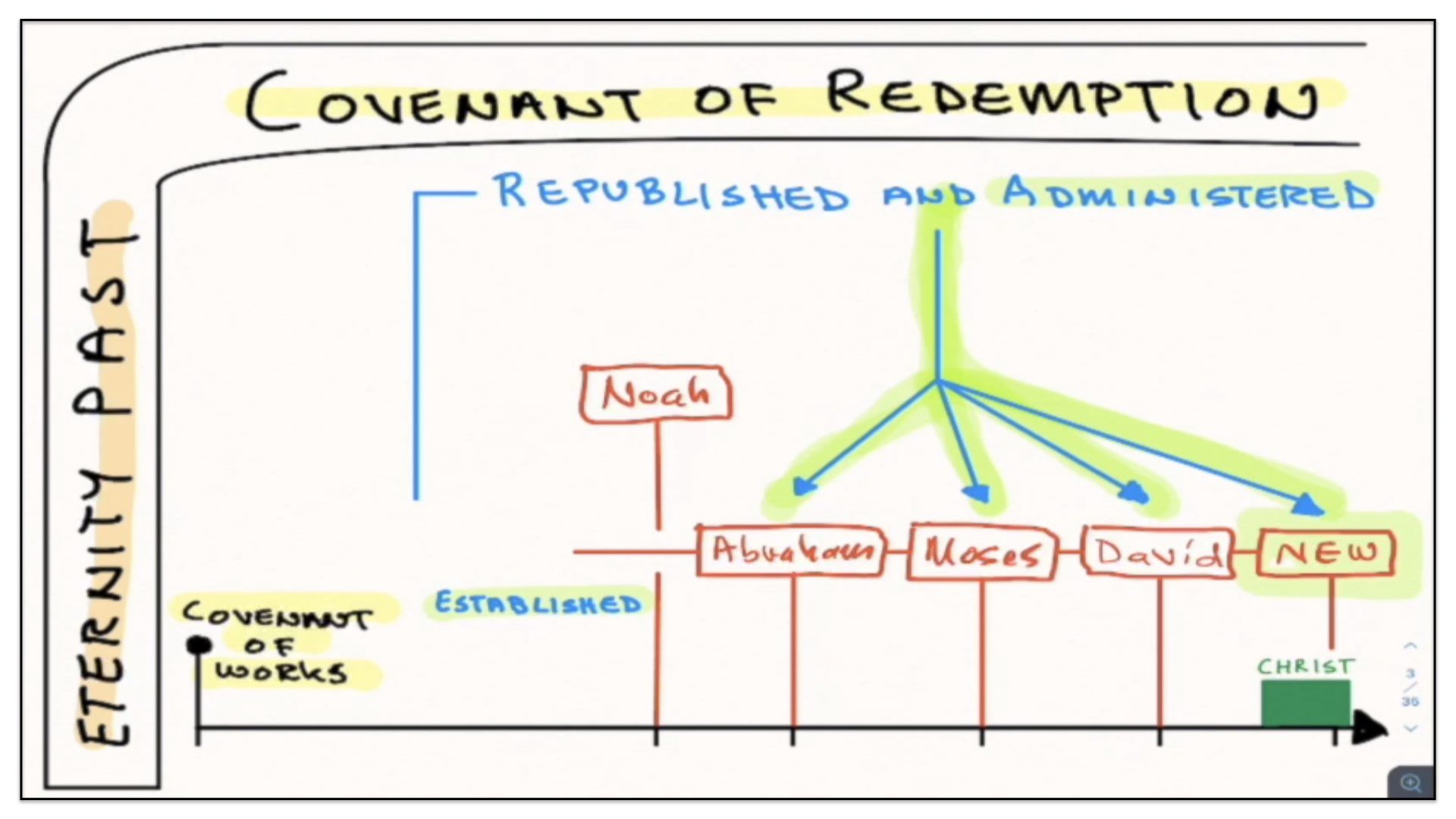
And therefore I don’t believe a conditional Covenant of Grace was established by God.with Adam in the garden of Eden.
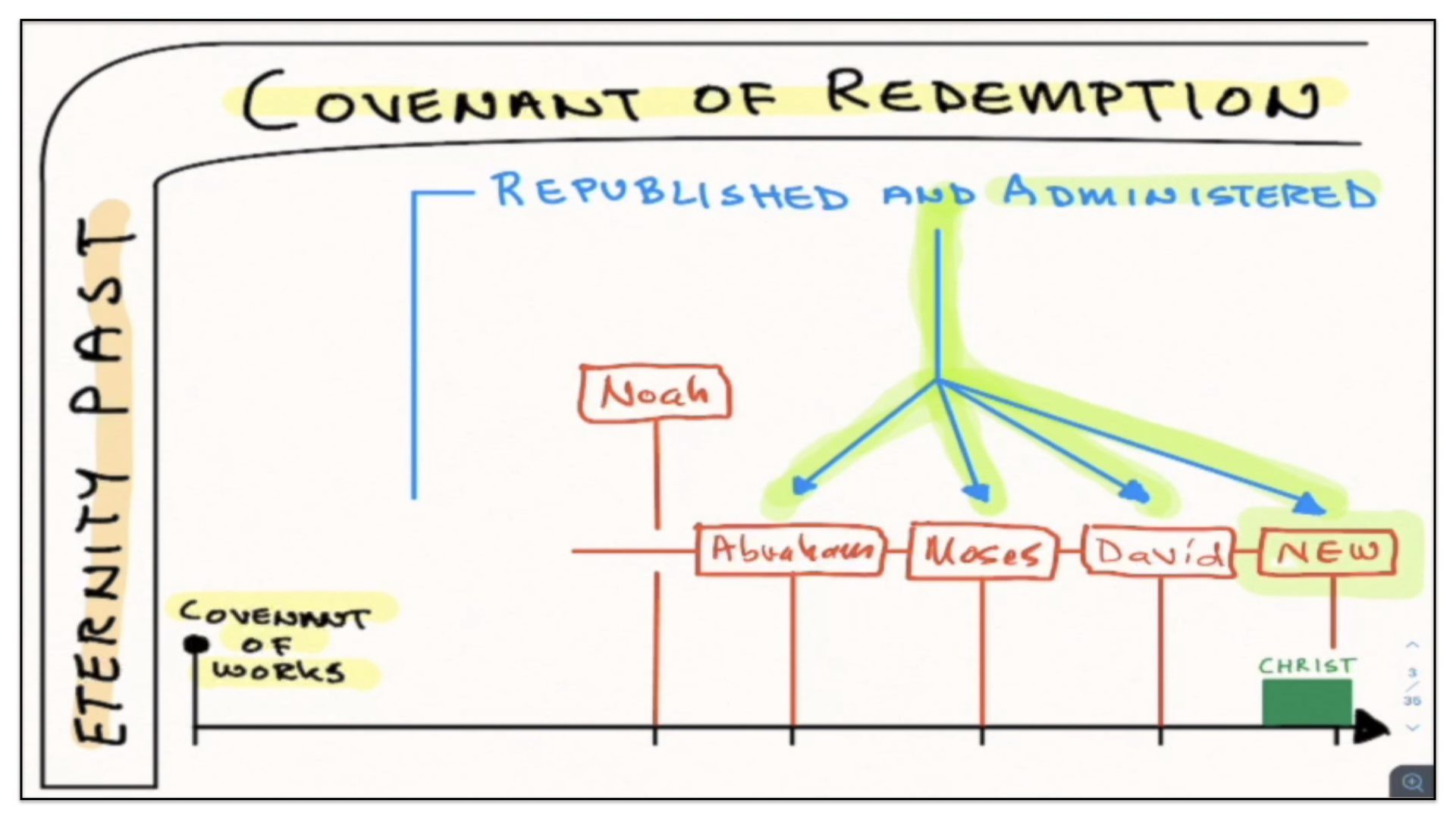
And therefore I don’t believe it could possibly be republished with Abraham, and with Moses and with David.
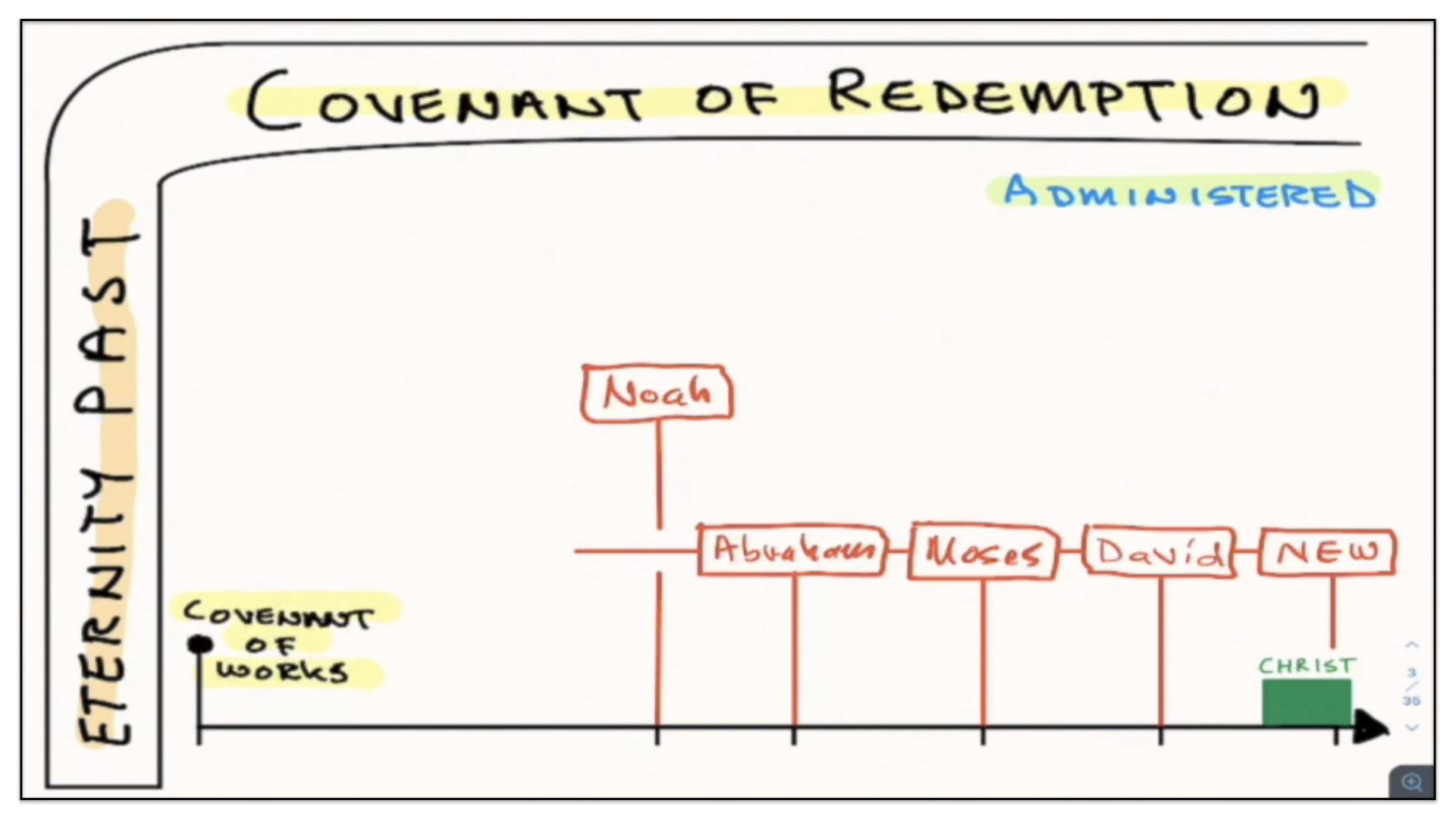
And I don’t believe it’s therefore administered to any of them either.
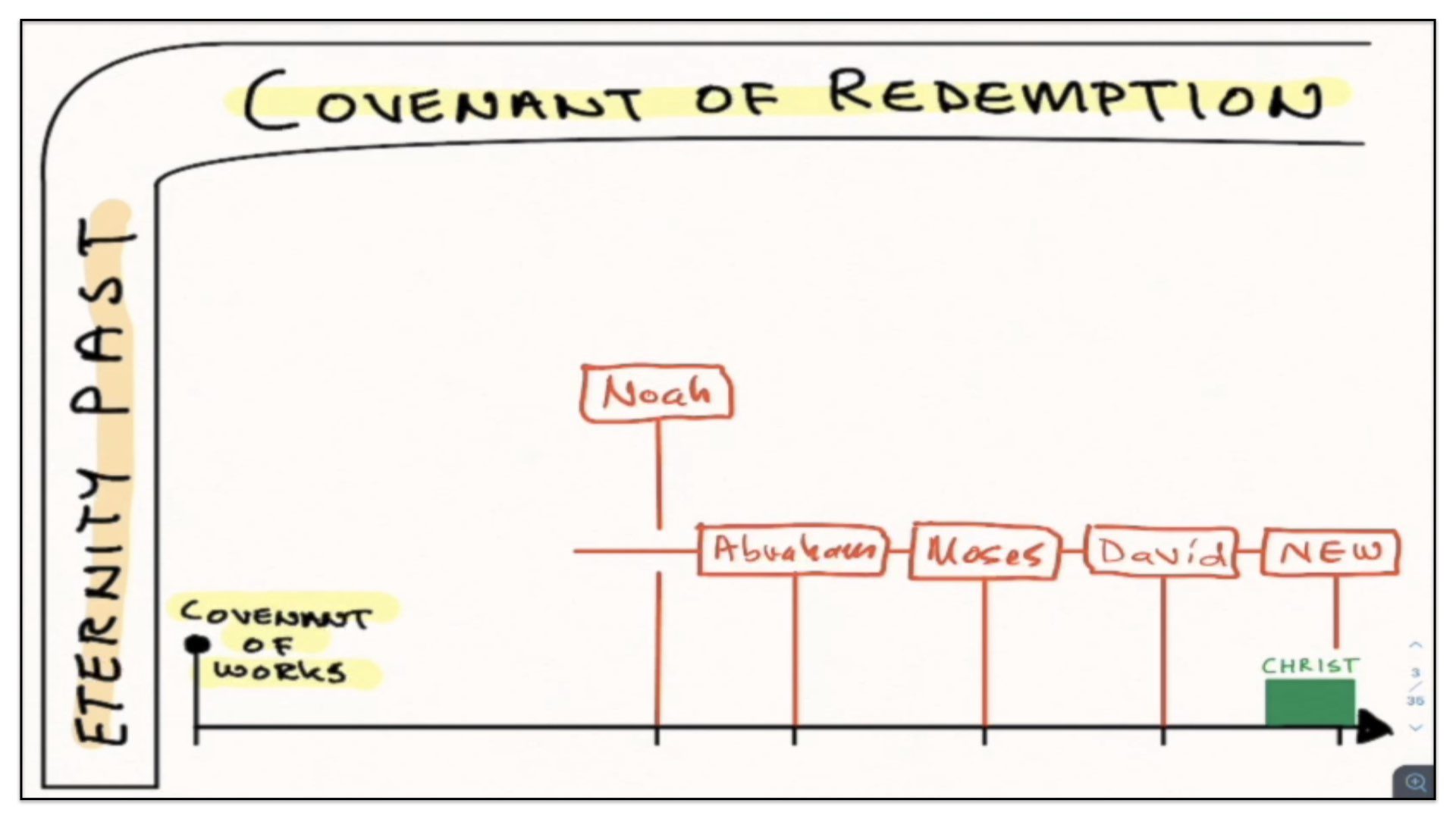
Now, by removing the conditional Covenant of Grace, and therefore taking away the idea that that covenant has been republished and is an administration for the covenant of made with Abraham, Moses, David and the New Covenant, you see the whole framework is dismantled. And whatever the covenants are that God made with Abraham, Moses, David and the New Covenant, I don’t believe it has anything to do with the conditional Covenant of Grace. And therefore I reject outright this framework of the Presbyterians and the traditional Reformed Baptists.
Now my dear friends, before I pass on to the next group of views, let me mention to you that when you sit under the teachings of a Presbyterian or a traditional Reformed Baptist, you should keep in mind this framework, because that is what they’re teaching. That’s how they’re interpreting the scriptures. And when they use language such as the Covenant of Redemption or the Covenant of Grace, and they refer to the Abrahamic Covenant, and the Mosaic Covenant, they’re giving to you the teachings based on this framework. And that should help you better understand where they’re coming from and what it is they’re attempting to explain in their sermons and lectures.
The View Of The 1689 Federalists
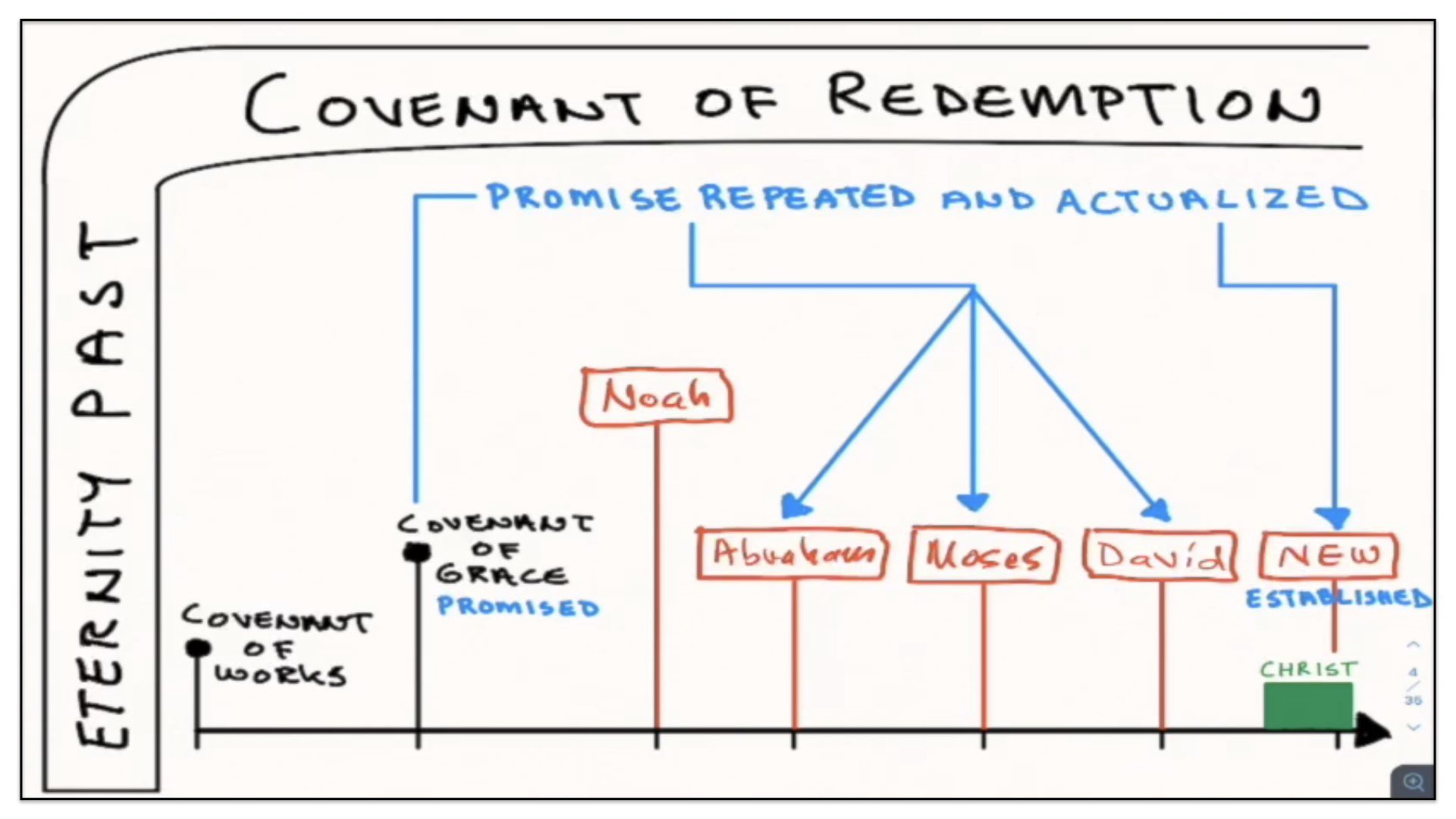
Okay. Well, that’s one view. Let’s take a look at another view. This is of another branch of Reformed Baptists and this branch of Reformed Baptists are known as the 1689 Federalists. And their view is similar, but quite different from the preceding view. It looks something like this.
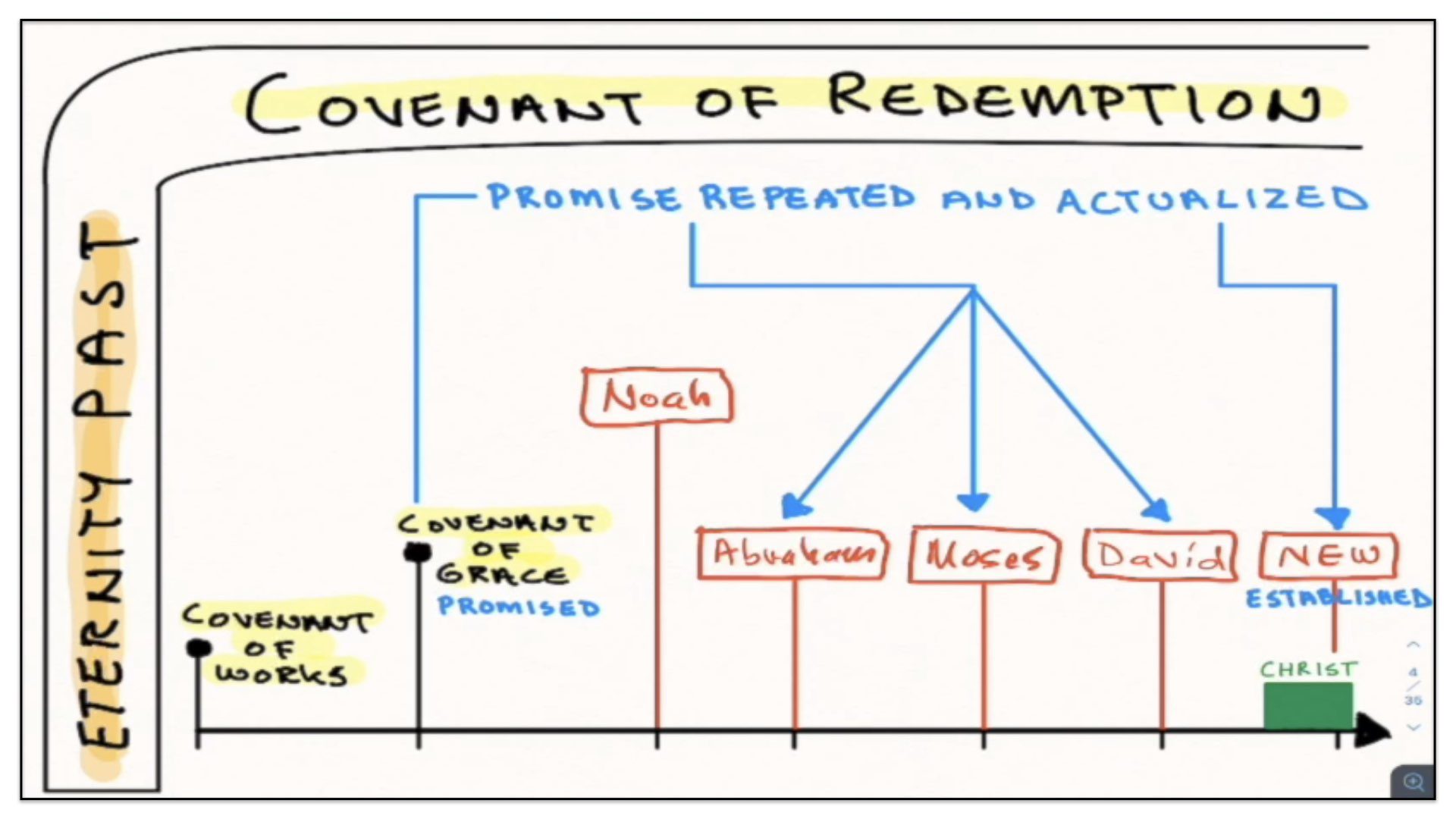
Once more we have this idea of eternity past, before the foundation of the world, and then we also have three major covenants. This is very similar to the Presbyterians and the traditional Reformed Baptists. They believe that there’s a Covenant of Redemption. They believe that there’s a Covenant of Works made with Adam before he sinned, And they also believe that there is a Covenant of Grace which is separate from the Covenant of Redemption. They believe the Covenant of Grace is conditional on a sinner savingly believing on Christ in order to be saved.
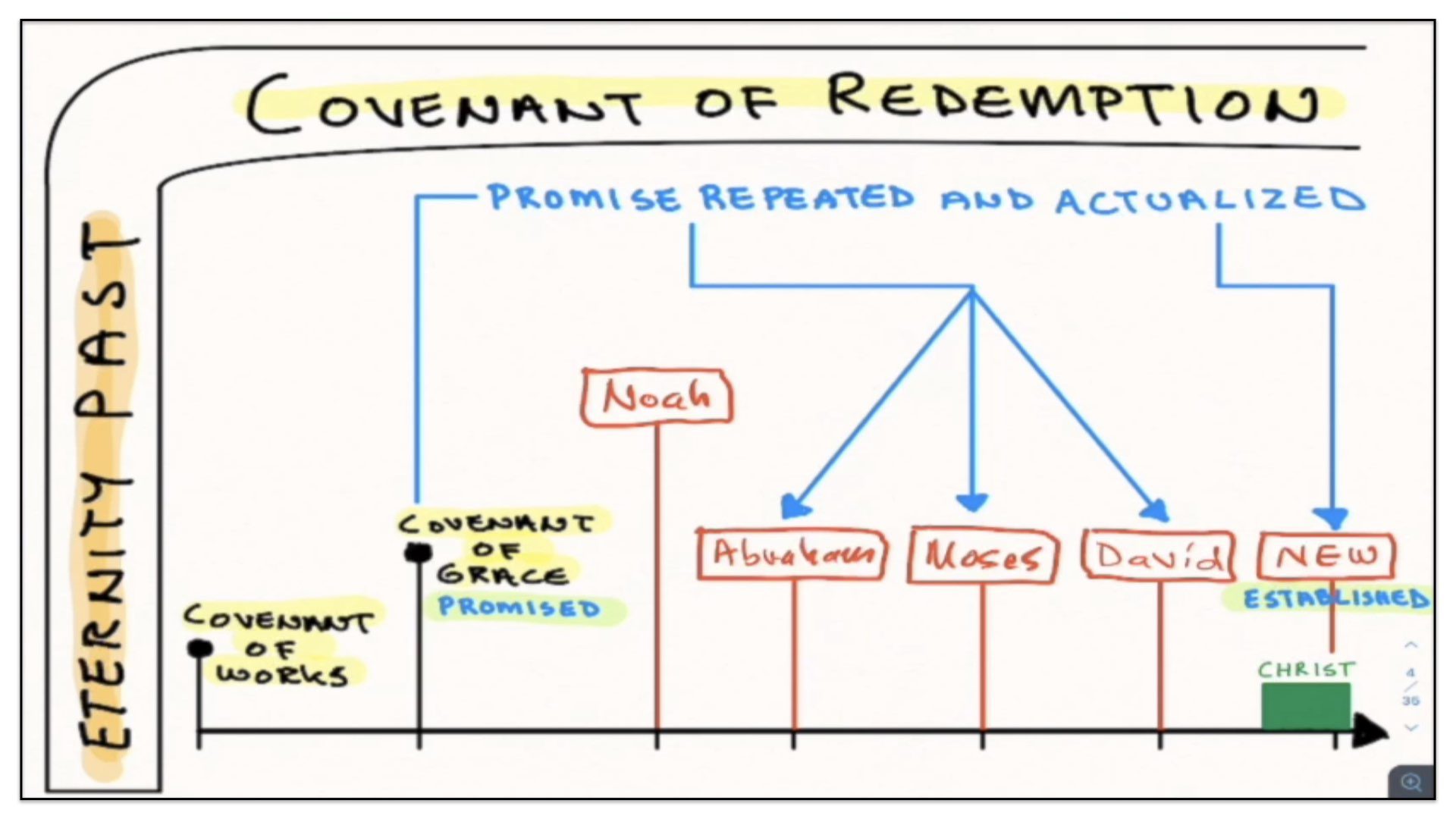
But now things differ in this view of the New Covenant from the preceding view of the Presbyterians and the traditional Reformed Baptists. For the 1689 Federalists, watch this carefully, they do not believe the Covenant of Grace, this conditional Covenant of Grace, was established by God with Adam in the garden of Eden. They don’t believe that. Rather, they believe God promised to establish this conditional Covenant of Grace at Calvary, when the Messiah would come into the world and would die, and would make a sacrificial offering to God through the shedding of His precious blood.
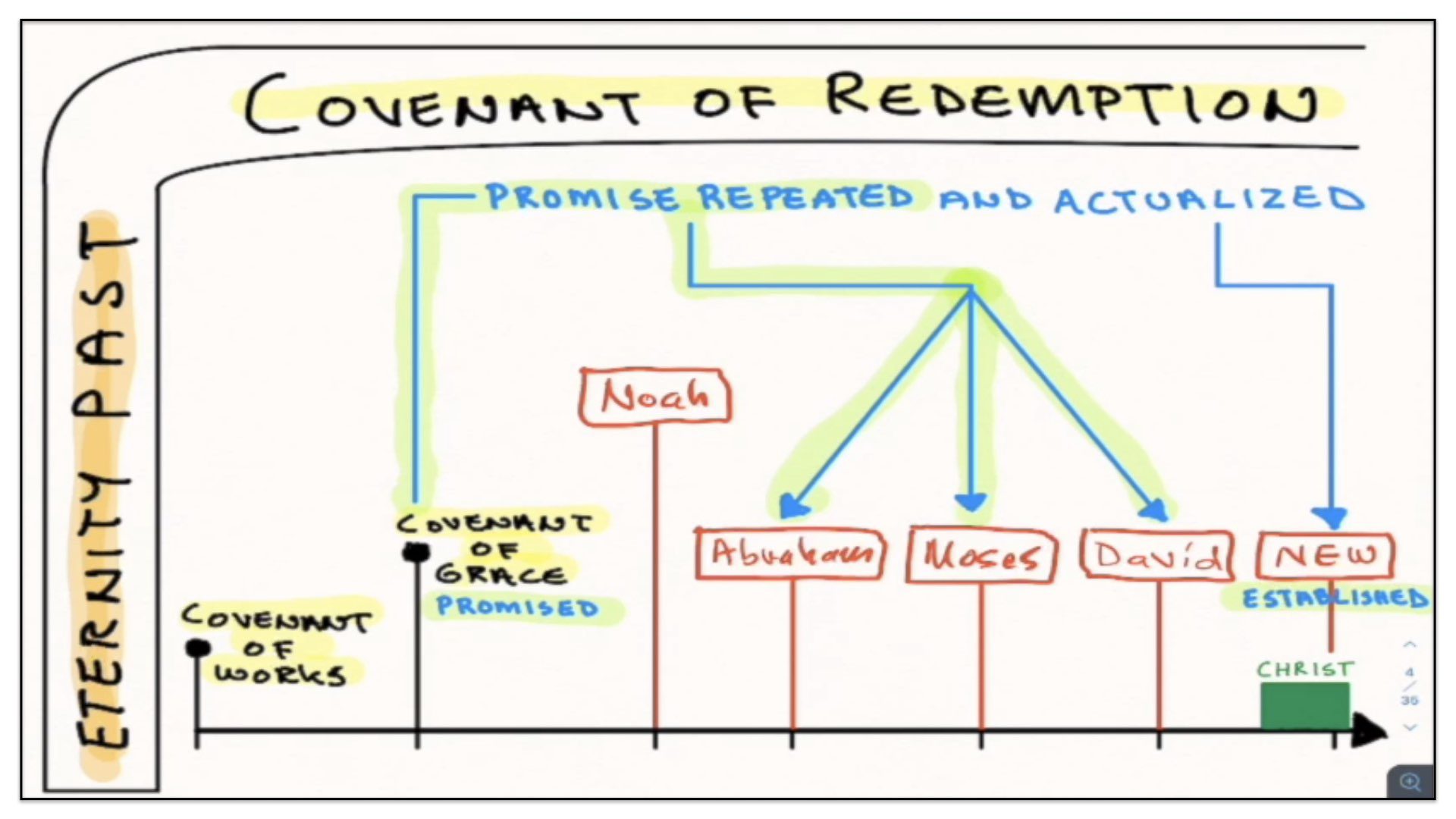
Now watch, based on this view, the 1689 Federalists then believe that this conditional Covenant of Grace, the promise of it, is repeated with the covenant God made with Abraham, and the covenant God made with Moses and the covenant God made with David. The promise is repeated in those covenants.
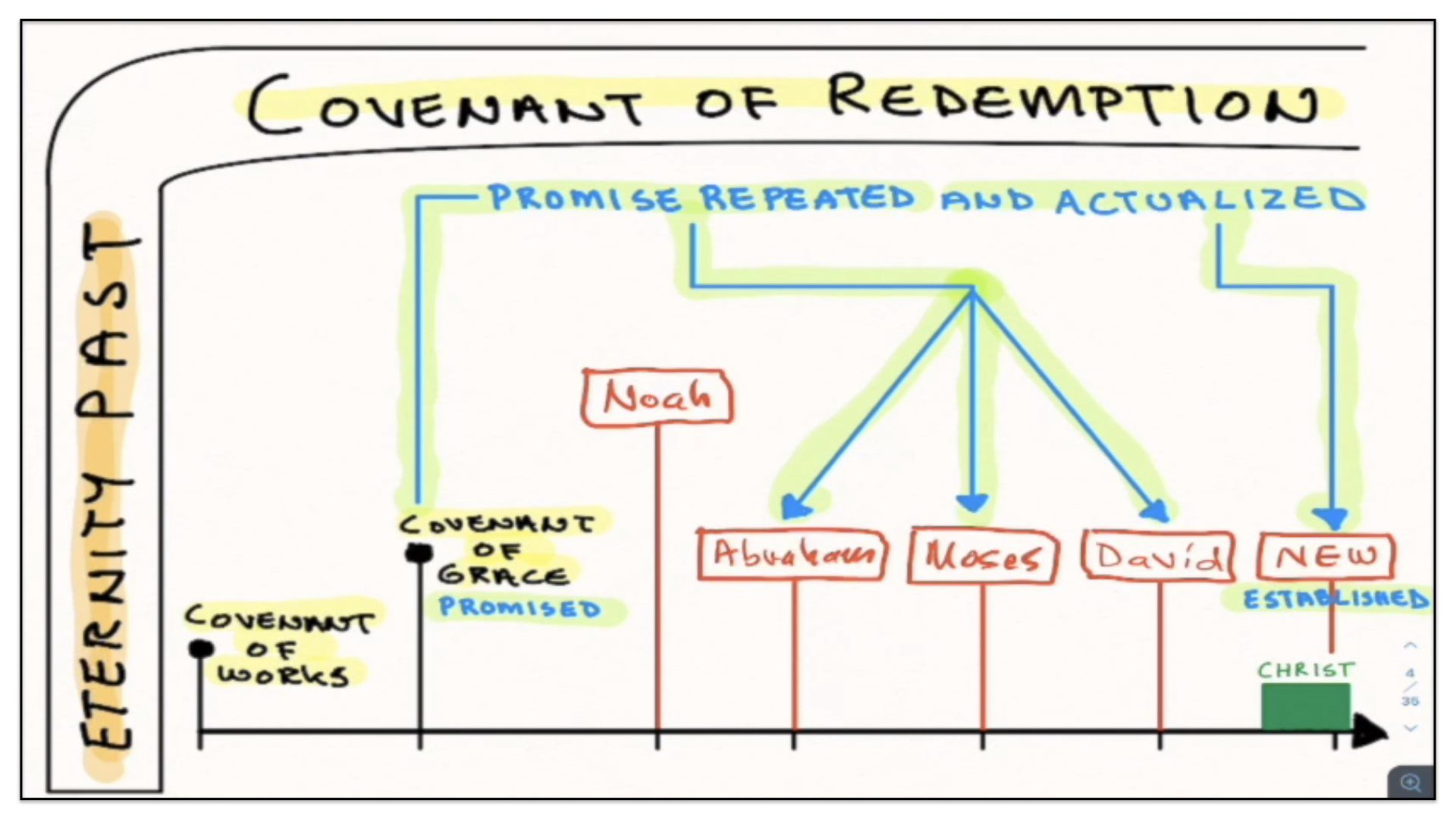
But the conditional Covenant of Grace is actualized or becomes a concrete reality when Christ comes into the world and dies at Calvary.
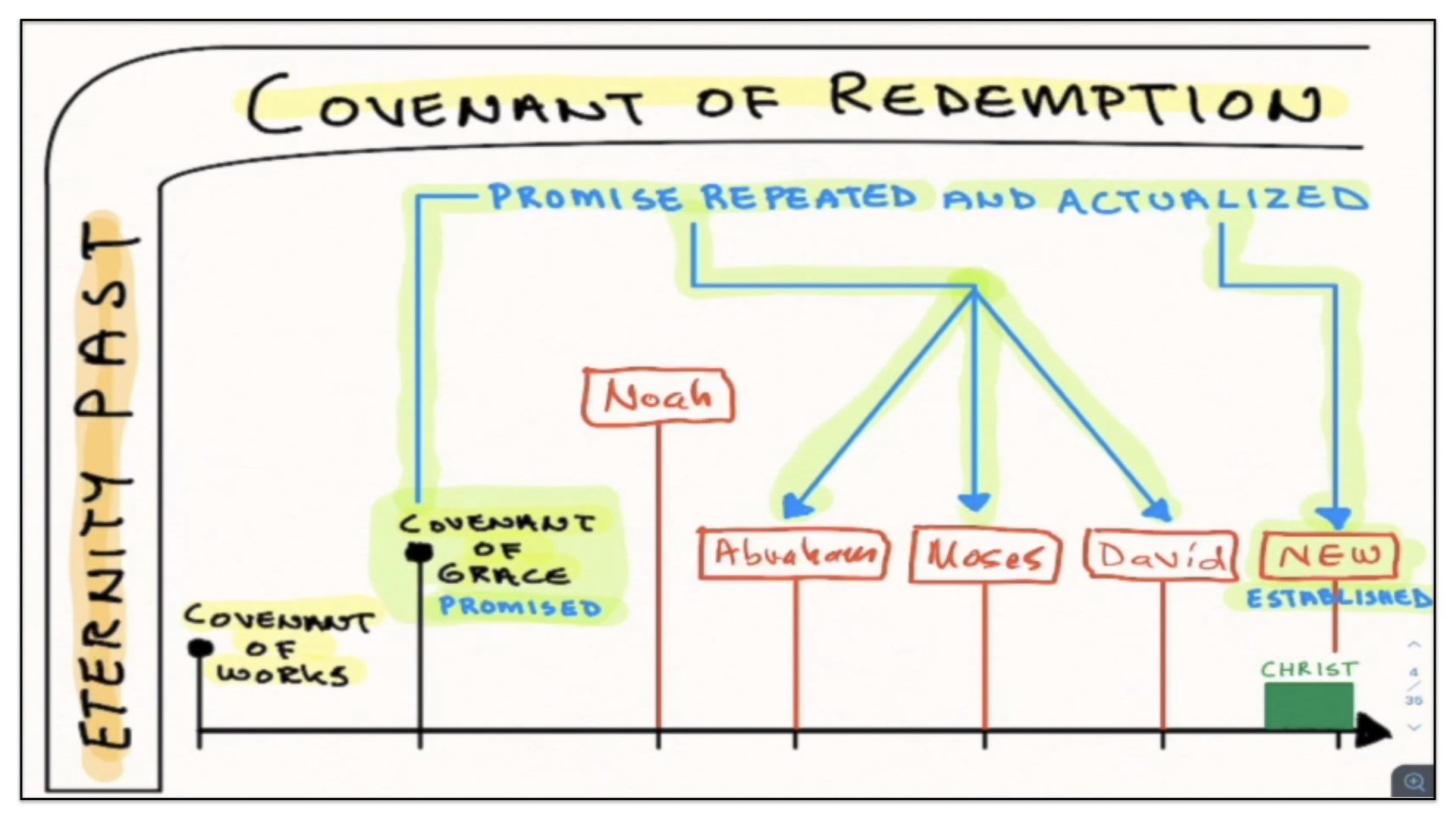
And at that time they say the New Covenant is the conditional Covenant of Grace. Do you see how their view differs from that of the Presbyterians and the traditional Reformed Baptists? The Presbyterians and traditional Reformed Baptists believe the covenants God made with Abraham, Moses and David are the Covenant of Grace. Whereas the 1689 Federalists would not say that. They would say that the covenant God made with Abraham is the conditional Covenant of Grace. They would say that the covenant God made with Abraham contains the promise that God will establish a conditional Covenant of Grace and it’s not until Christ came into the world and accomplished His work of redemption that that covenant was formalized or established. Now in a nutshell, that’s the view of the 1689 Federalists.
The Reasons I Disagree With The 1689 Federalists
What’s my problem with the view? Why do I disagree with it? Well for the same reasons I disagree with the Presbyterians and the Traditional Reformed Baptists.
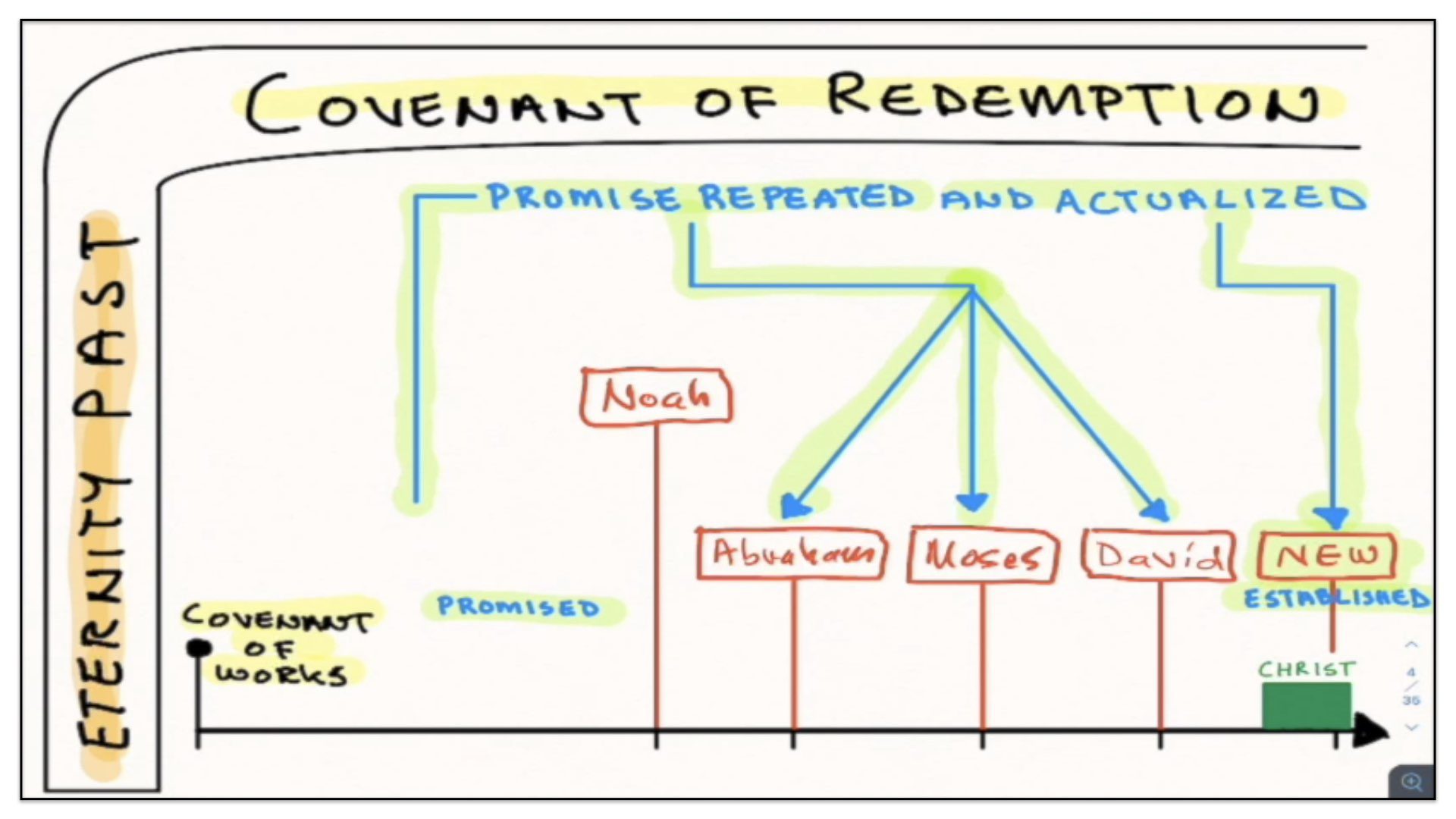
First, I don’t believe that there is any such thing as a conditional Covenant of Grace. Doesn’t exist.

And therefore I don’t believe that was promised by God to Adam in the garden of Eden.
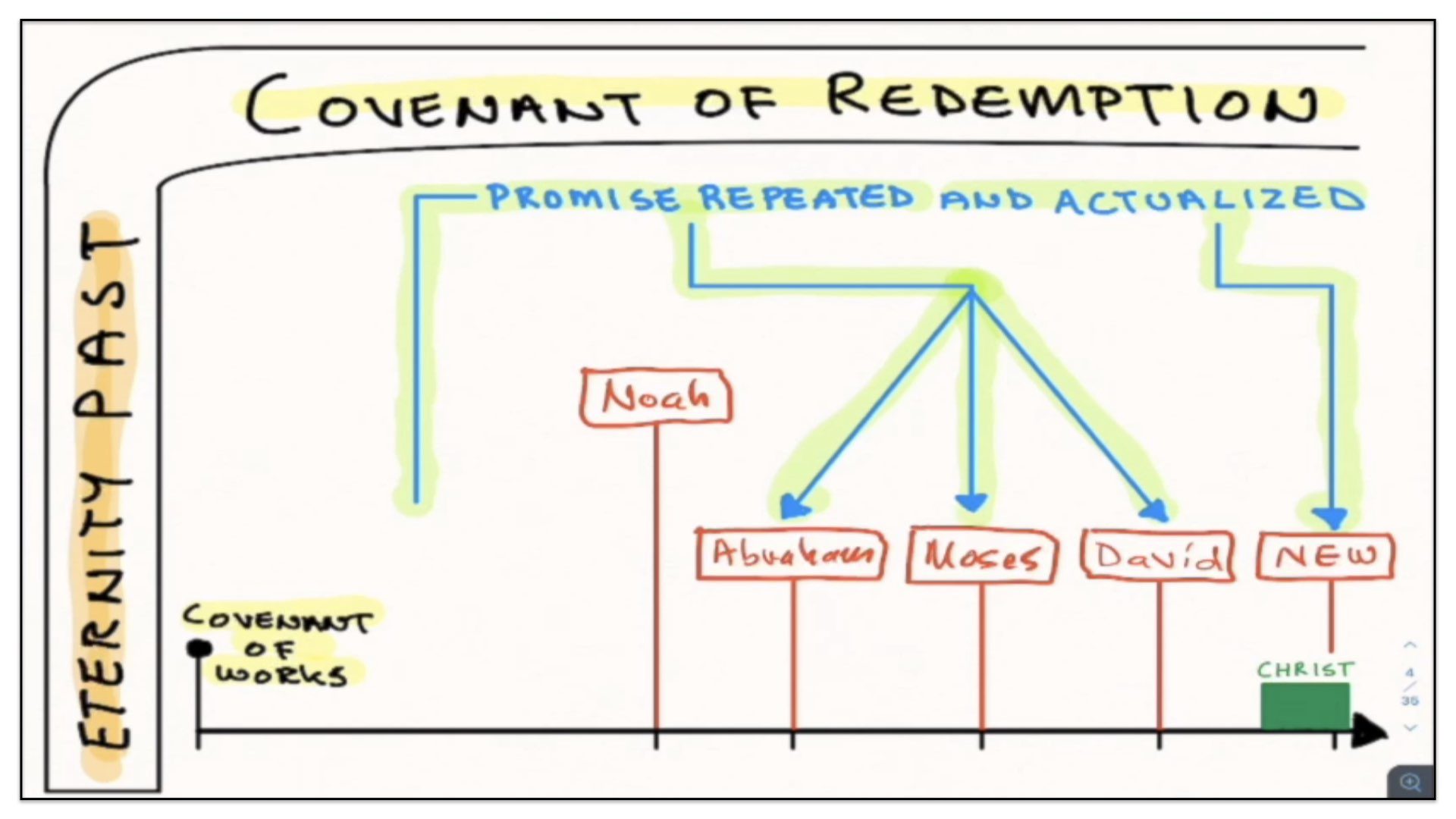
Nor do I believe it was established by God with Christ at Calvary.
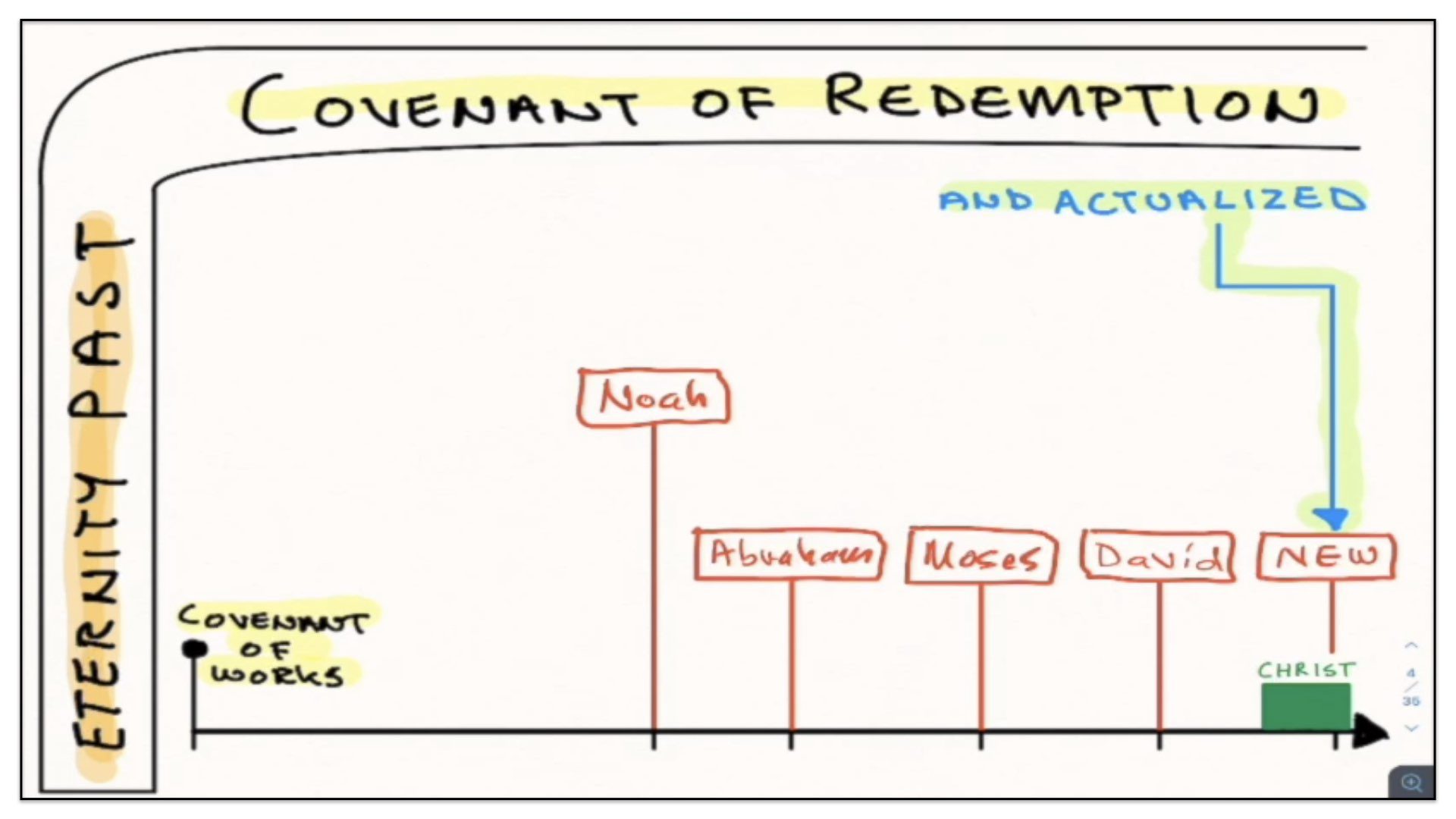
And therefore this supposed conditional Covenant of Grace as not promised by God to Abraham under the Abrahamic Covenant, nor was it promised by God to Moses under the Mosaic Covenant, nor was it promised by God to David under the Davidic Covenant.
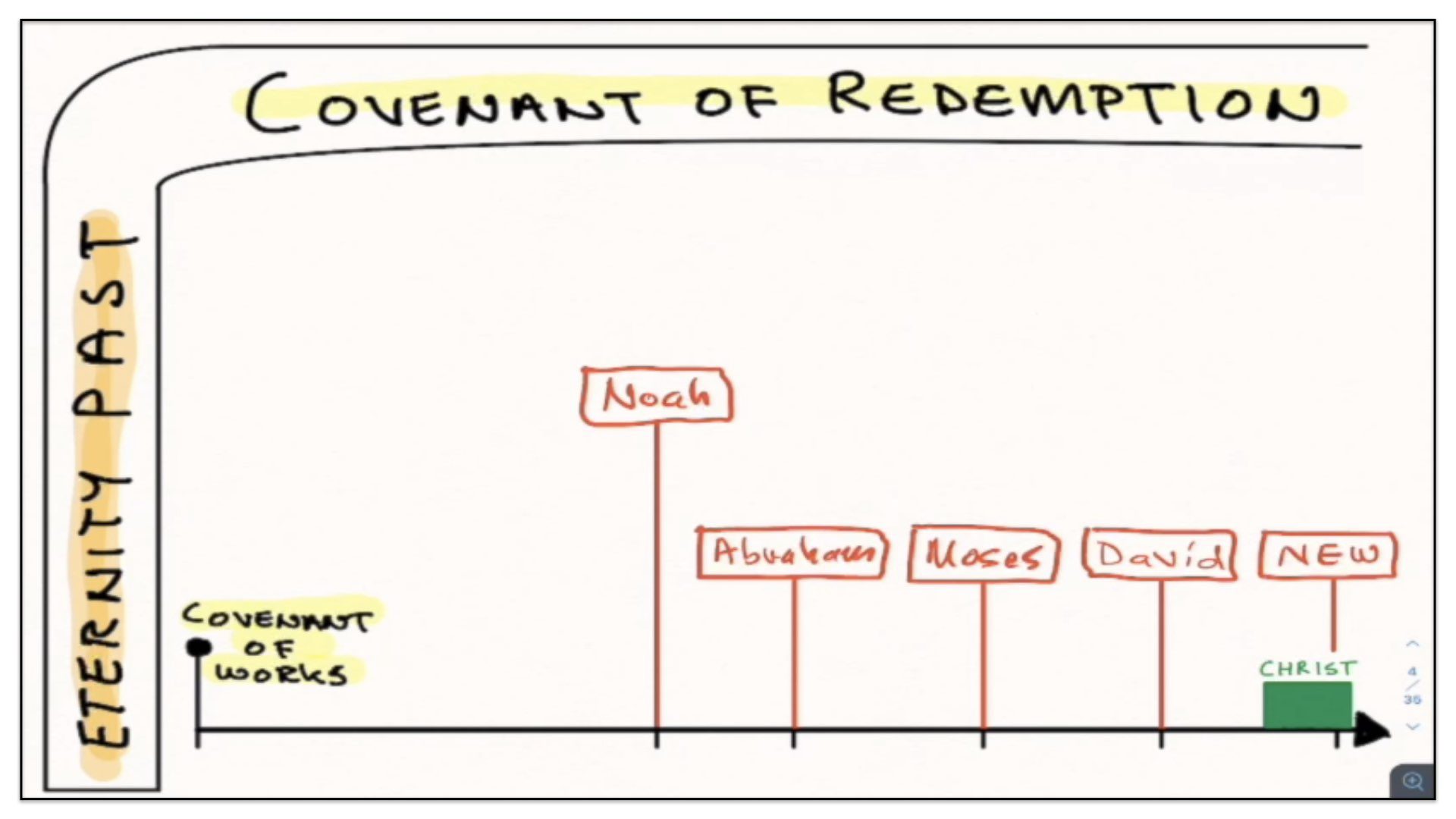
And therefore it is not realized or actualized with this label of a New Covenant. Once again, the whole framework is dismantled if a conditional Covenant of Grace does not exist.
Okay. Once again, I’ll just give you a word of encouragement. If you ever sit under the teachings of a 1689 Federalist, I hope you’ll keep in mind this framework of teaching. That’s the direction they’re coming at the scriptures and their teachings are based on this premise.
The View Of The High/Hyper Calvinists
The Label “Hyper-Calvinist” Is Not To Be Feared
Well this brings us now to consider another view of the New Covenant and that would be the view of the High-Calvinists. Hey, this is my group or my circle of believers— the High-Calvinists. Sometimes, as you know, the High-Calvinists are called Hyper-Calvinists. Now there are some who like to distinguish between the two. They say, well I’m a High-Calvinist, but I’m not a Hyper-Calvinist. Actually, historically and doctrinally, Hyper-Calvinism is one and the same with High-Calvinism and it does have a technical definition. It’s not the modern definition that people give to it, but it does have a historical and a doctrinal definition. I’ve given those definitions to you in previous studies, so I don’t need to repeat that here. It’s enough for me now to present to you a chart or a diagram of what High-Calvinists believe concerning the New Covenant, the biblical covenants as a whole.
There Are Only Two Spiritual And Perpetual Covenants—Redemption And Works
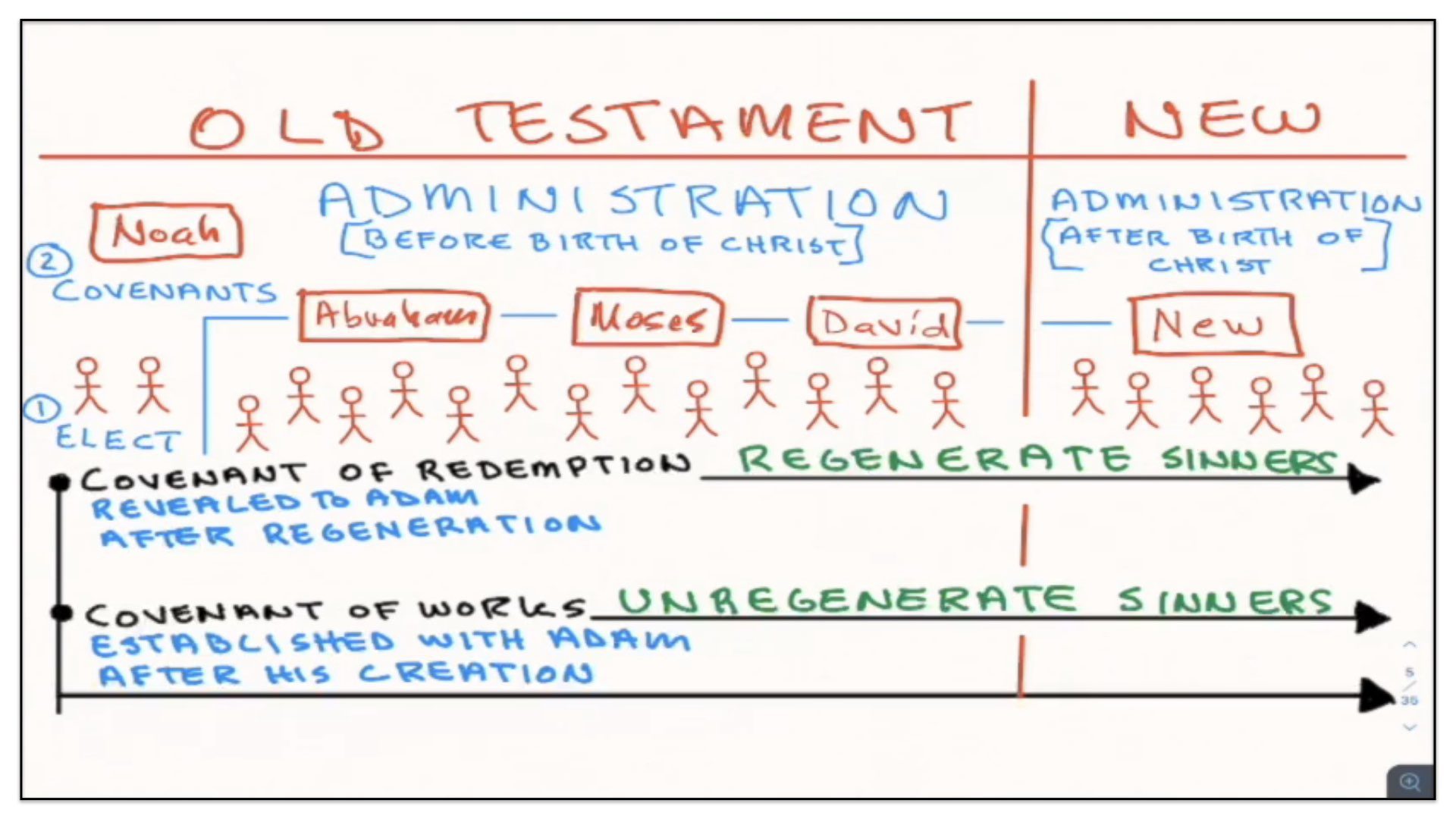
Again, don’t be overwhelmed by what you see in the chart. I’ll go through it with you.
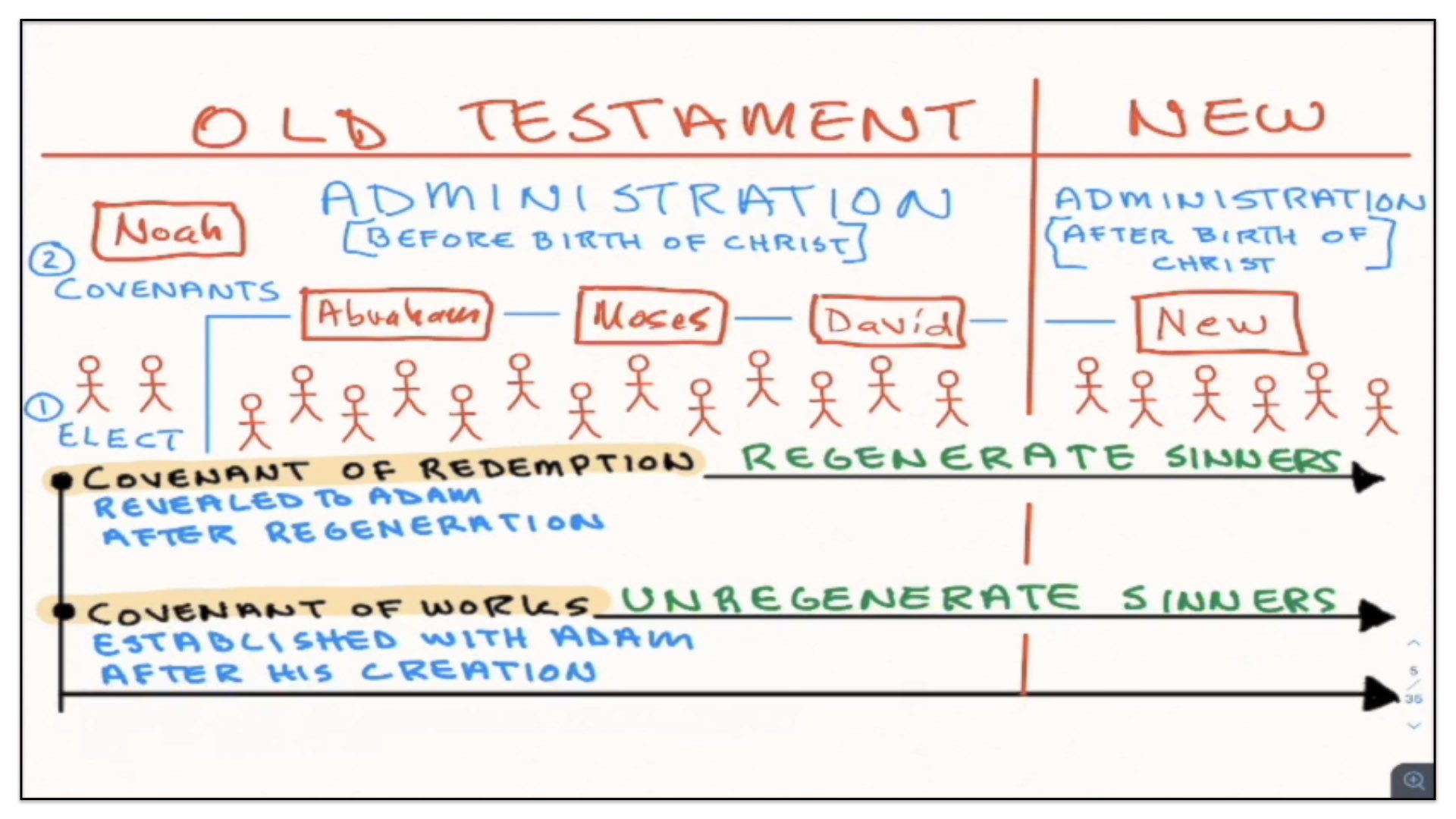
Let’s begin with the obvious thing. You’ll notice there’s only two major covenants listed on this diagram. Not three, but two. There is a Covenant of Redemption and a Covenant of Works. High-Calvinists do not believe there are three major biblical covenants. Rather, they believe there are only two. They believe there is the Covenant of Redemption which the Father, Son and Spirit have established from eternity. And then they believe that there is a Covenant of Works that God has made with Adam and through Adam the entire human race, wherein each man and woman, when they enter into this world, is accountable to God under that particular Covenant of Works. So these are the two covenants that High-Calvinists understand run throughout the course of history, from the garden of Eden to everlasting. They’ll never end, they’re perpetual.
The Covenant Of Works Was Established With Adam In Time, Whereas The Covenant Of Redemption Was Established With The TriUne Jehovah From Eternity
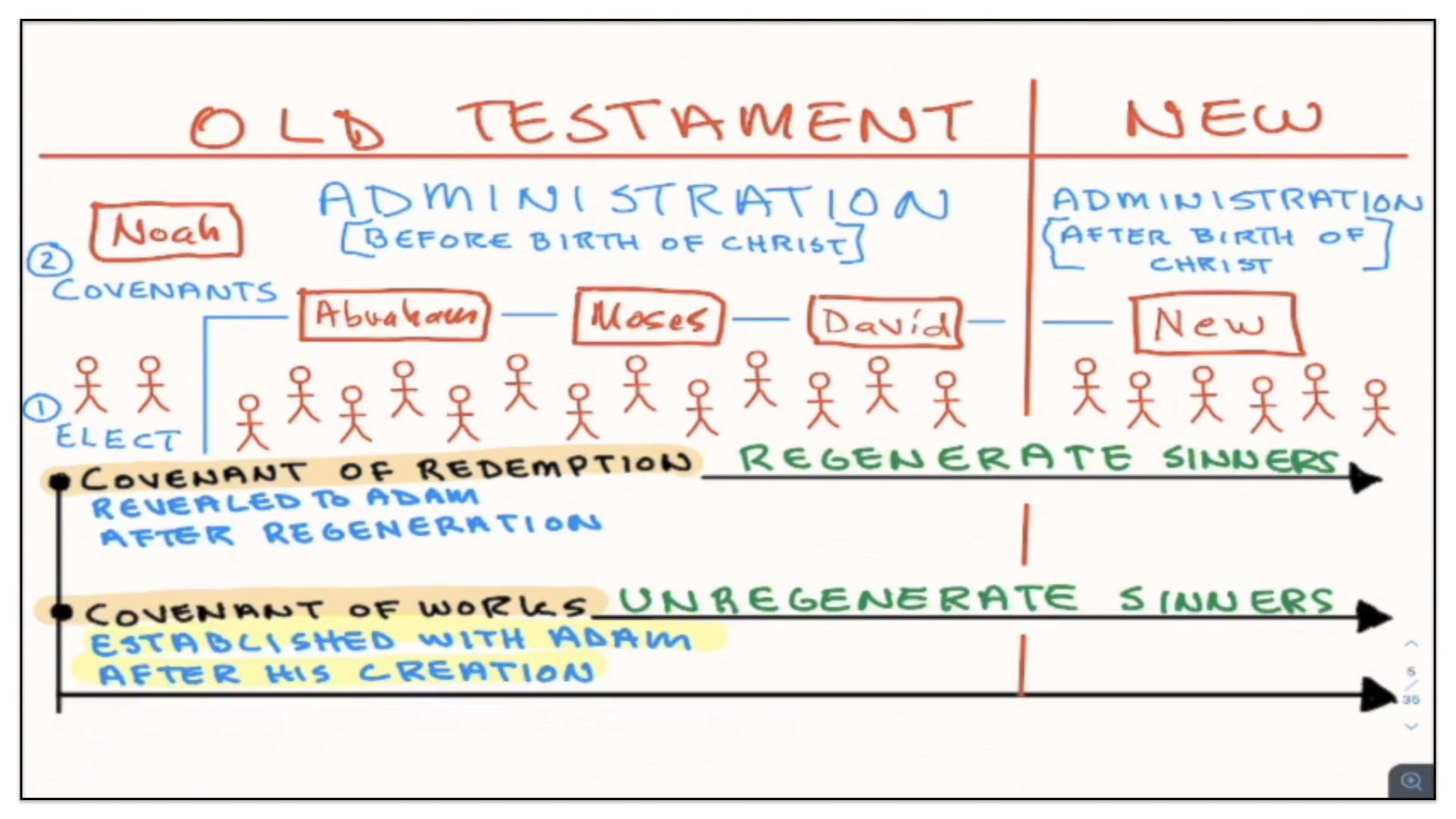
I’d like you to notice that for the Covenant of Works, I’ve included the following description. It was established by God with Adam after Adam was created, before Adam sinned.
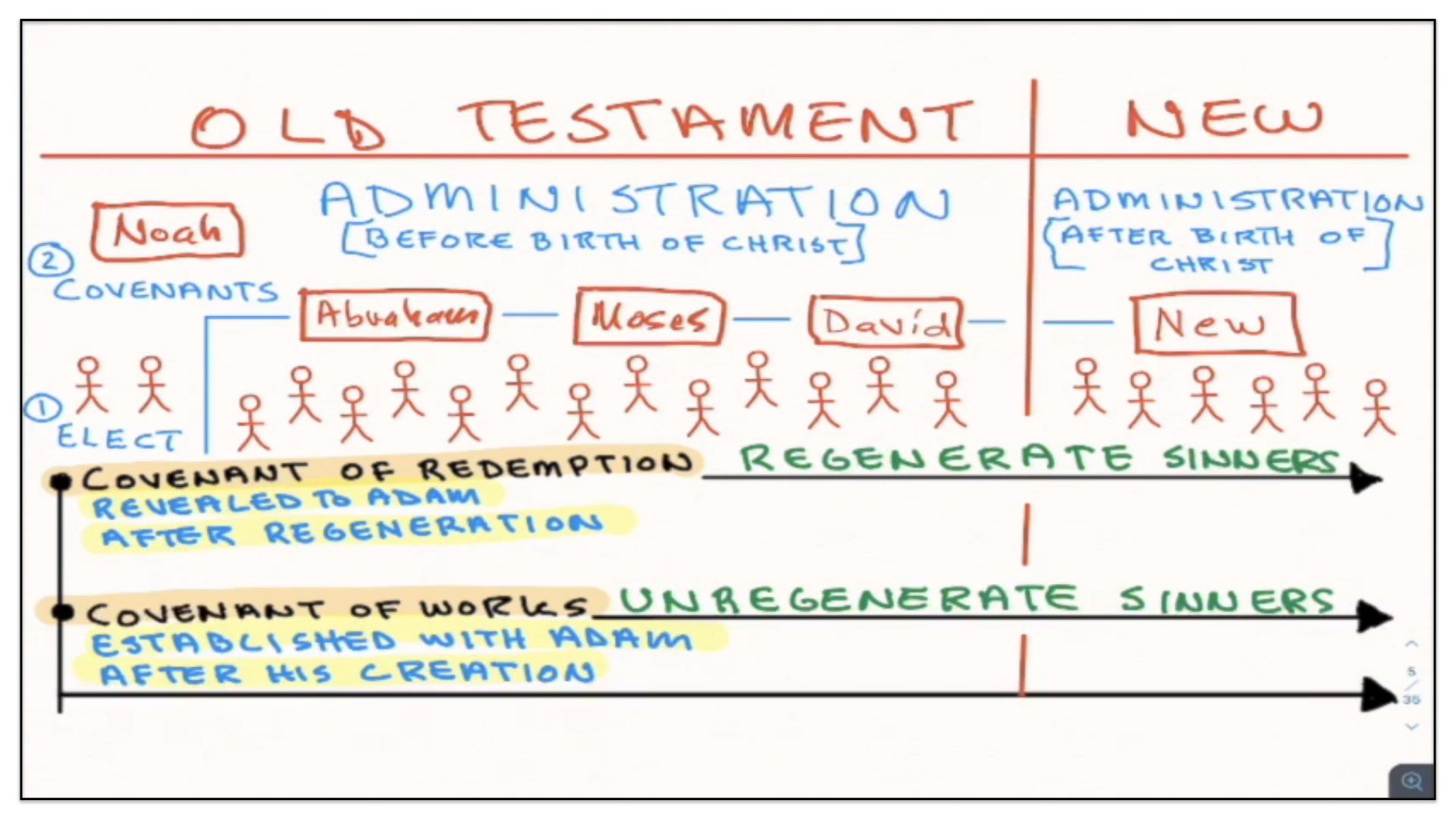
Whereas the Covenant of Redemption was established from eternity between the Father, Son and Spirit. It was never established in time. Now you see, that’s where we differ quite widely from the Presbyterians and the Reformed Baptists. They believe that there is some type of Covenant of Grace which is established in time. We don’t believe that. We believe the Covenant of Redemption, otherwise called the Covenant of Grace, we use the same label referring to the same covenant, we believe it was established by God from eternity between the Father, Son and Spirit. But in time, it was first revealed to Adam after Adam had been born again. So Adam sins, and at some point not long after he sinned, the Spirit of God regenerated his soul and as a result of that regeneration, of the new birth, Adam was brought to realize his participation under the terms and promises of the Covenant of Redemption. God never established the Covenant of Redemption with Adam, a sinner. But rather, God brought the Covenant of Redemption to pass in time in Adam’s life and it began with the experience of the new birth.
Throughout The Course Of History, The Human Race Is Under The Authority Of One Of Two Covenants—Unregenerate Sinners Are Accountable To God Under The Authority Of The Covenant Of Works; Regenerate Sinners Are Accountable To God Under The Authority Of The Covenant Of Redemption
Throughout the course of history, members of the human race are under the authority of one of two covenants.
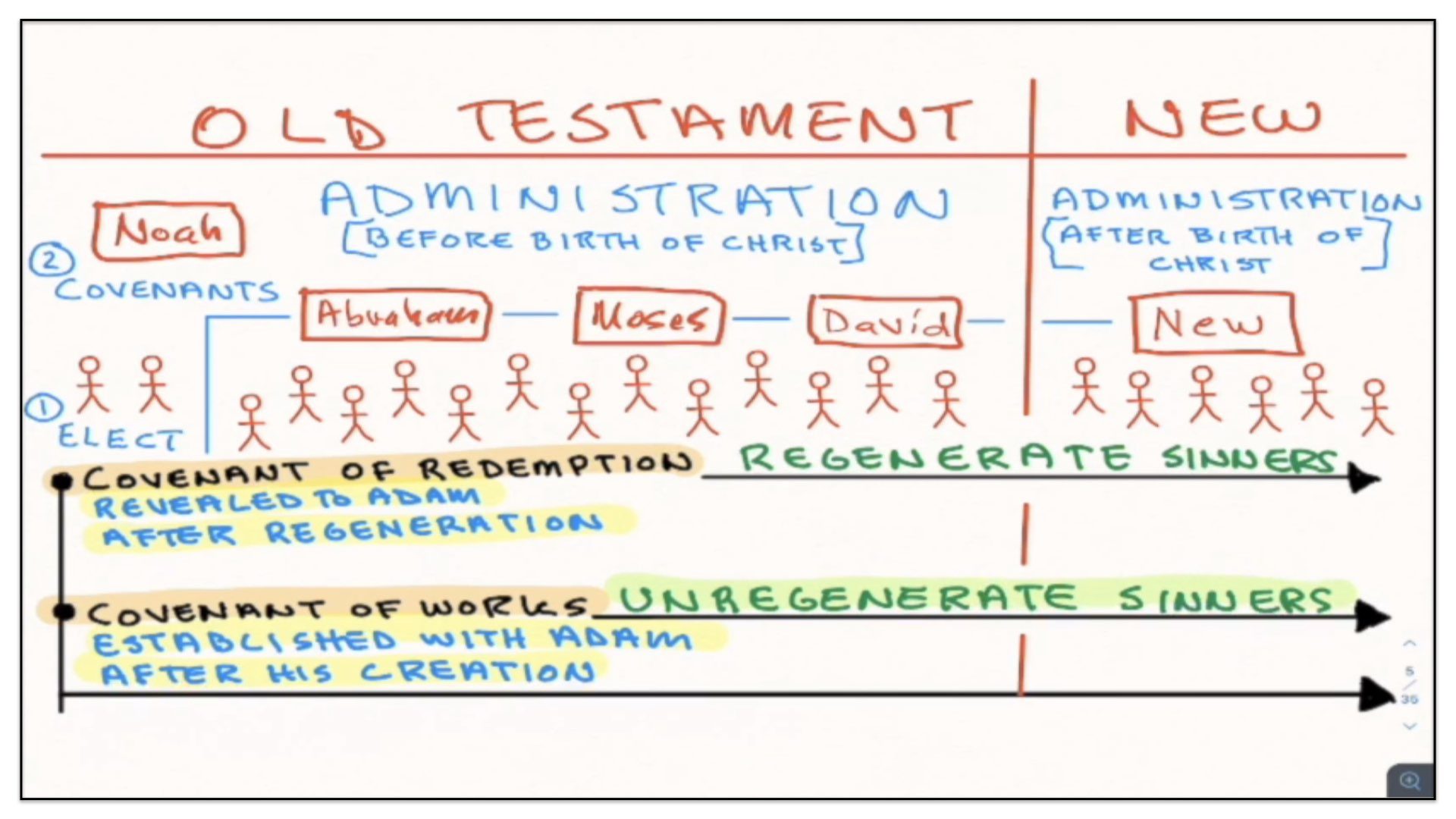
All unregenerate sinners are under the authority of the Covenant of Works.
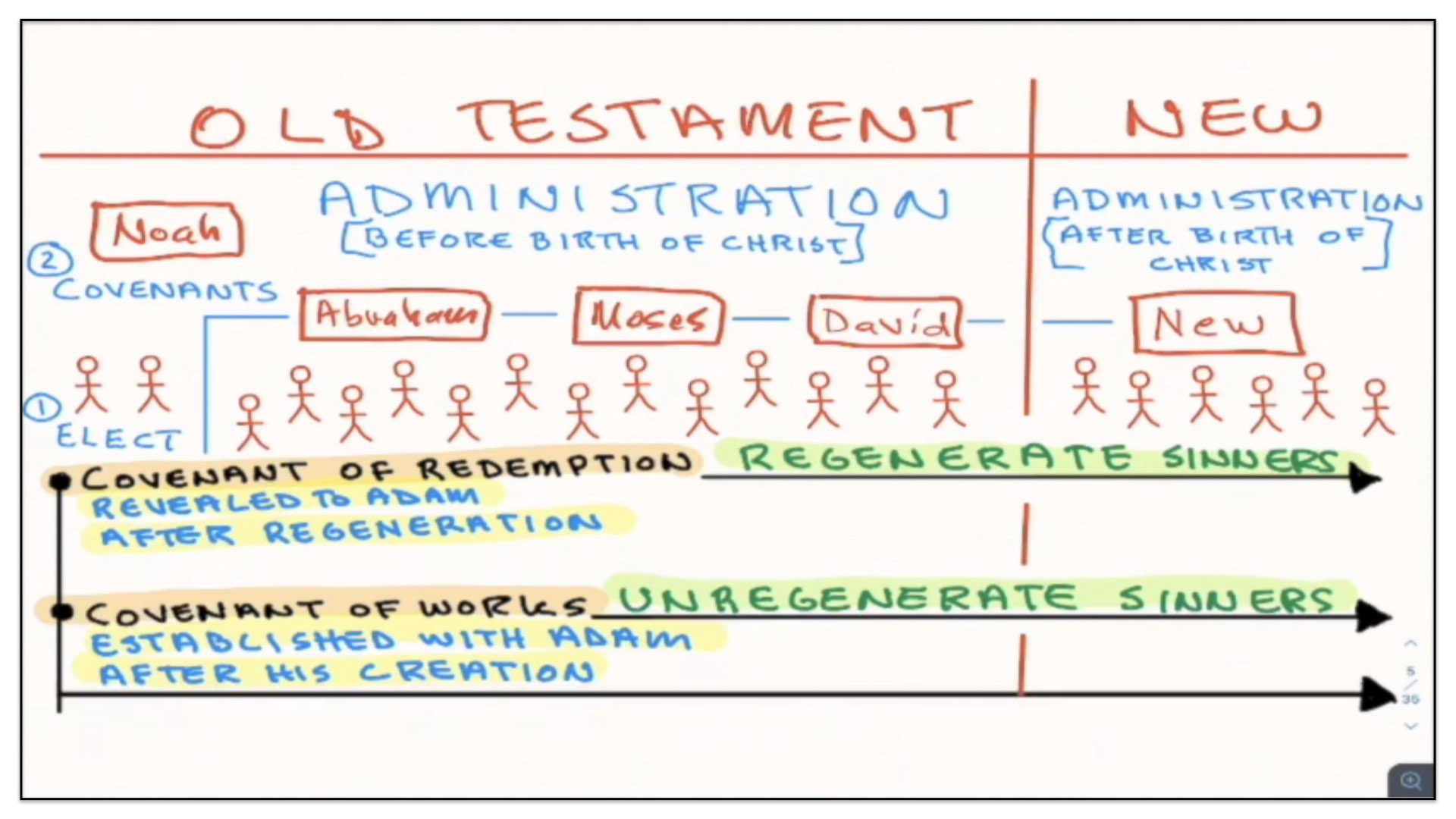
Whereas all regenerate sinners are under the authority of the Covenant of Redemption.
Covenantal Authority Is The Basis Upon Which The Pernicious Doctrines Of Duty Faith And The Free Offer Are Rejected
And you see, it’s here that really defines for us the parameters of the sinner’s duty towards God. So long as a sinner remains an unregenerate condition, he or she is duty bound to perfectly obey the law inscribed upon his or her heart. Saving faith has no part under the Covenant of Works. And therefore the unregenerate sinner is not duty bound to savingly believe on Christ. However, when the Spirit of God regenerates the soul of His elect people, it is at that point a sinner is brought to realize his or her participation in the Covenant of Redemption and is enabled to savingly believe on Christ, which then becomes his or her duty to do so. That really is the crux of the issue when we talk about the doctrines of duty faith and attached to it would be the subject of the free offer.
Okay, well in general that’s what the High-Calvinists believe concerning the two major covenants of the Bible.
The View Of John Gill As A Representative Of 18th Century Hyper-Calvinism
Now, in addition to this—I’ll just change the color here—in addition to this, how do the High-Calvinists view the other covenants of the Bible? I’m going to use as a representative view or as a baseline teaching that of John Gill. Now most if not all of you should be familiar with the name John Gill and his book, the Body of Doctrinal Divinity. In his Body of Divinity, he lays out for us quite exhaustively and clearly his view on how these two major covenants of the Bible apply to or connect with the other covenants of the scriptures. Please notice the view that Gill takes on the subject.
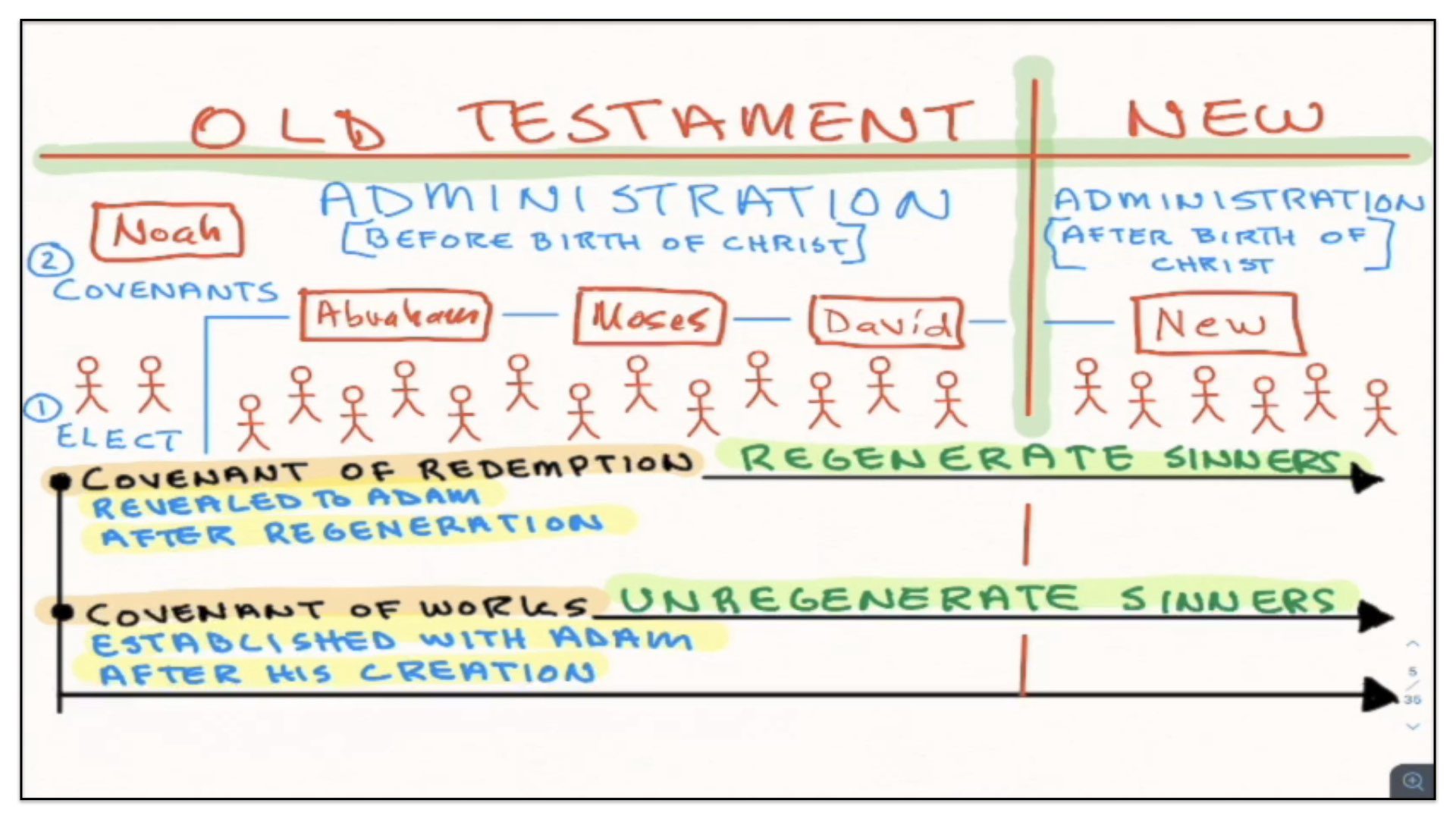
Gill believes that history can be divided into two main sections.
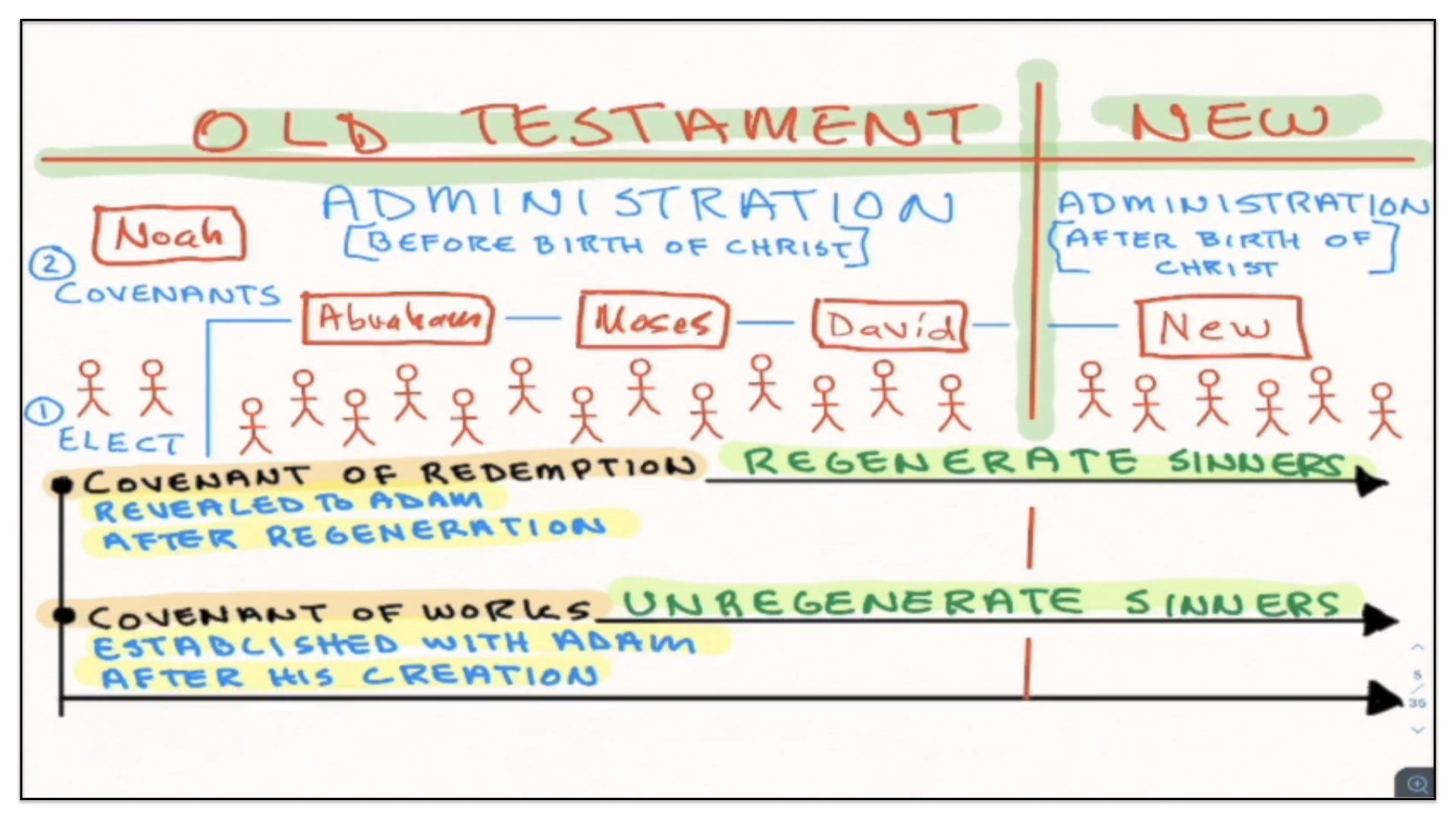
The first section is called the Old Testament. The second section is the New Testament era.
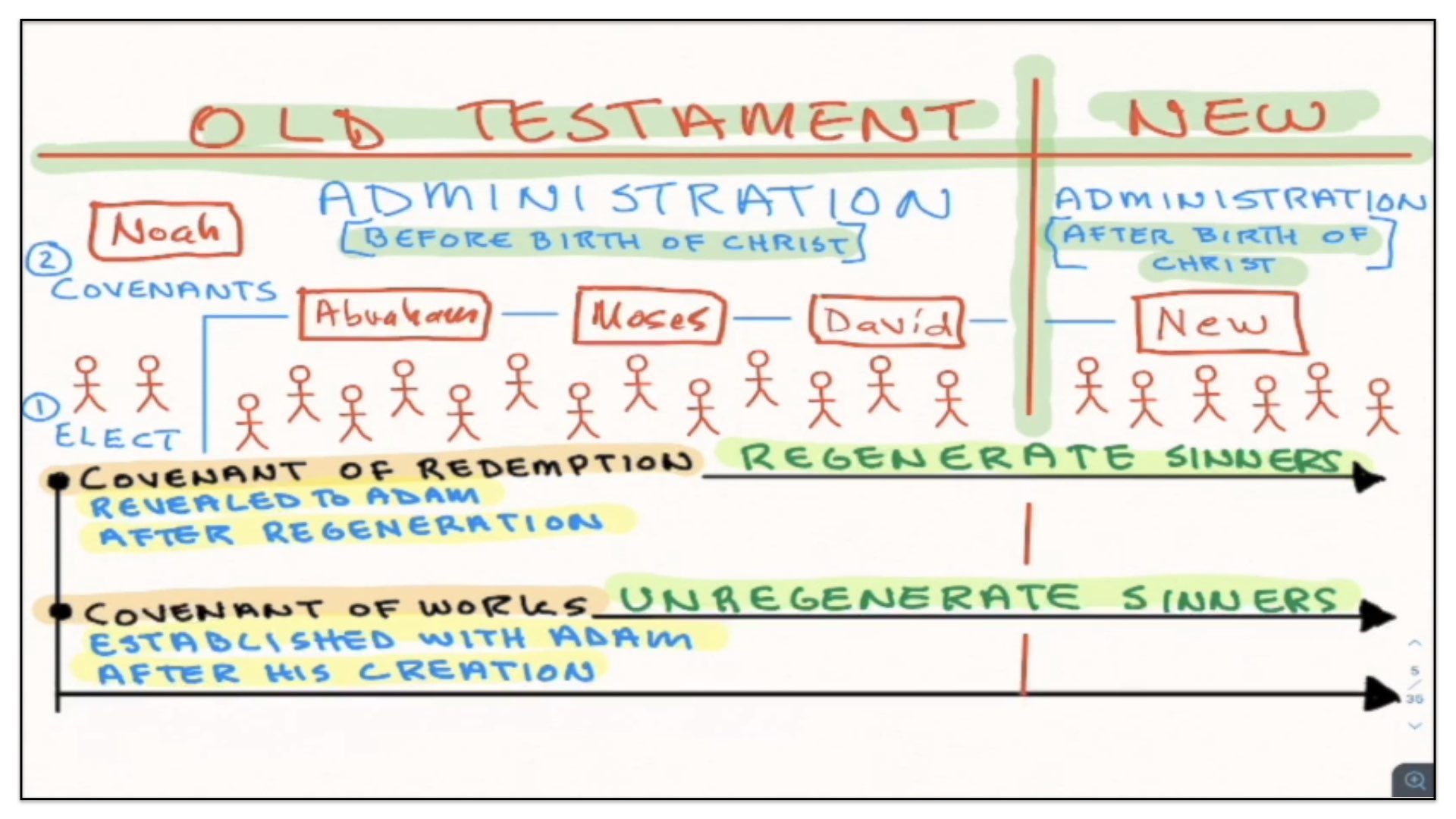
Everything during the Old Testament era is before the birth of Christ. Everything after the New Testament era is after the birth of Christ.
Now, how does God apply the Covenant of Redemption to His elect people throughout the course of history? Gill takes two views.
God Administers The Covenant Of Redemption To All His Elect People Throughout The Course Of History

First, he believes or teaches that God administers—an administration of the Covenant of Redemption—to all of His elect people throughout the course of history. In particular, throughout the course of the Old Testament era, and He does that through a new birth experience. Adam and Eve were born again; Abel and Seth were born again; Enoch and Abraham were born again; Noah, you can go through in Gill’s Body of Divinity and he lists out those major names recorded in the scriptures and he shows how God was administering the Covenant of Redemption to individuals. And it was the experience of the new birth that was God’s administration of the Covenant of Redemption to their souls.
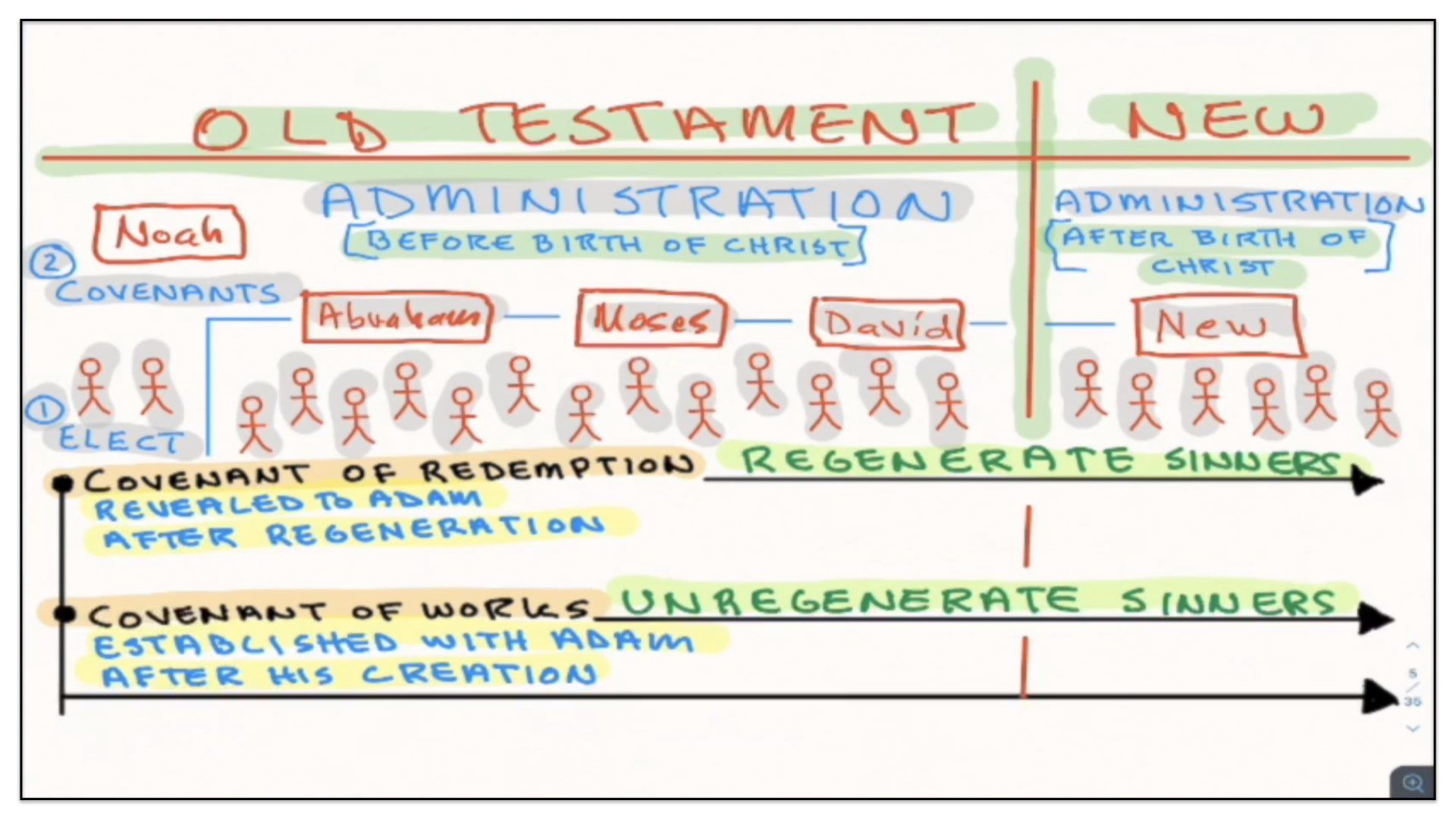
And then, when you come to the New Testament, Gill believes that all of the elect people after Christ came into the world, they have the Covenant of Redemption administered in the exact same way to them. In other words, Gill says that there is only one way of salvation for sinners throughout history, from the beginning of time to the end of the world as we know it. If a sinner is to be saved, then he or she must have the Covenant of Redemption administered to his or her soul. And that is an experience called the new birth. That’s the first way that Gill would understand the administration of the Covenant of Redemption throughout history.
God Administers The Covenant Of Redemption In The Earthly Covenants Throughout The Course Of History
But there’s a second way that Gill explains the administration of the Covenant of Redemption. Number two, he now connects the Covenant of Redemption with these other earthly covenants—the covenants God made with Abraham, with Moses, with David and he links together with these other covenants, the New Covenant. And what Gill teaches is this, he says that the covenant God made with with Abraham, David, Moses, this is the New Covenant, they are administrations, a form of the Covenant of Redemption in time.
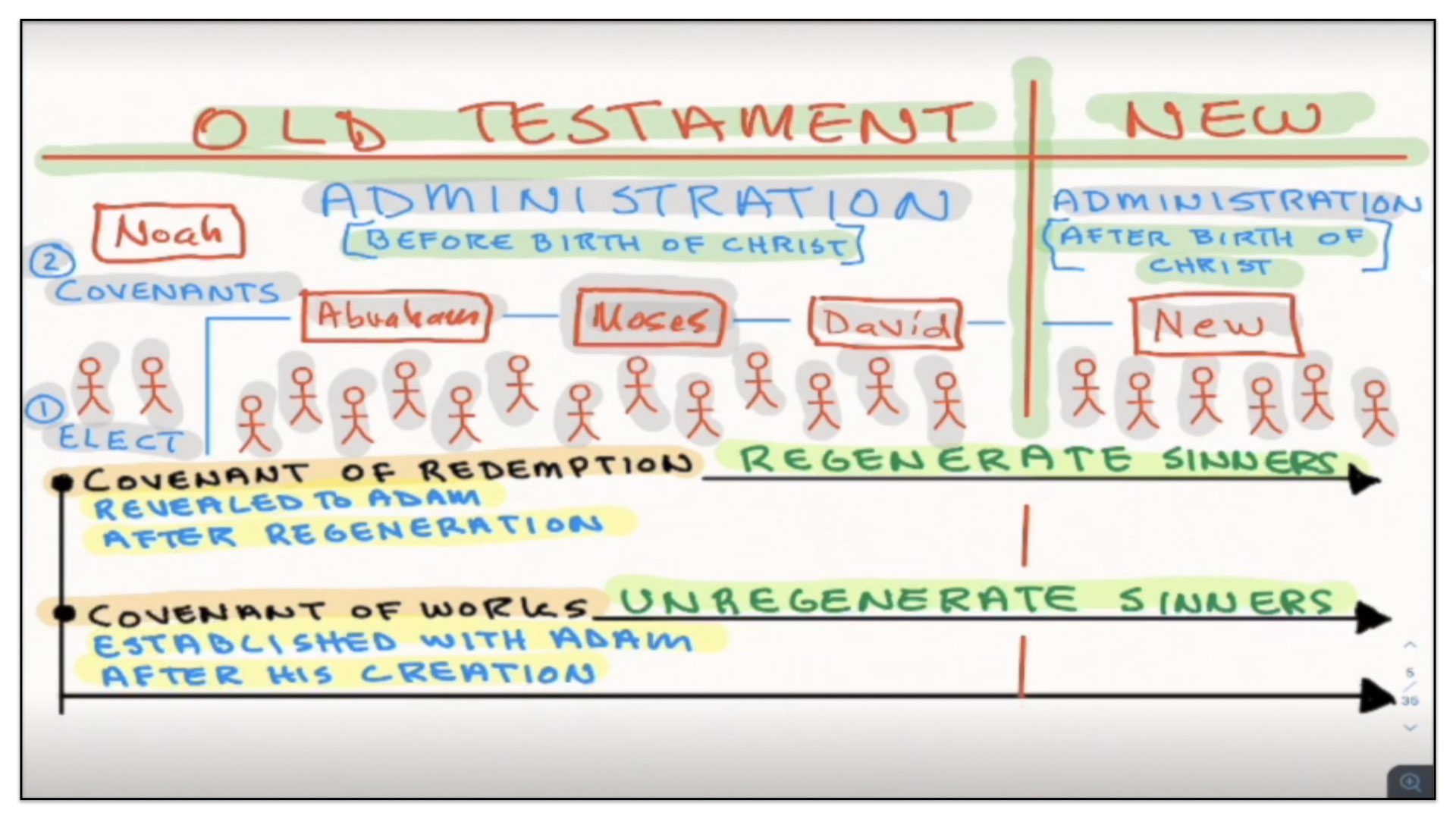
And Gill focuses his efforts on the covenant God made with Moses, the Mosaic Covenant.
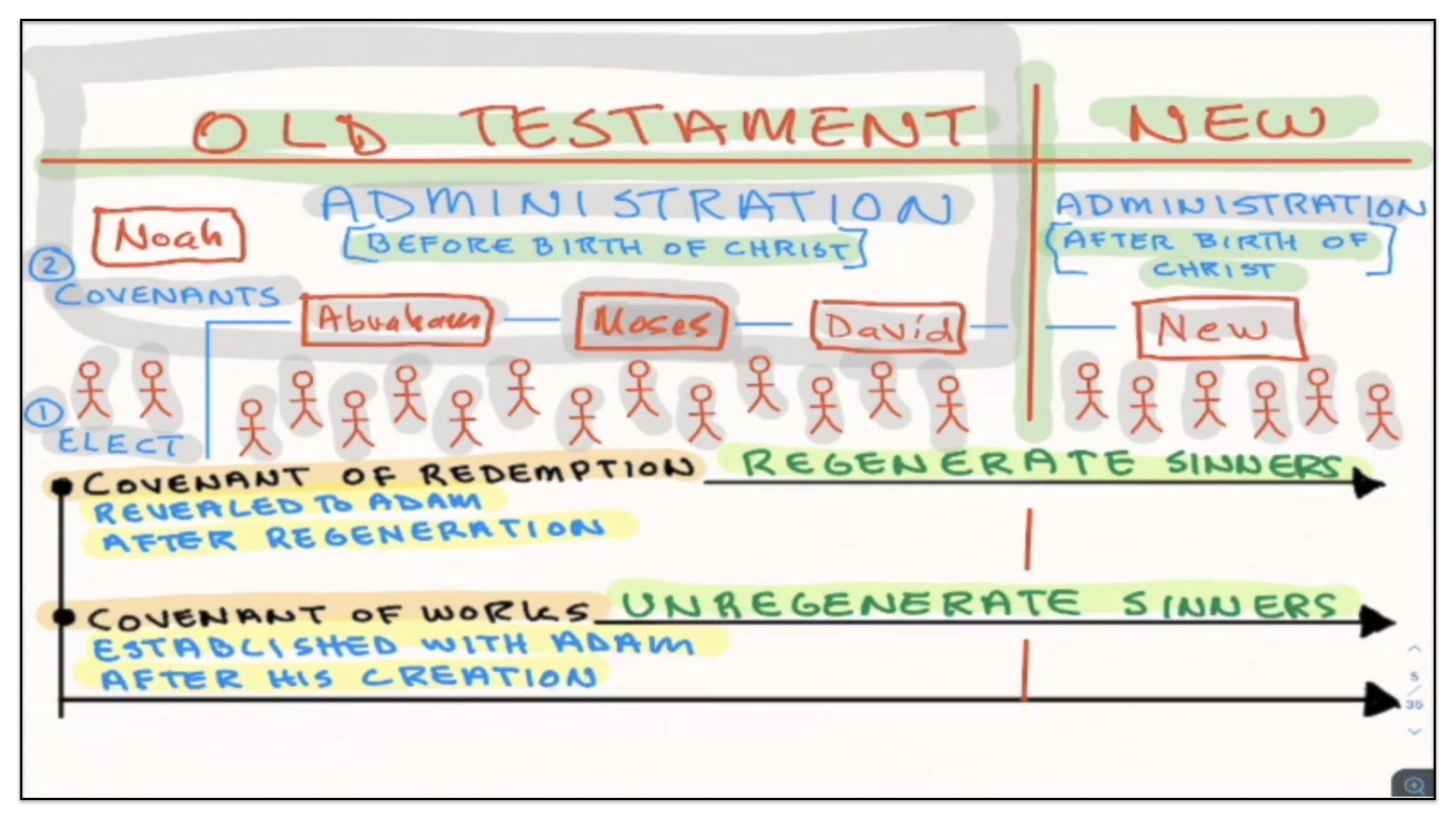
And Gill then takes the Old Testament, the Old Covenant,
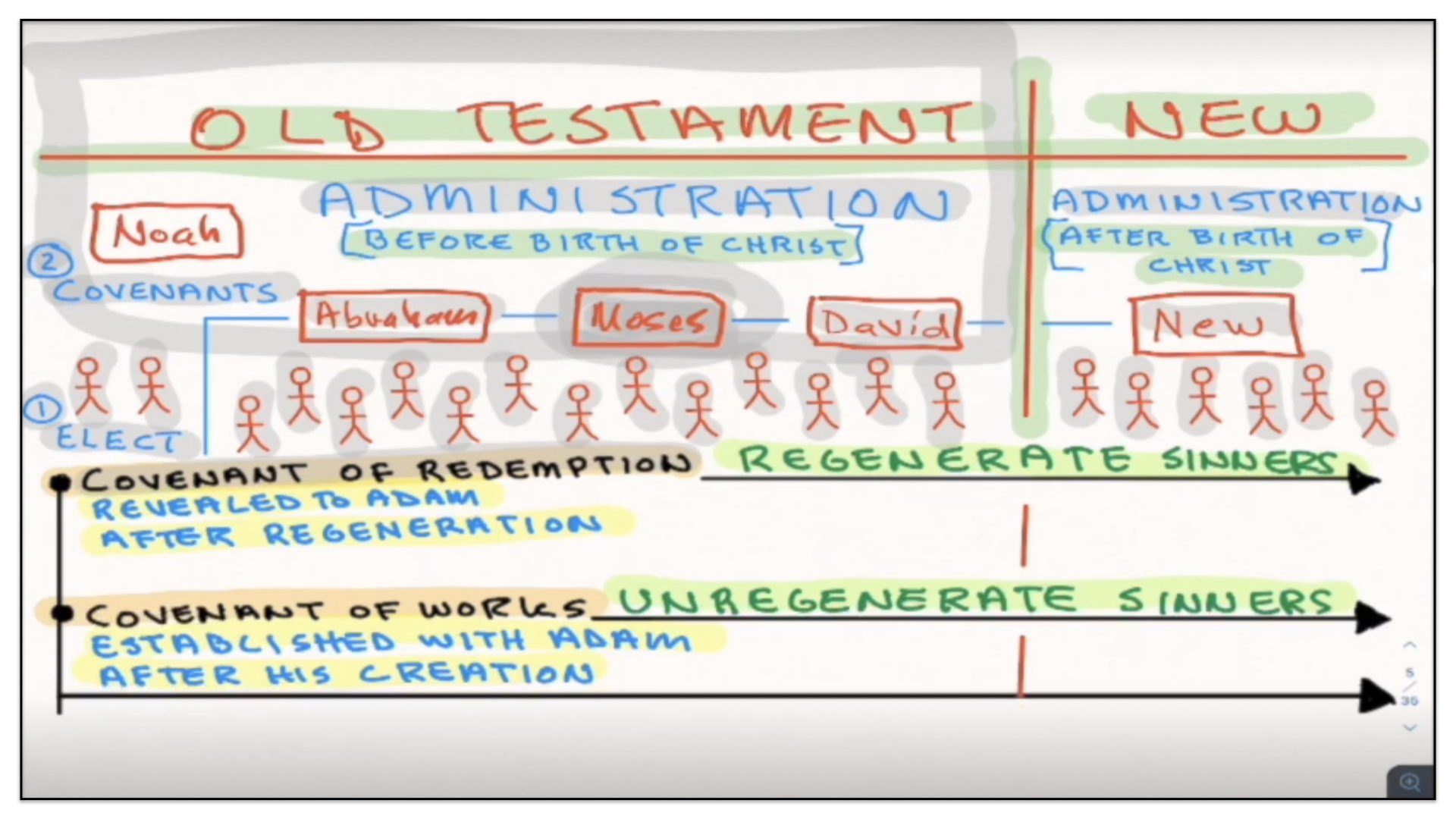
to be an administration of the Covenant of Redemption before Christ came into the world, under the Mosaic Covenant.
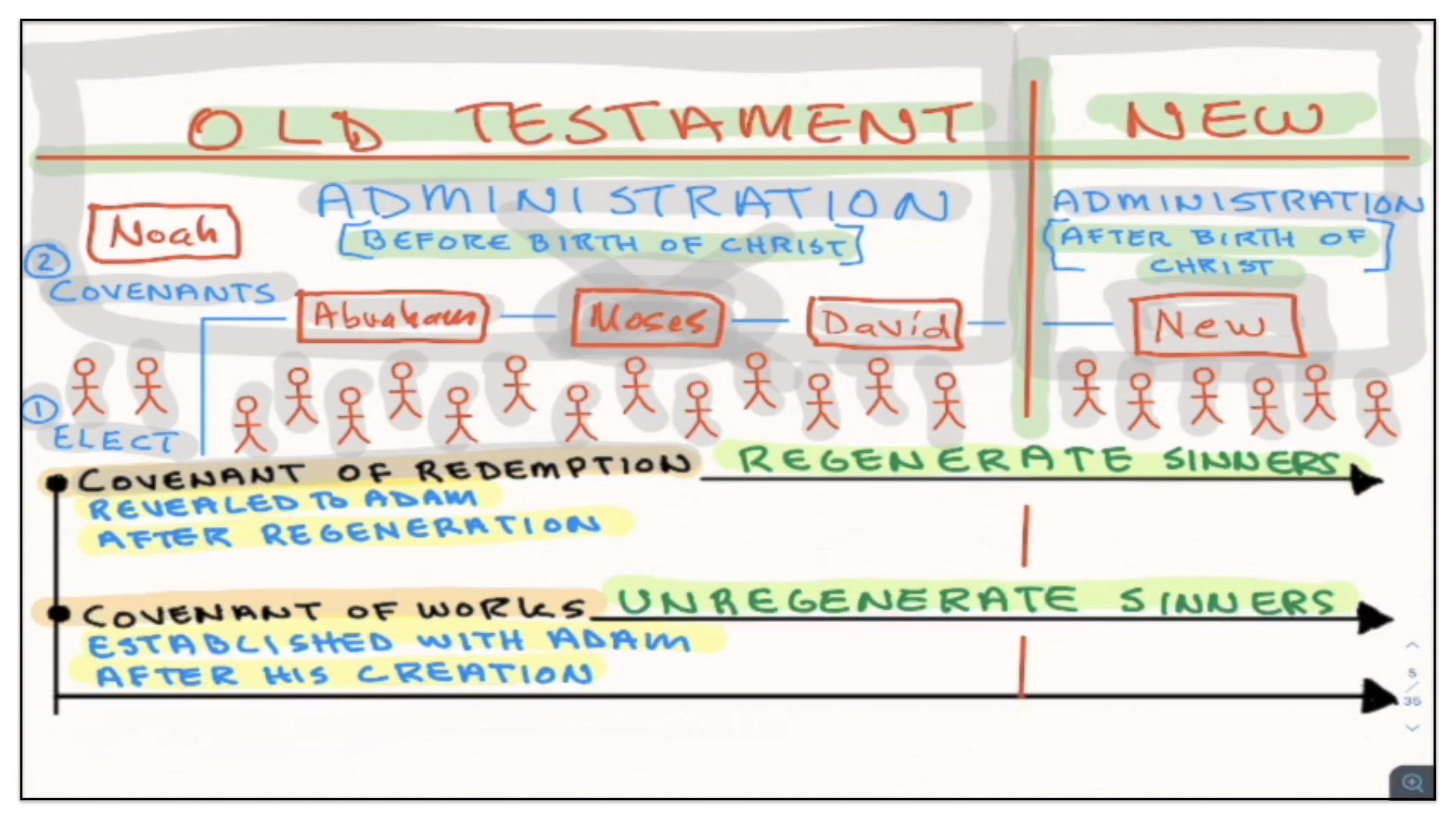
And then after Christ came into the world, the Mosaic Covenant ended and a New Covenant was brought in; a new administration of the Covenant of Redemption was brought in. And so Gill will link the Mosaic Covenant, the earthly temporary covenant, with the Covenant of Redemption. And I have found that to be a view taken by a great many High-Calvinists. They subscribe to a similar teaching on this subject.
My Response To The View Of The High/Hyper Calvinists
Okay. Well, all I’m doing is giving to you the viewpoint of the High-Calvinists and I’m trying to be as objective as I can on the issue. Let me now share with you my understanding of this.
I Agree With Gill That There Are Two Major Covenants Of The Bible
I agree with Gill on the two major covenants of the Bible. There is a Covenant of Works and a Covenant of Redemption and the Covenant of Redemption is one and the same with the Covenant of Grace. It’s not a covenant God made makes with sinners in time. It’s rather a covenant God has made with Himself from eternity. And that covenant is brought to pass throughout the course of history. And so that’s my first…I embrace all of that. And I believe members of the human race are under the authority of one or the other of these two covenants—the regenerate and the unregenerate.
I Agree With Gill That God Has Been Administering The Covenant Of Redemption To Individuals Throughout The Course Of History
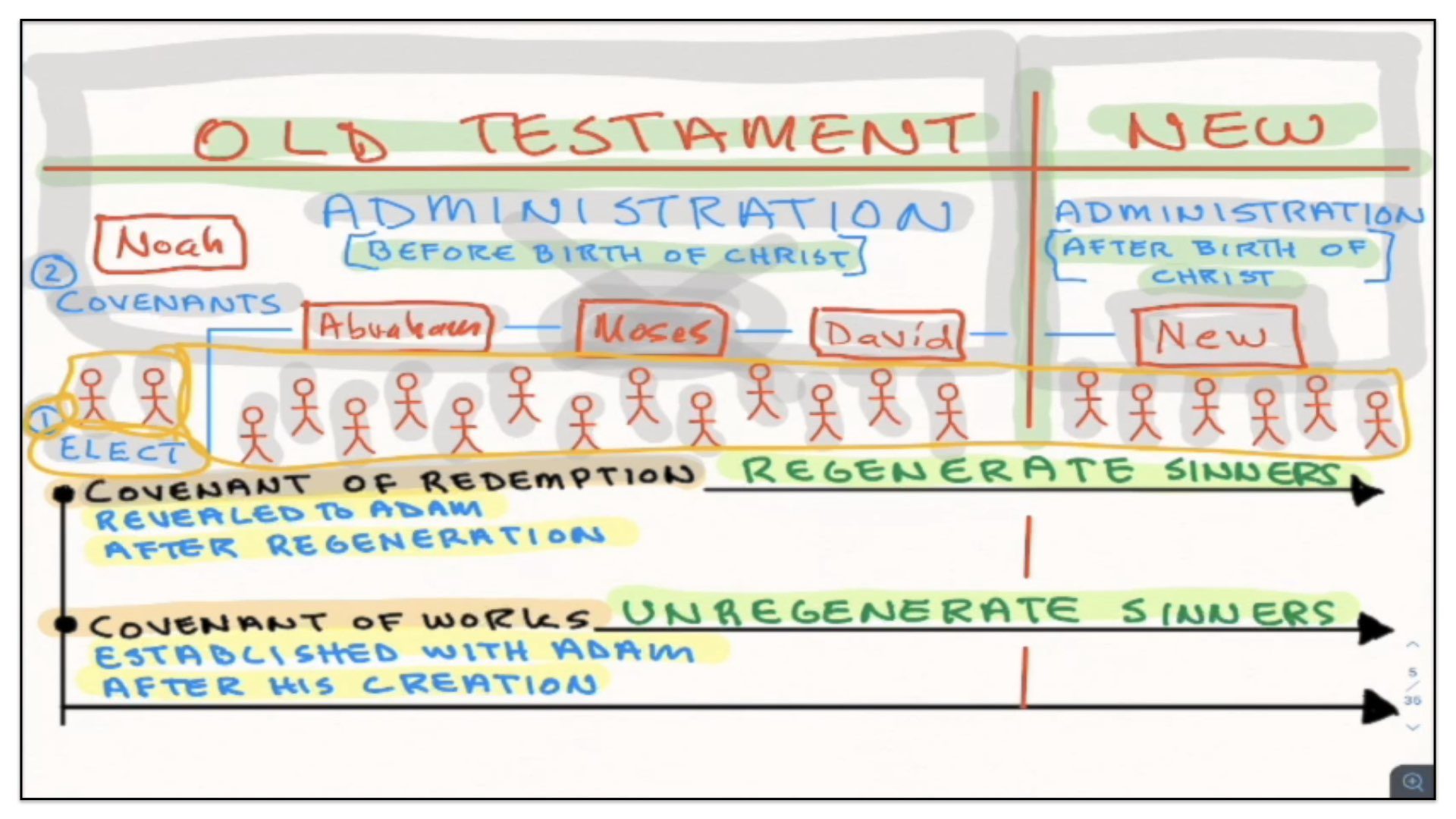
Okay. So all in agreement there. The next point of agreement. I believe that God throughout the course of history has been administering the Covenant of Redemption to individuals. Choose a different color pen here, orange. So I agree with the first point that Gill makes on this issue. All of God’s elect throughout the course of history have this Covenant of Redemption administered to them directly, individually, when they experience the new birth.
I Disagree With Gill That God Administers The Covenant Of Grace In The Earthly Covenants Throughout The Course Of History
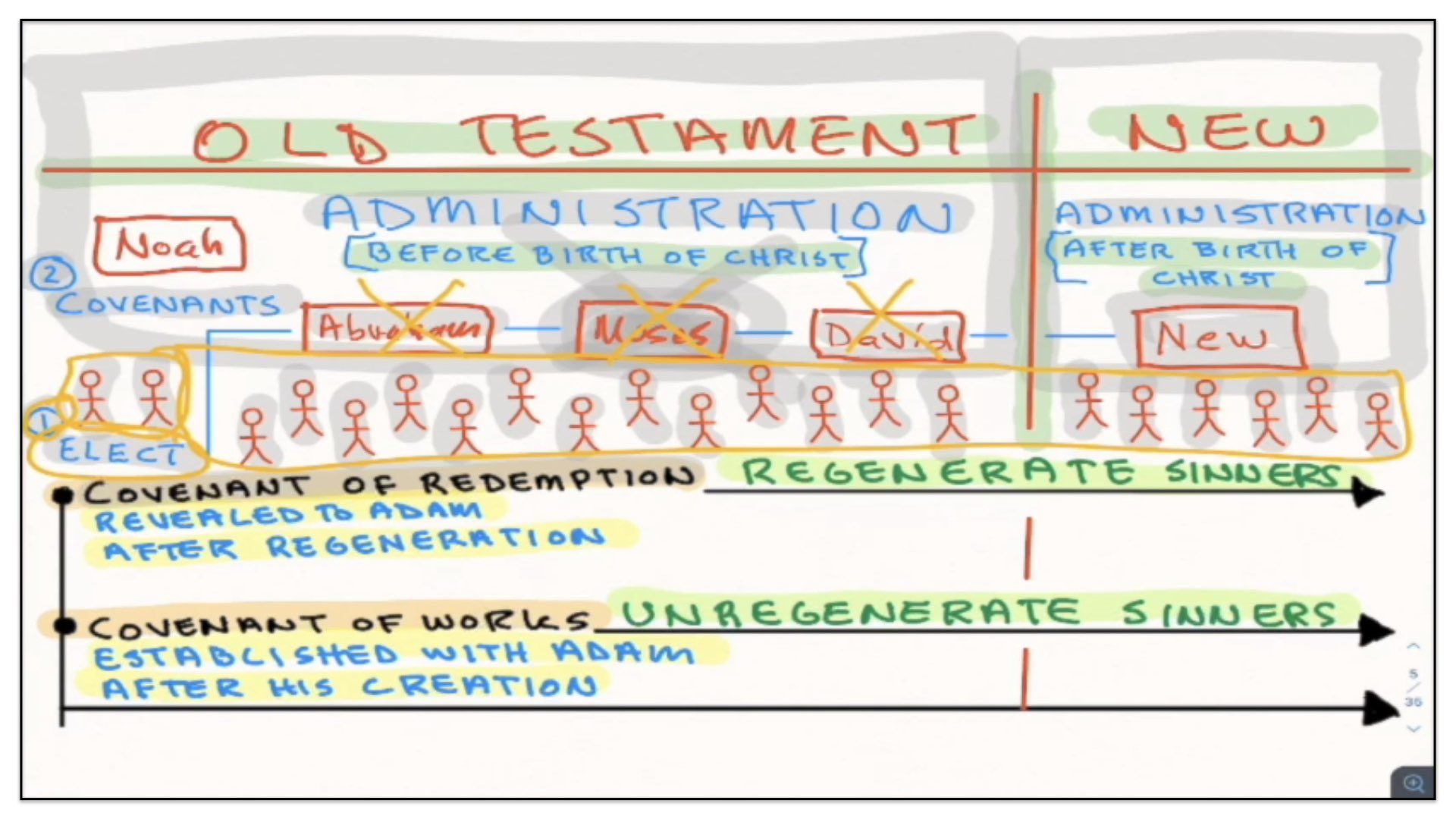
However, this is where I part ways with Gill. I do not believe that these earthly covenants are administrations of the Covenant of Redemption. I therefore disagree with the second way in which Gill defines the Covenant of Redemption—it’s out workings in the Old and New Testament scriptures. I view the Abrahamic, the Mosaic and the Davidic covenants to be purely earthly temporary covenants. However, within these covenants there certainly are promises. Now that’s like the 1689 Federalists. They believe that these earthly covenants promise a conditional Covenant of Grace. But listen to me carefully, I agree with the 1689 Federalists that these earthly covenants promise something, but they don’t promise a conditional Covenant of Grace.
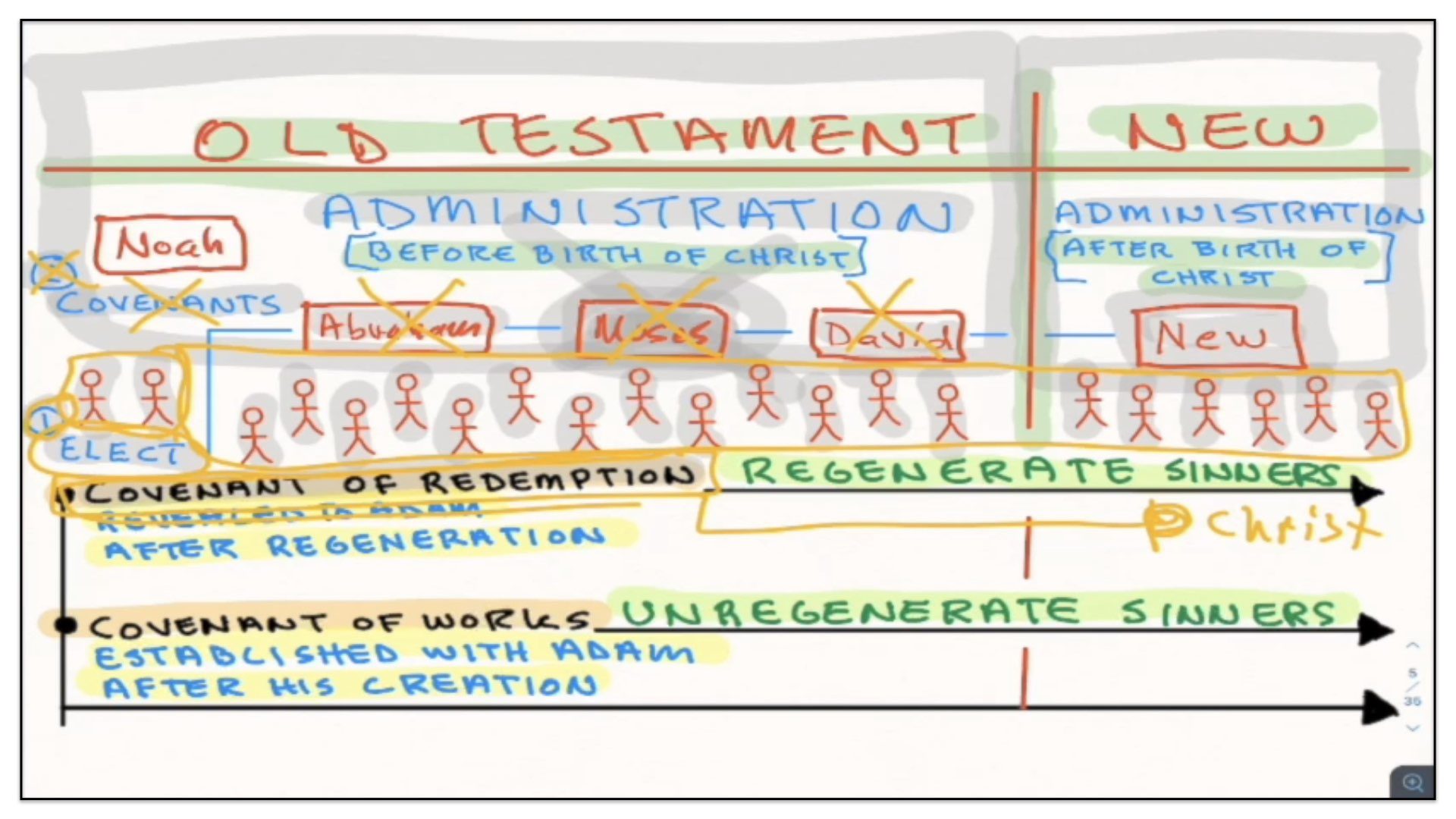
Rather, they promise the administration of the Covenant of Redemption. Particularly, the second branch of the Covenant of Redemption, which is the work of Christ at Calvary. And it’s the Covenant of Redemption that’s penetrating time. When the fullness of time was come, God sent forth His Son. That’s the Covenant of Redemption penetrating time, God sending forth His Son in time, thereby accomplishing this Covenant of Redemption that was established from eternity. And that’s what’s being promised to Abraham and to Moses under those covenants and to David. That’s true. So there’s promises of the Covenant of Redemption within those earthly covenants. And in addition to the promises there’s also pictures of the Covenant of Redemption. Whether it be circumcision under the Covenant of Abraham and Moses, circumcision being a picture of the new birth. Or the passover being the picture of Christ’s sacrifice for His people. The different animal sacrifices, beginning in the garden of Eden with Adam and Eve and running throughout the course of Old Testament history; all of that are pictures or illustrations or parables of the Covenant of Redemption. On those points, I fully agree and Gill touches on that in some depth in his Body of Divinity and I agree with him on those points. They’re called shadows. There’s many types—typology. There’s pictures, parables, illustrations of the Covenant of Redemption in it’s various branches.
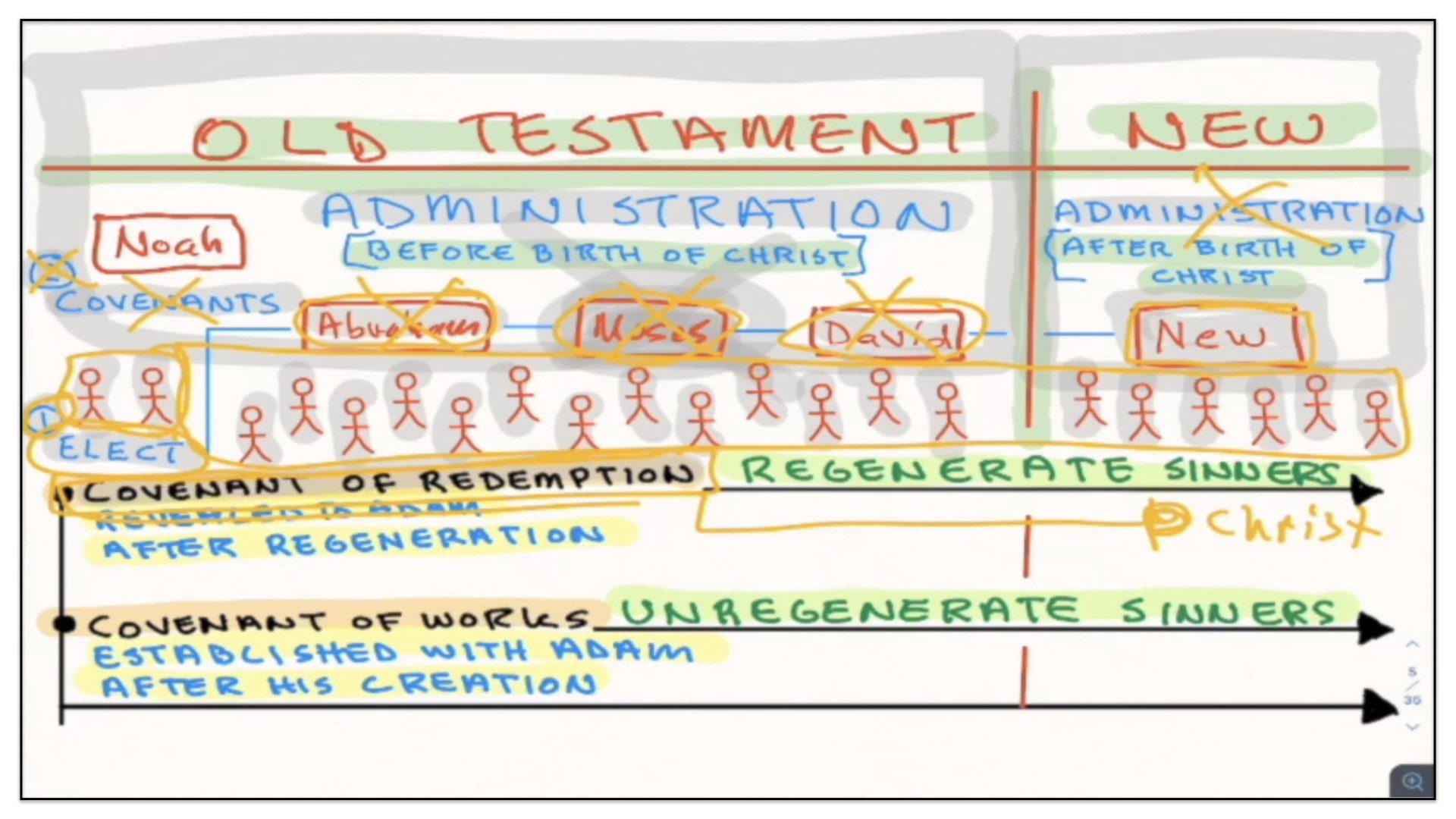
The New Covenant I do not believe is an administration of the Covenant of Redemption. It’s not an administration. The New Covenant is an explanation. That’s what my whole teaching was for you last week. It’s an explanation to the Jewish people as a nation of the Covenant of Redemption within the context in the Mosaic economy and its laws. The New Covenant is not an administration of the Covenant of Redemption. It’s just an explanation of the Covenant of Redemption. And that’s a very big difference of understanding, my dear friends. It really does change the way we interpret a lot of passages in the Old and New Testaments. If we adjust our views on this point, shifting away from an administration to an explanation when it comes to the use of this terminology of a New Covenant. I mean I’ll give you the challenge—you may not have ever considered it before in this light. So I would challenge you, why not read through the Old and New Testament scriptures keeping in mind this point of view. Consider it. See whether there is a legitimate point to be made that the New Covenant is not an administration of the Covenant of Redemption, it’s just an explanation of it. I think you’re going to find as I have found, it brings a lot of clarity to many texts, to scriptures which have been quite convoluted or blurred, because I believe there’s been a misunderstanding on these issues. Well, in general that’s my understanding of this as a High-Calvinist.
My Understanding Of The New Covenant Explained Within The Context Of The Framework Of Sovereign Grace
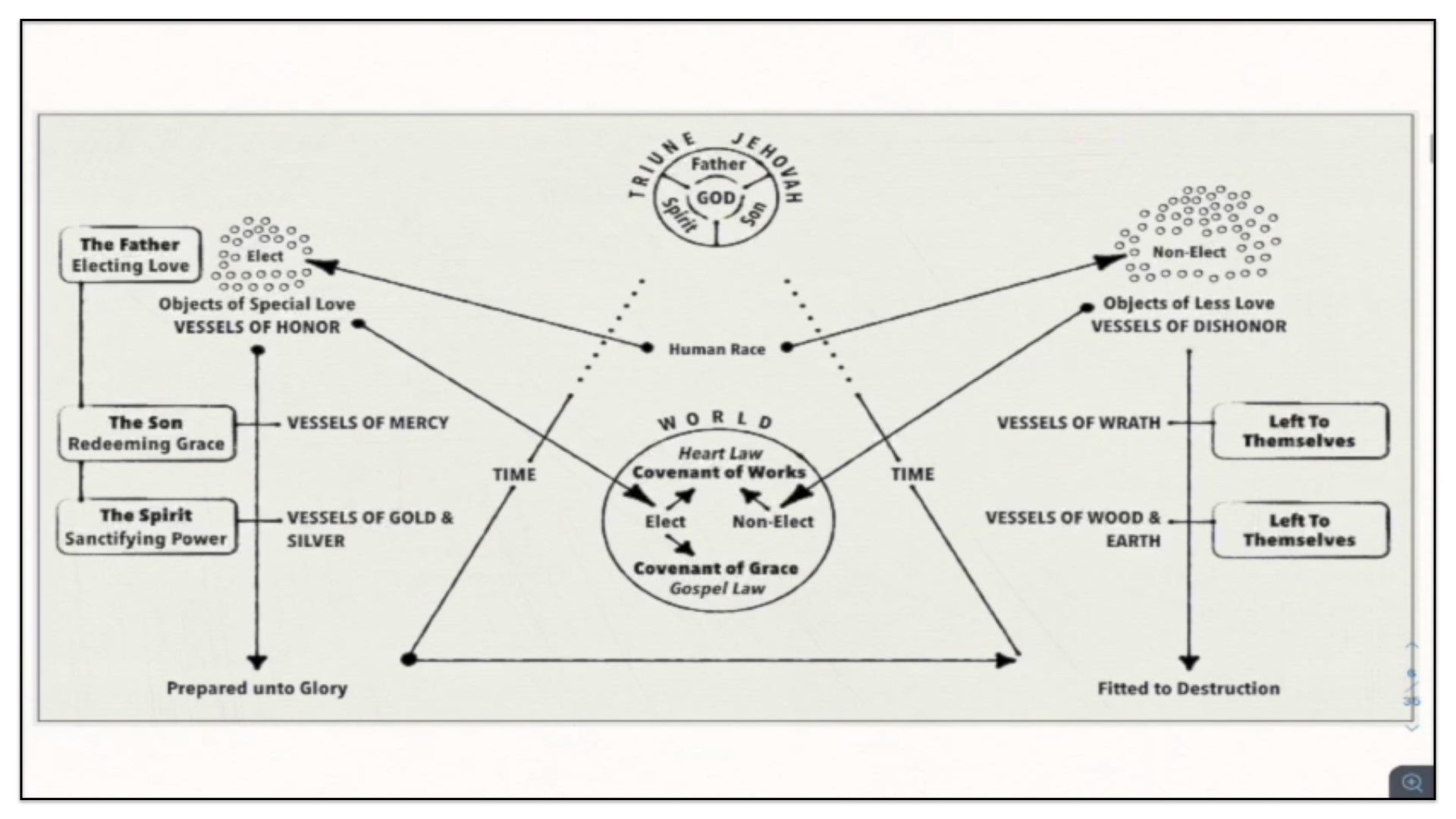
Now, I’d like to take for the last part of our teachings, I’d like to take you away from this diagram and bring you to the Framework of Sovereign Grace, because it’s that Framework which really epitomizes the way I understand Covenant Theology. And I think it’s important to keep this framework in mind. I’m going to review for you very quickly what we find in this framework. And then I’m going to add to this framework the arrangement of the biblical covenants, so you see how it all pieces together.
The Eternal Decree Of The TriUne Jehovah
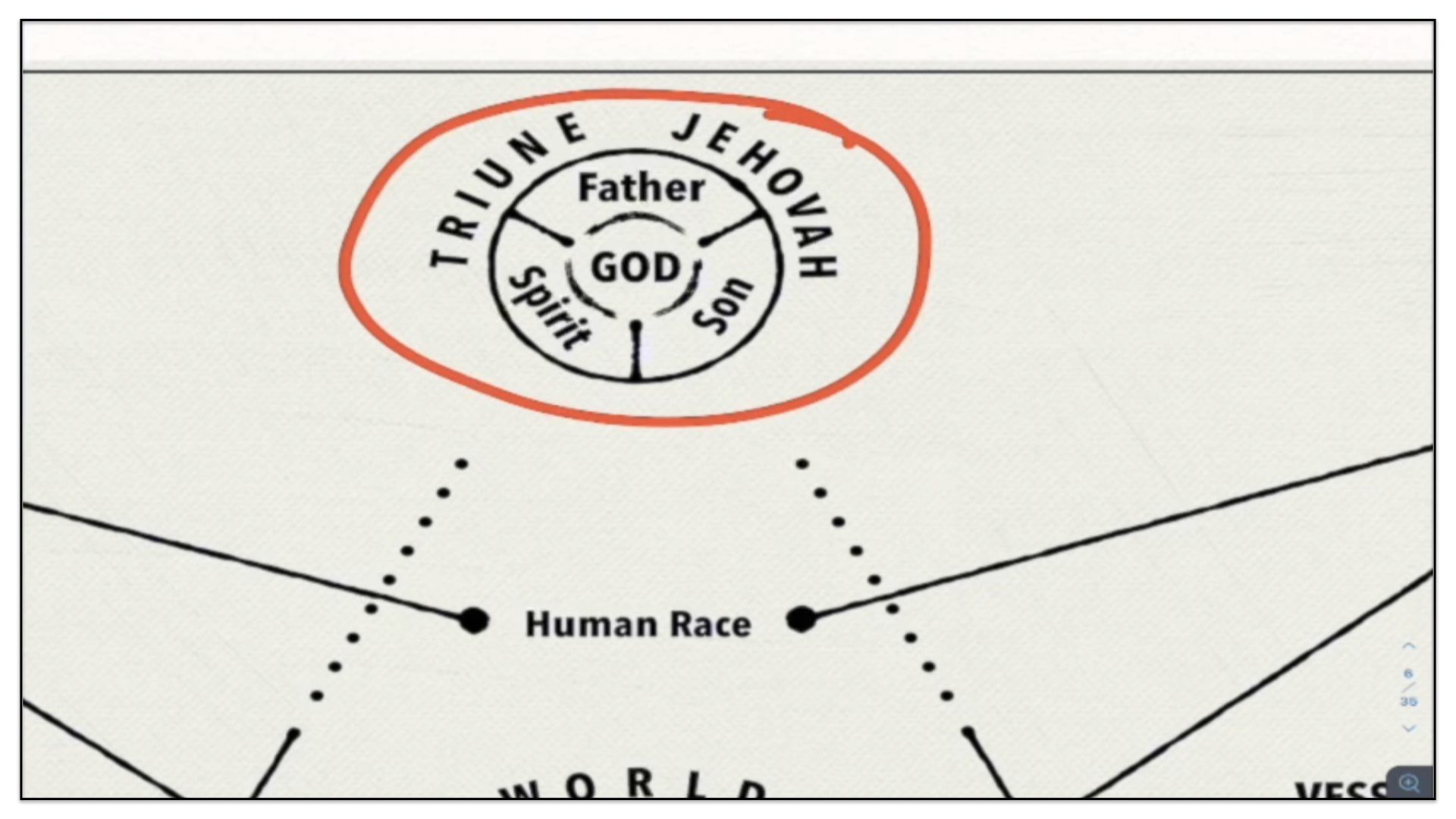
So it all begins with the Triune Jehovah, Who before the world began, from eternity, drew up a blueprint for everything He would do. And this whole framework is a blueprint. This framework is not an order of events in which God brought everything the past, but rather, it’s the logical order within His blueprint, before God brings it to pass.
The Electing Love Of God The Father

So this blueprint begins with the Triune Jehovah, and the first thing He envisioned was the entire human race, viewing them without sin.
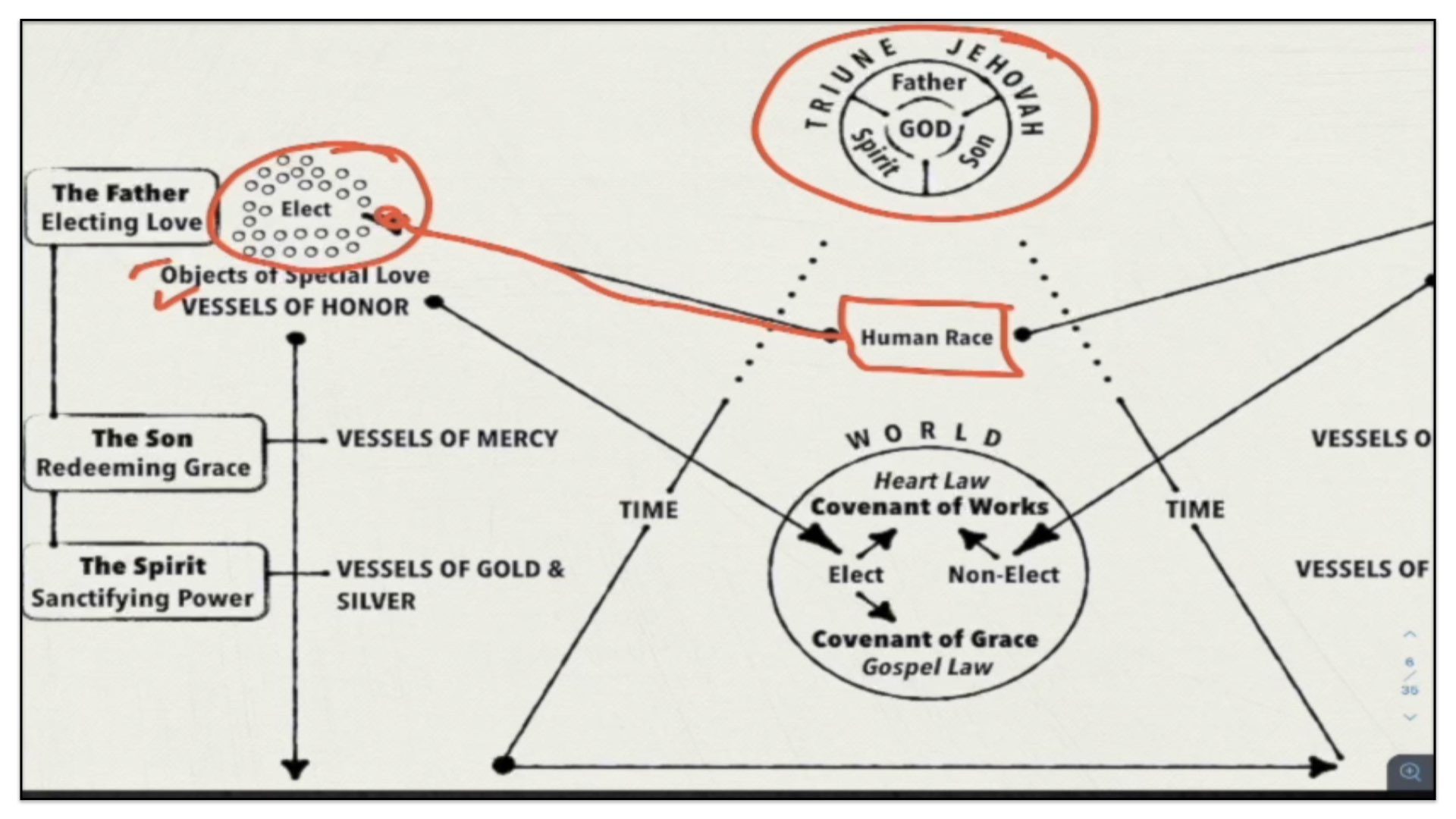
Out from which He set a people apart unto Himself called in scripture the elect. They are special objects of His love, the vessels of honor. As God is the Potter, so He makes these persons vessels unto honor.
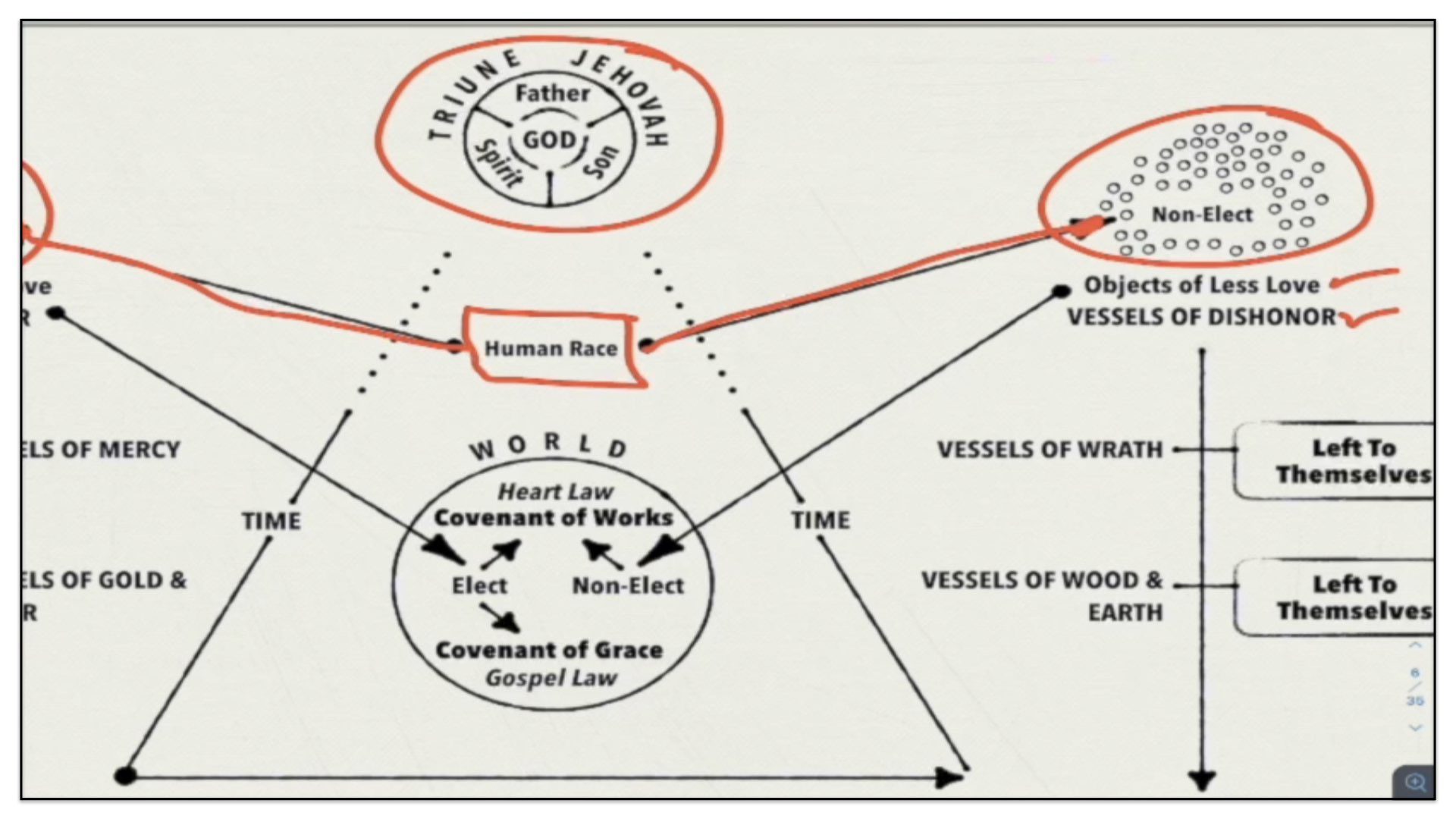
For the remainder of the human race He sets them aside as objects of less love and they are made vessels unto dishonor. They’re not called non-elect in scripture, but by implication they are non-elect. They are called, however, reprobate in scripture.
The Creation Of The World And The Time Continuum

Now, after making this choice, it pleased the Father to determine how He would bring the elect and non-elect into the world. It would be in a framework of time, a time continuum, and in a world. Both the elect and the non-elect would be brought into the world.
The Covenant Of Works
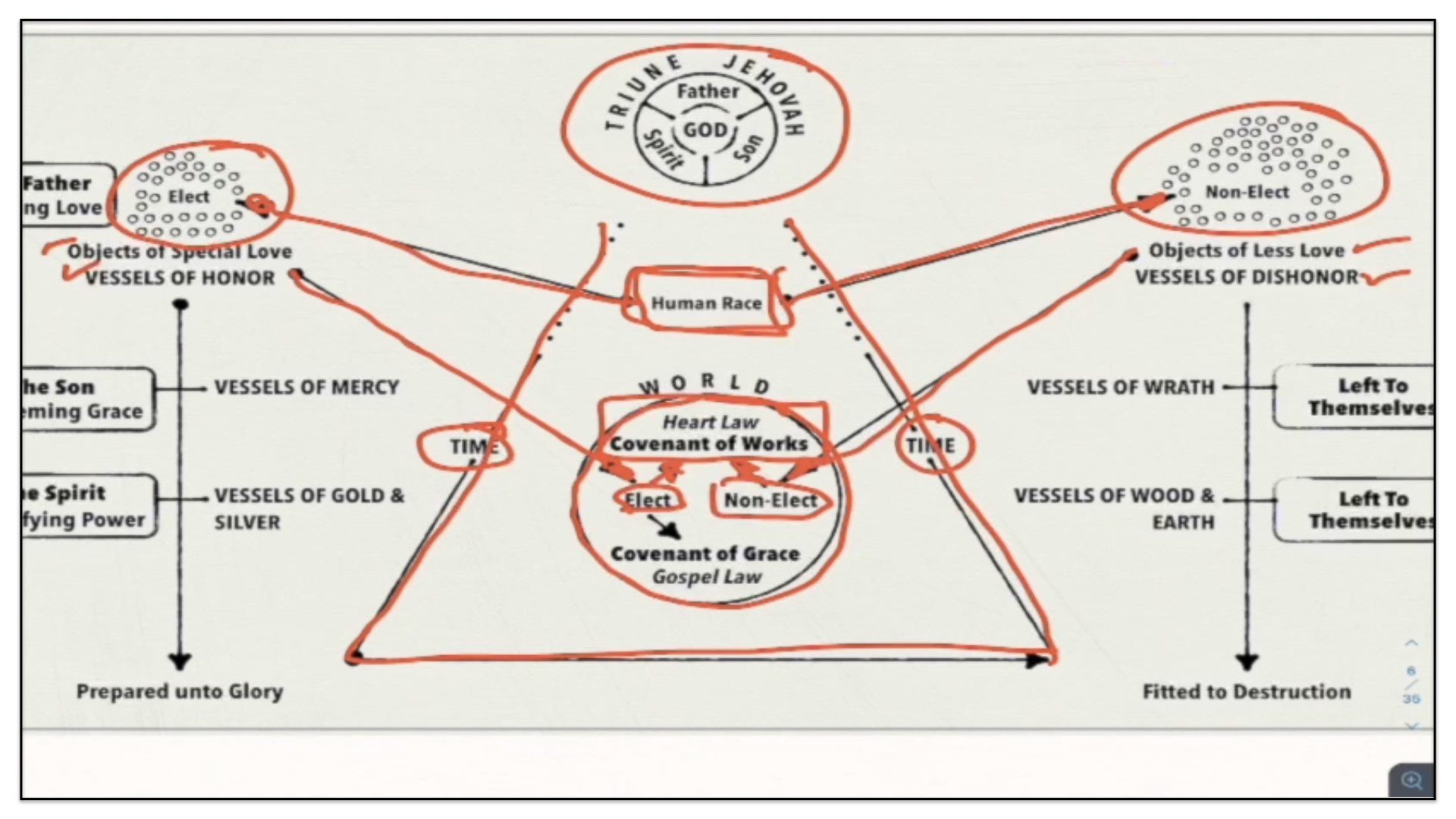
And God chose to establish with Adam, the first man, a Covenant of Works, which gives to the human race the authority upon which to have a relationship with God, a law inscribed upon Adam’s heart requiring of him perfect obedience to that law—to love God supremely; to love his neighbor neighbor as himself. Adam transgresses that law, bringing himself into sin and misery and death. And not only himself, but the entire human race, for God appointed Adam to serve as the covenant head for the entire human race.
The Reprobation Of The Non-Elect

Now, at this point God the Father determines to leave the non-elect in their sins, and in so doing, He makes them vessels of wrath and vessels of wood and earth, and He fits them to destruction, or hell. No redeeming grace is procured or provided or promised to them.
The Salvation Of The Elect
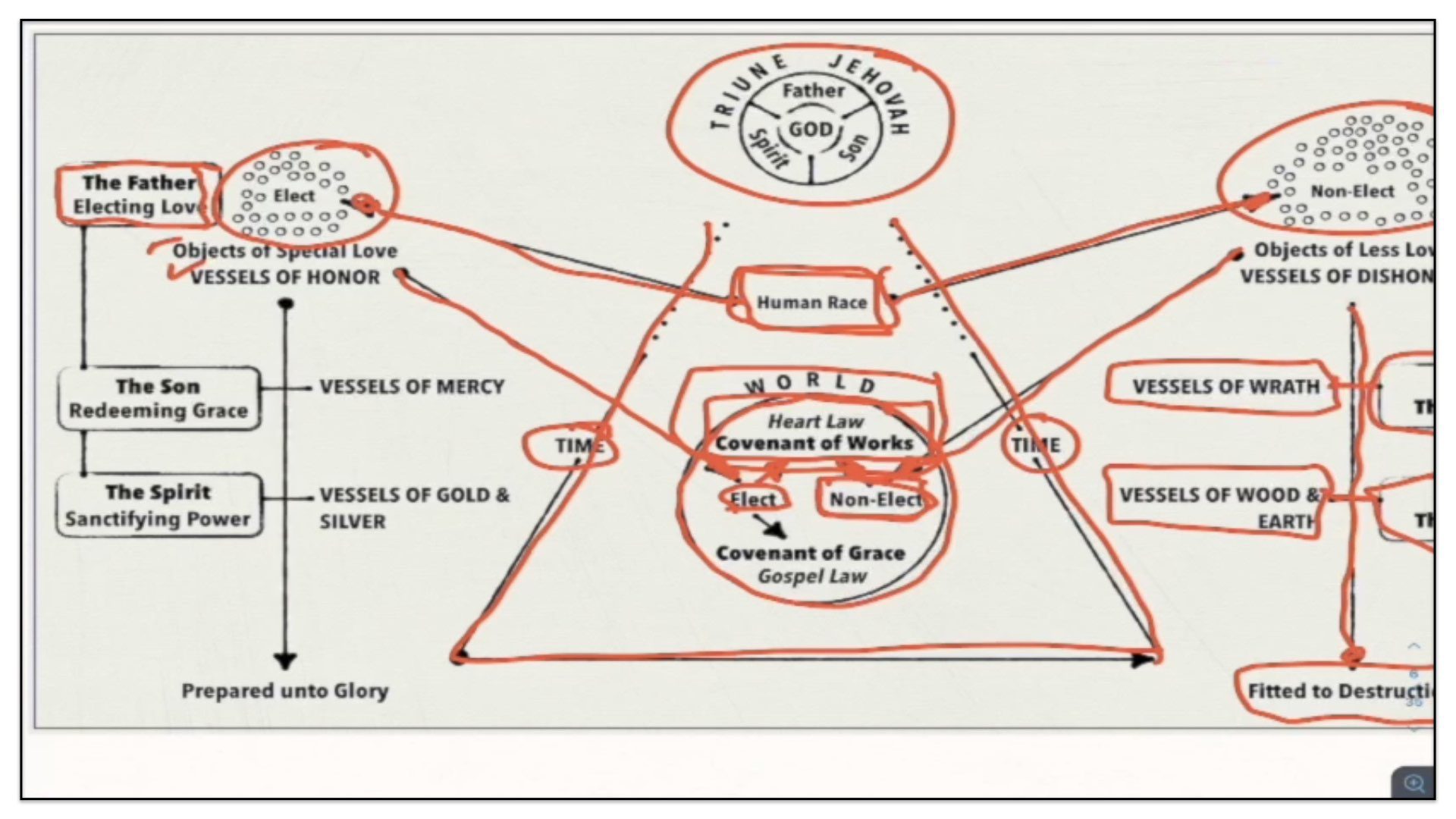
However, because the Father has already set His electing love upon the elect, now that they are viewed in sin, the Father has obligated Himself to the elect. He loves them with an everlasting love. He will not allow them to perish. So He devises a plan of salvation. It’s a two-fold plan.
The Redeeming Grace Of God The Son
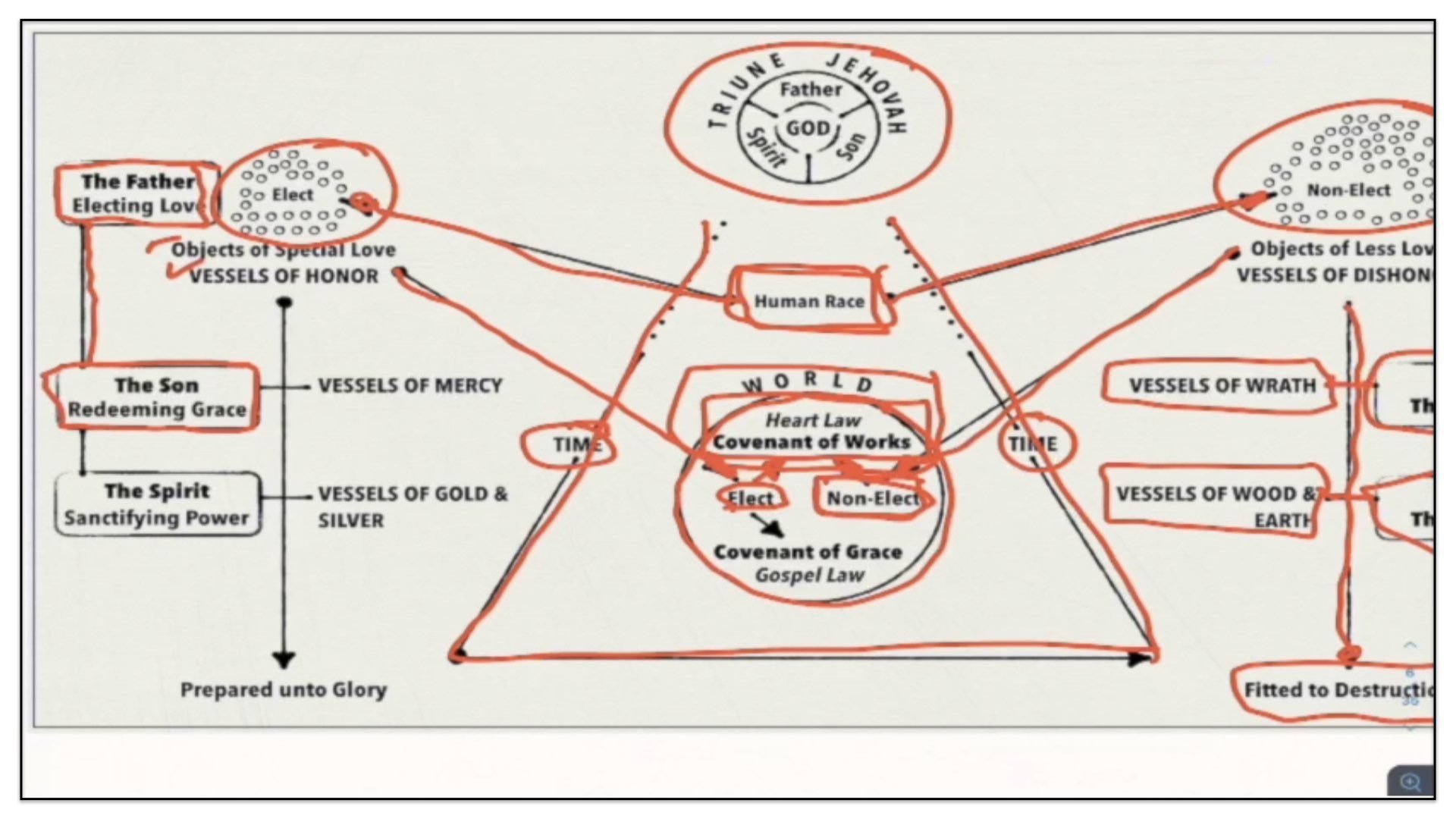
The first part of His plan is to give the elect to His Son. The Son of God received them to Himself setting His everlasting love upon them, too. And the Father appointed His Son to serve as their Redeemer. The Son of God agreed to redeem them.
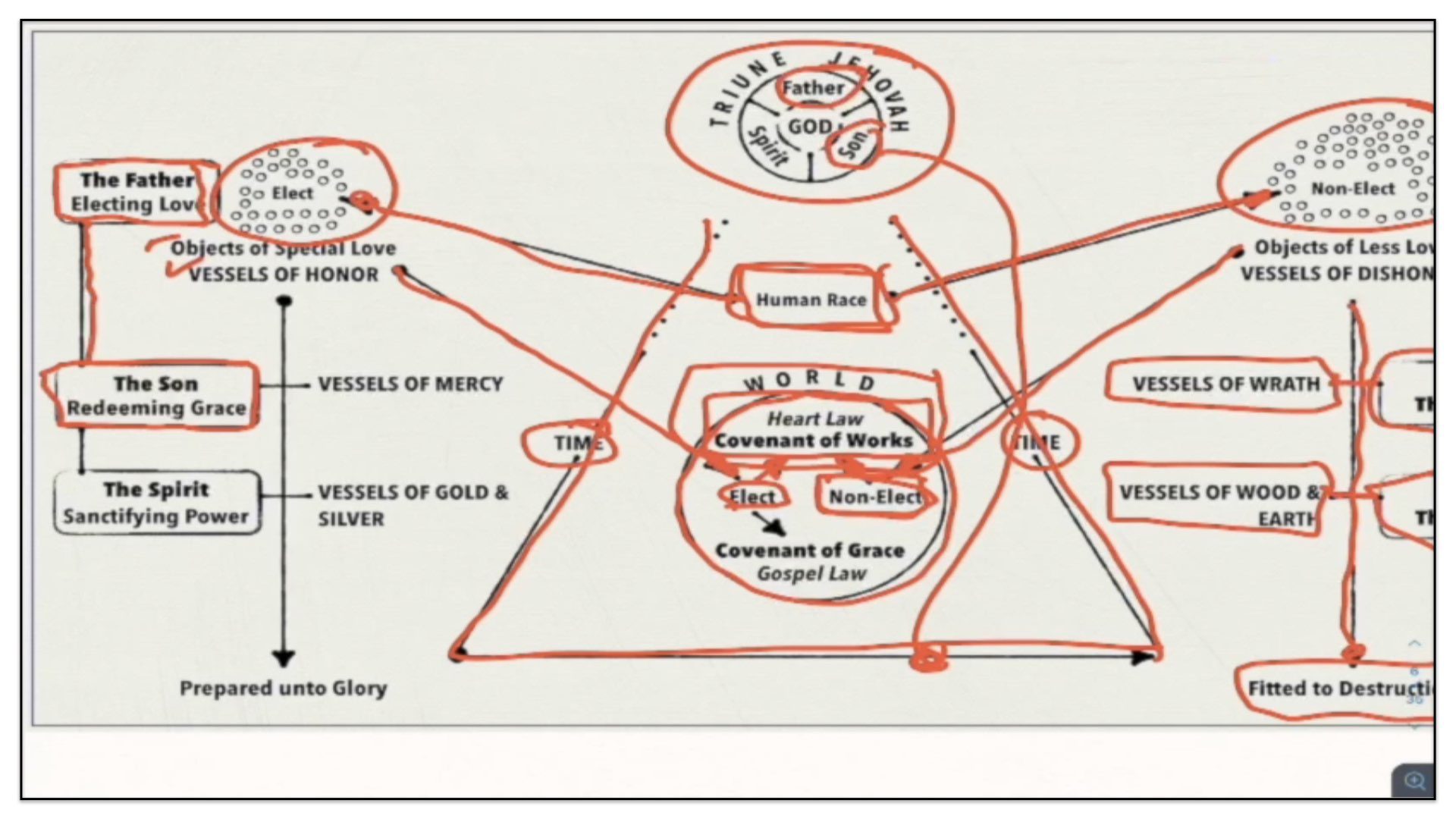
And it was required, therefore, in order to affect that redemption, for the Father to send forth His Son in the fullness of time, in the Person of the Lord Jesus Christ, in order that the Lord Jesus Christ might deliver us from our sins, through His sacrificial death at Calvary and earn for us righteousness by His perfect obedience to the law under the Covenant of Works.
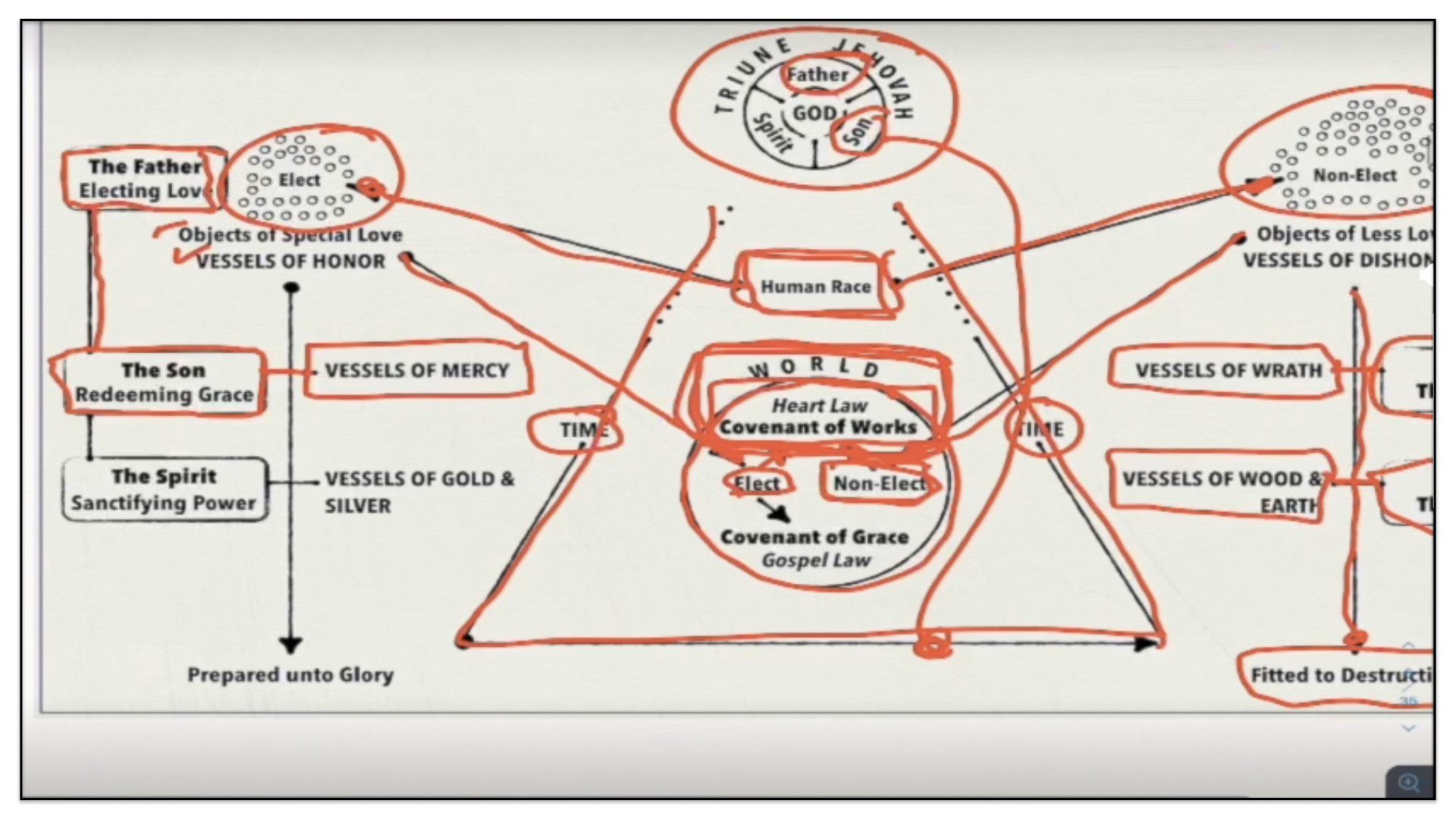
That’s the first part of God’s plan of salvation, which is what makes elect sinners the vessels of mercy, or the vessels of grace, rather than the vessels of wrath.
The Sanctifying Power Of God The Spirit
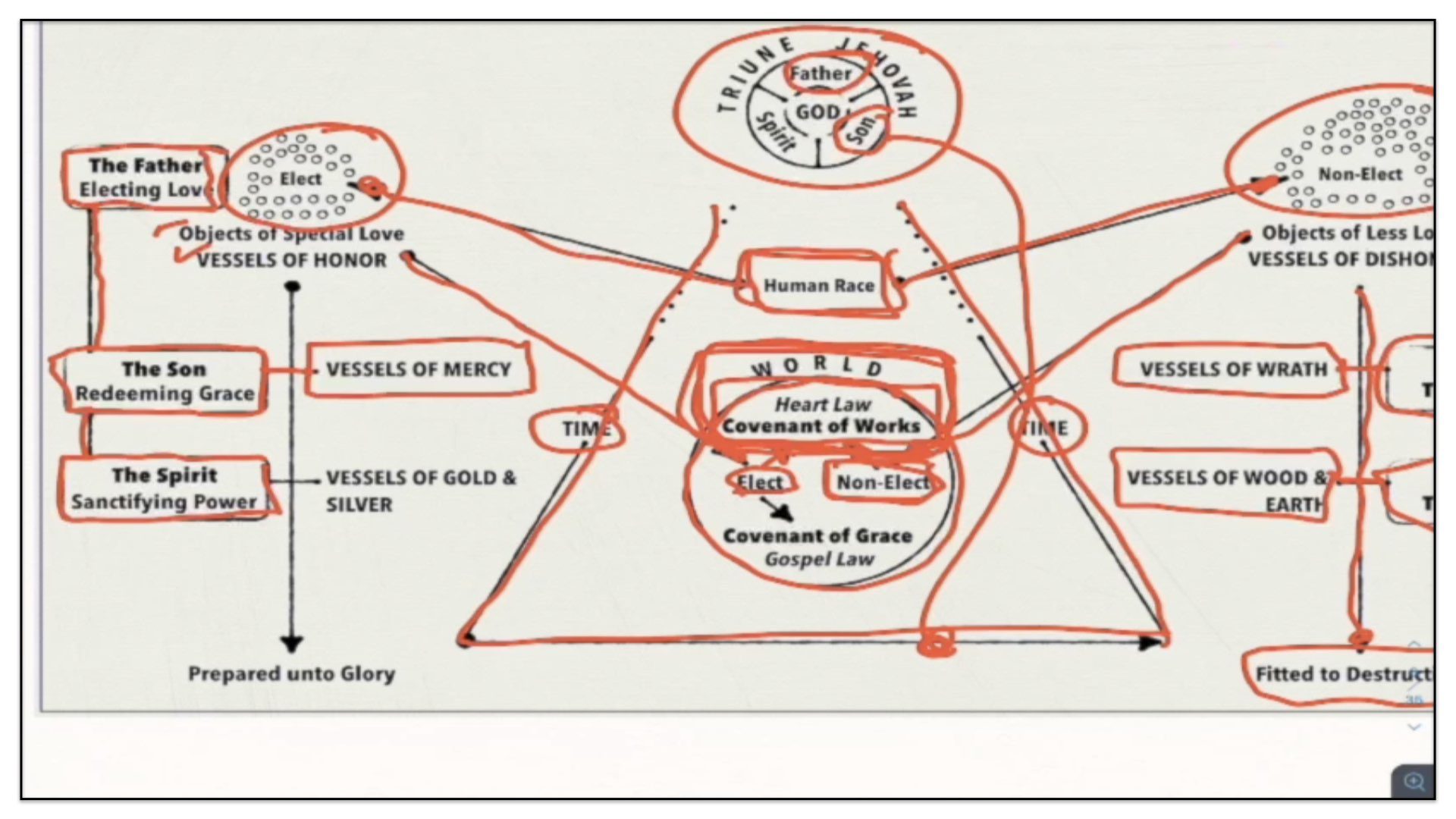
But the Father and the Son then decided to give the elect to the Holy Spirit, appointing Him to serve as their Sanctifier, insomuch that the Spirit of God then received the elect unto Himself setting His everlasting love upon them.
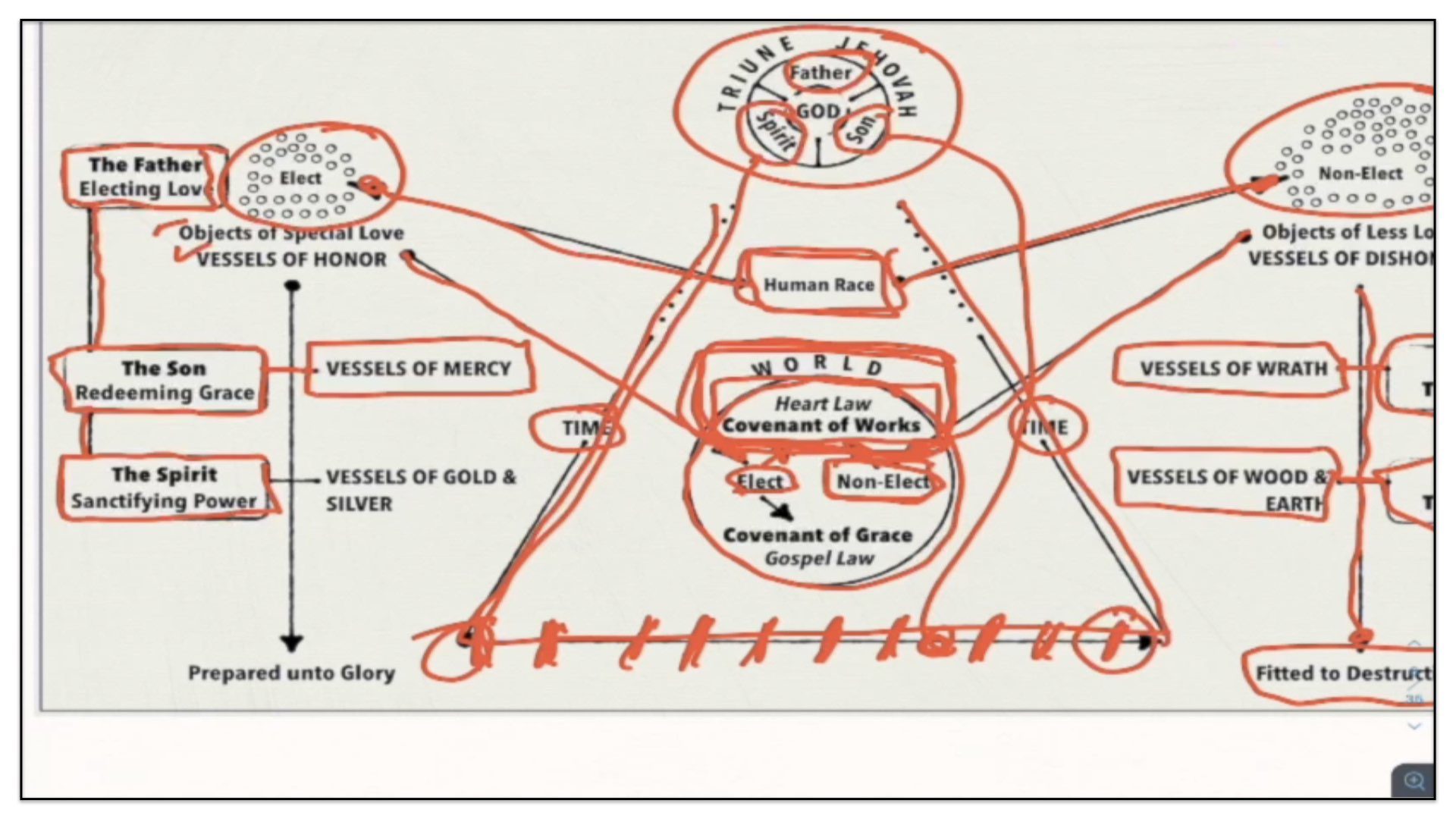
And He agreed to sanctify them, so that the Father and Son throughout the course of history sends the Holy Spirit to regenerate all of God’s elect people, beginning with Adam and Eve to the last elect person that will be brought into existence in this world.
The Elect Are Prepared Unto Glory According To The Covenantal Engagements Of The TriUne Jehovah
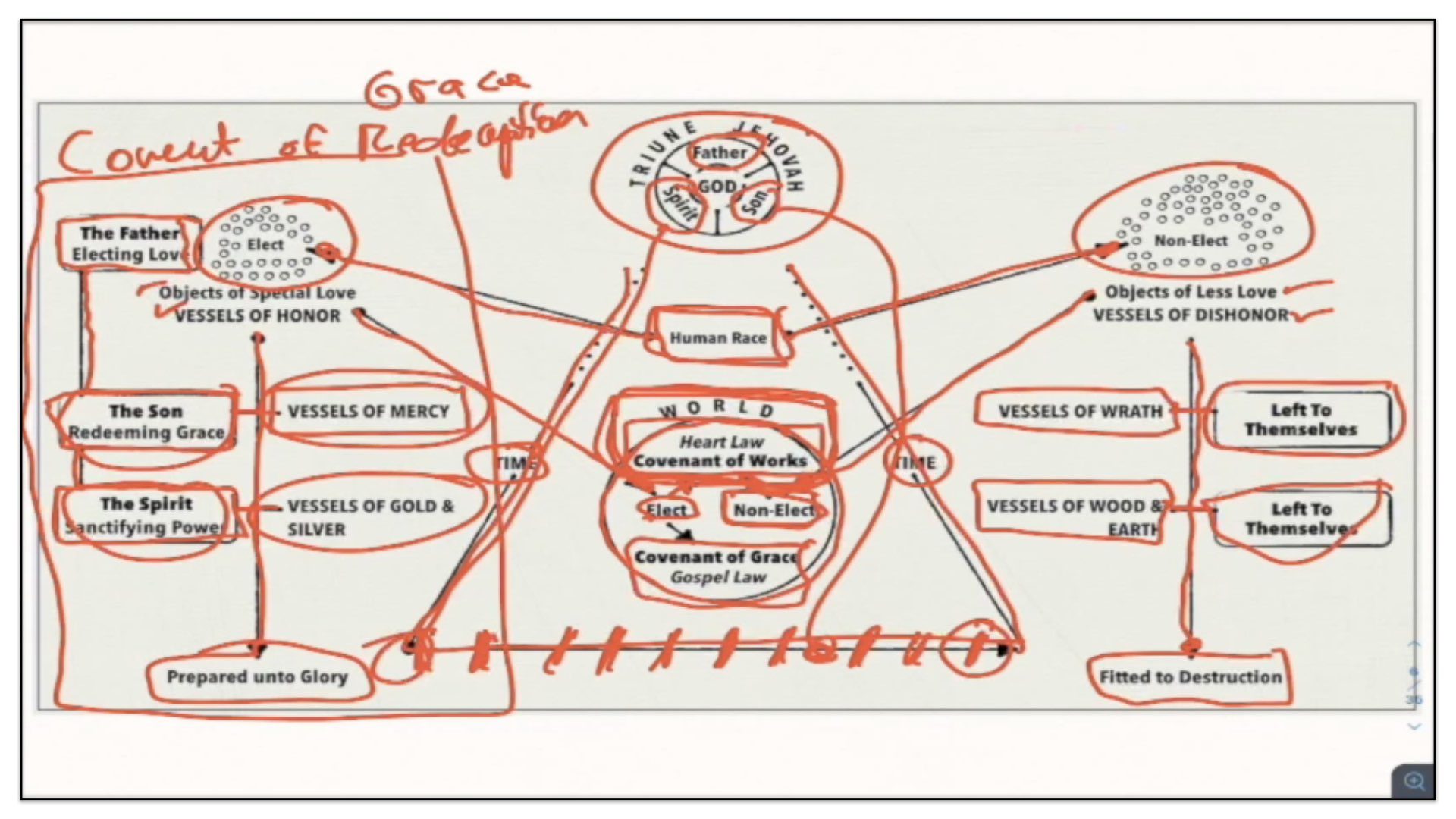
Now you see, this here is how God the Father has planned our salvation. Through redeeming grace and sanctifying power, making the elect vessels of mercy and vessels of gold and silver, fitting them or preparing them to glory, or heaven. And this is what’s called the Covenant of Redemption, which High-Calvinists believe is one and the same thing with the Covenant of Grace. Same covenant, different names.
How Do The Two Spiritual And Perpetual Covenants Link Together With The Earthly And Temporary Covenants?
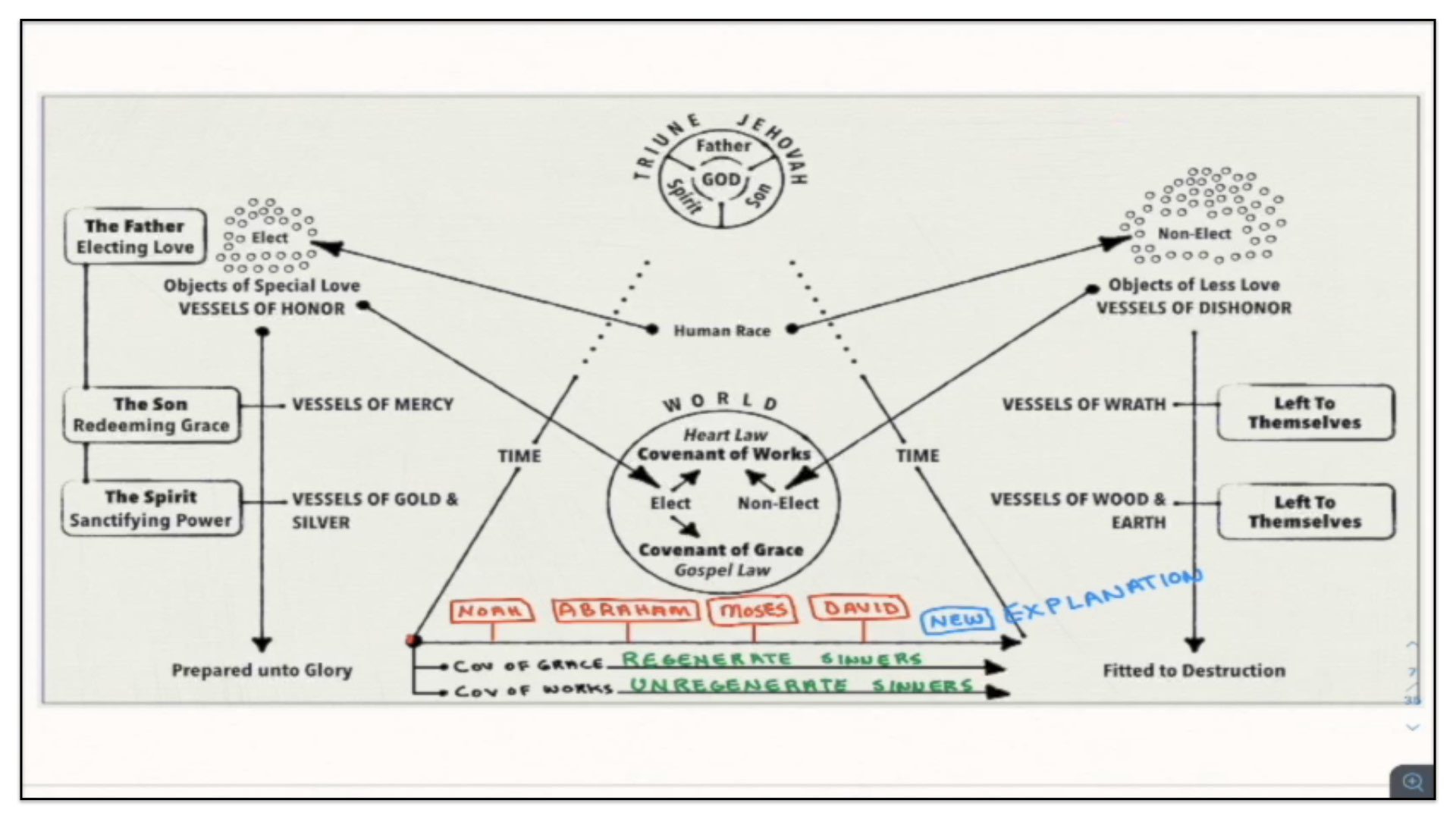
Now that’s the overview on how High-Calvinists, generally speaking, understand the two major covenants of the Bible. How does this link together with the other covenants of scripture? Well, let me refer you to one other framework where I have those notes written in the margins for you.
The Two Spiritual And Perpetual Covenants Have Been Active From The Garden Of Eden, With The Entire Human Race Subject To One Or The Other Throughout The Course Of History
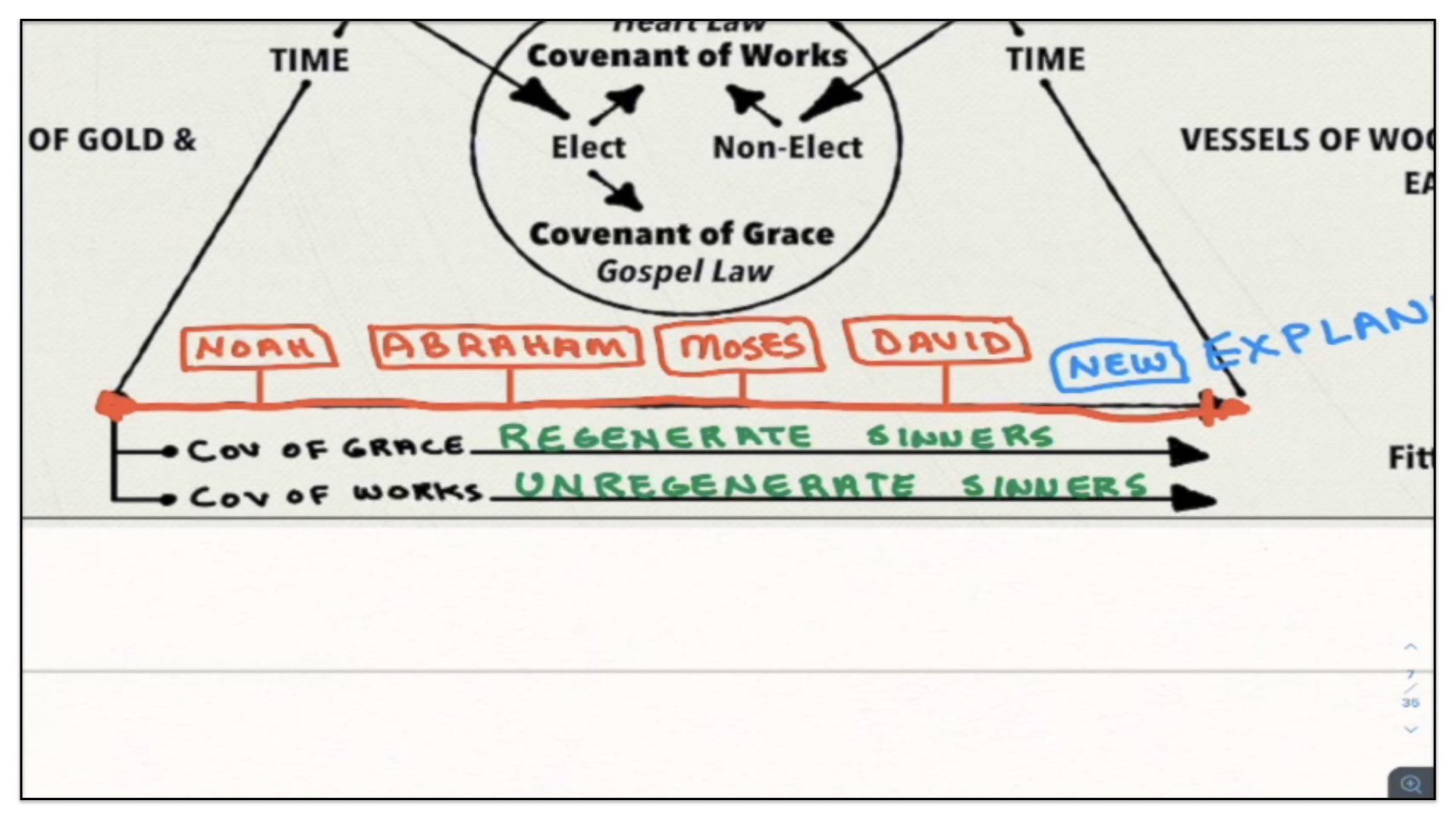
Look down at the timeline. On this timeline, see now how it all pieces together.
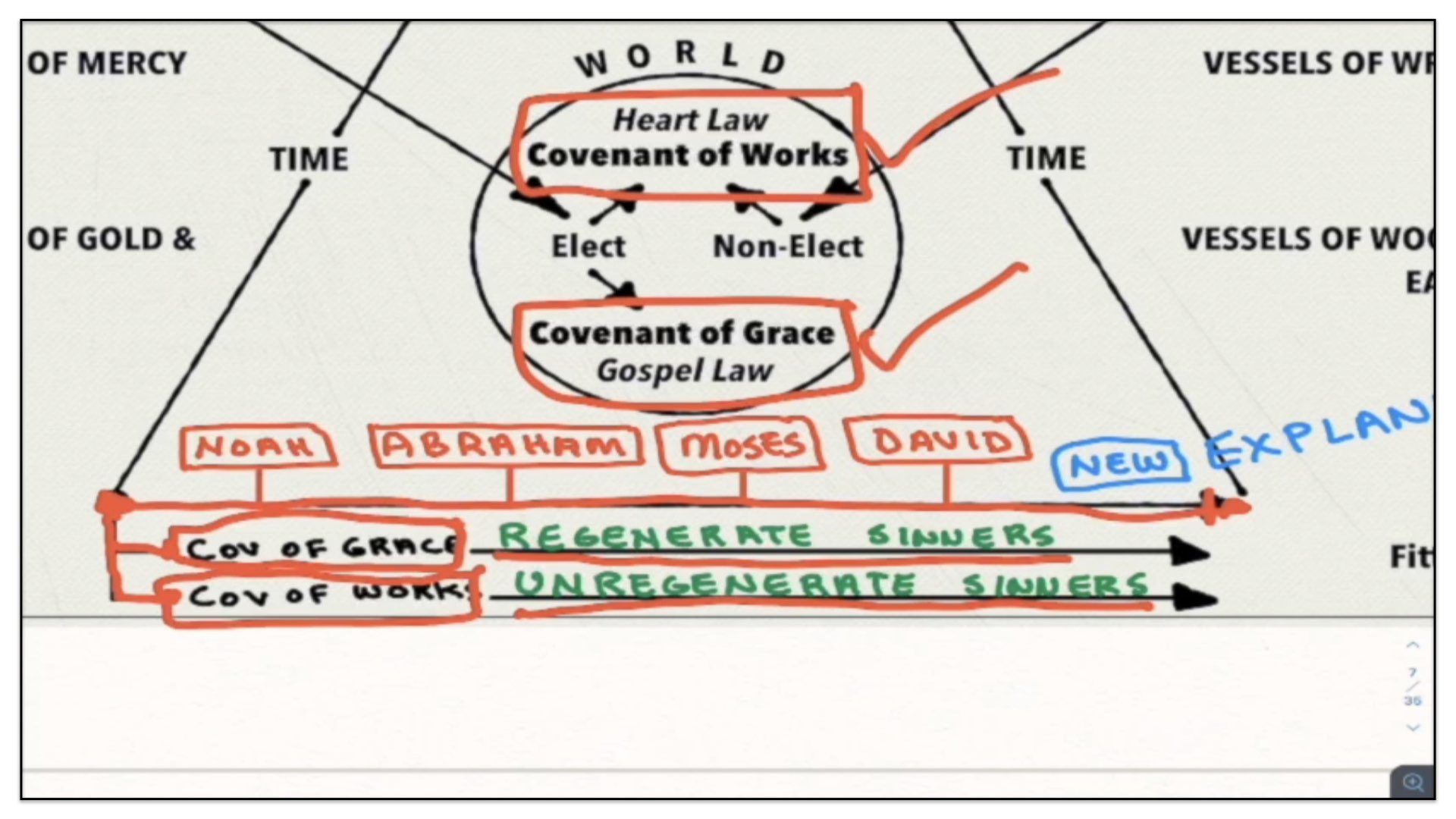
High-Calvinists believe that God has activated two covenants throughout the course of history, under which the members of the human race are accountable to Him. There’s the Covenant of Grace, or the Covenant of Redemption and there’s the Covenant of Works. All unregenerate sinners are accountable to God under the terms and promises of the Covenant of Works. That’s their duty. Whereas all regenerate sinners are accountable to God under the Covenant of Redemption, or the Covenant of Grace. That’s their duty.
God Is Administering Grace To The Members Of The Human Race According To The Authority Of The Covenant Under Which They Are Experientially Subject To Him
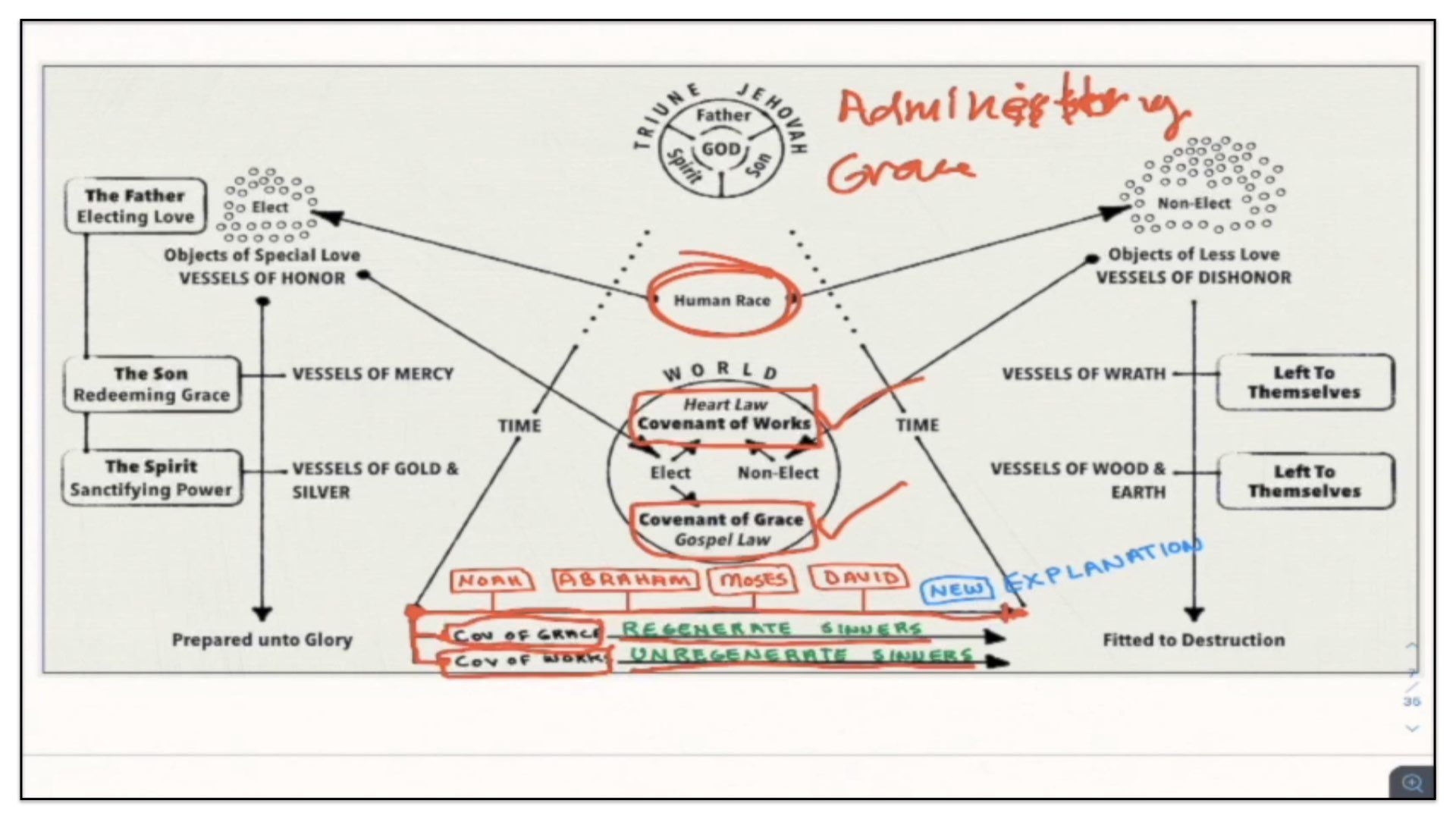
And my view is this—throughout the course of history, God is administering His grace to the various members of the human race.
A Common Grace Unto Creation Administered To All, Including The Non-Elect
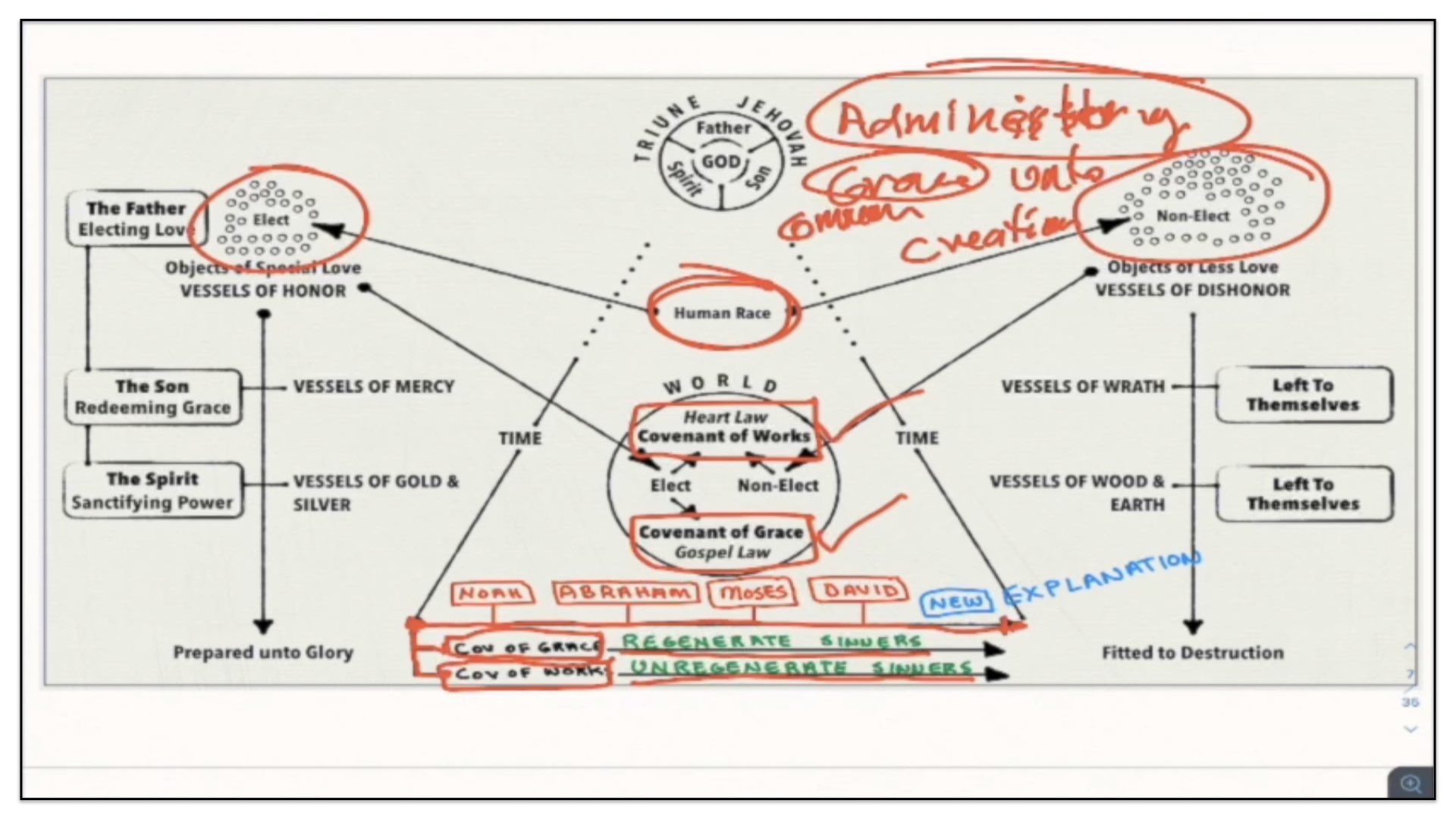
Watch this carefully. He’s administering a common grace unto creation which involves all creatures of the world; a common grace where God provides existence to creatures, He gives them things to enjoy upon this earth; the rain, the sun, food and clothing, the enjoyments that one can get from this life; all of this is a gift from God and it falls under this common grace unto creation. And you see, God is administering—there’s the important word—He’s administering that common grace, even to the non-elect as well as the elect. We’re all recipients of that common grace. But that common grace unto creation has absolutely nothing to do with salvation.
A Special Grace Unto Salvation Administered To The Elect, Excluding The Non-Elect
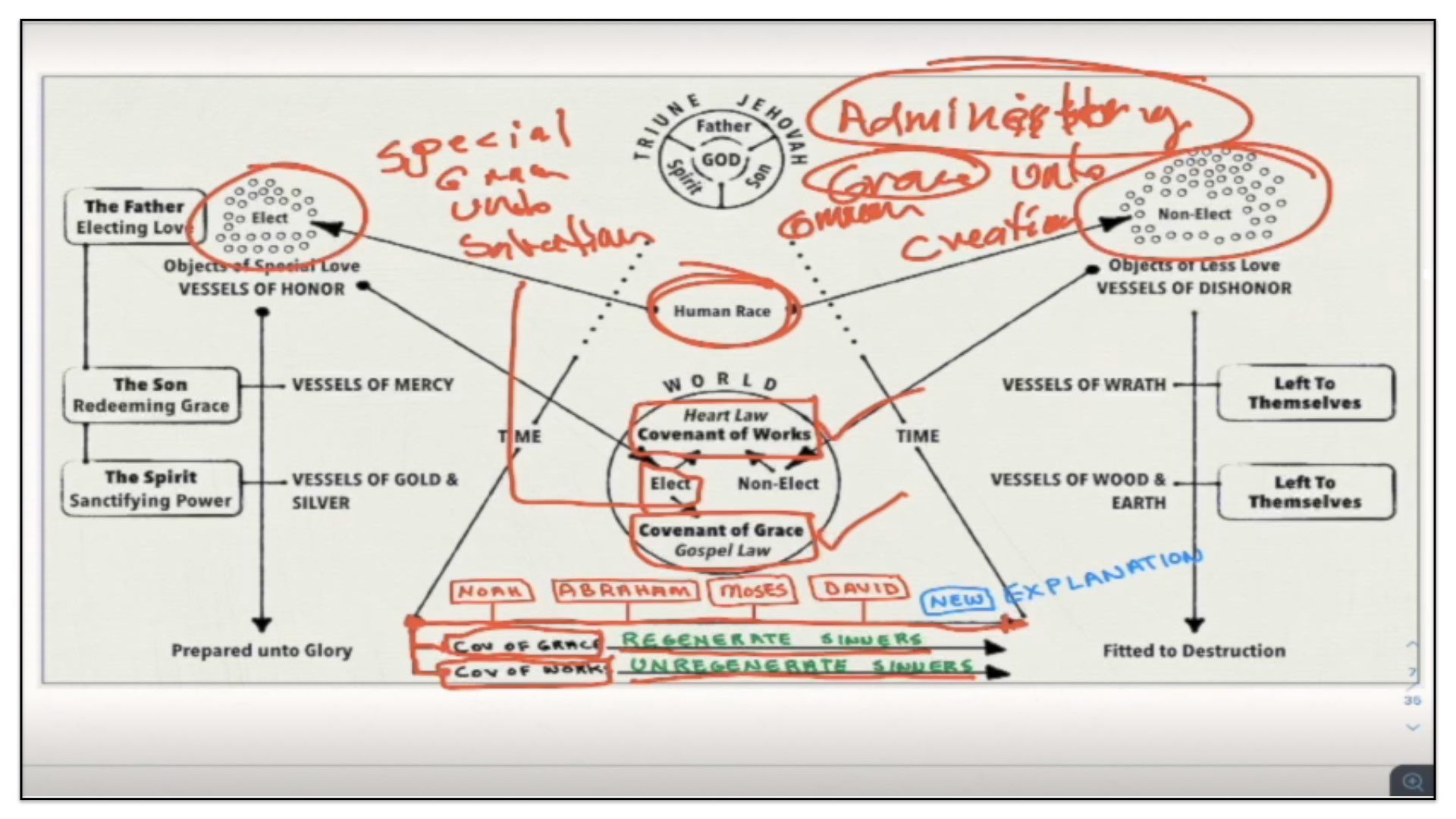
Watch this. God is also administering a special grace unto salvation, which only His elect people experience, or are recipients of.
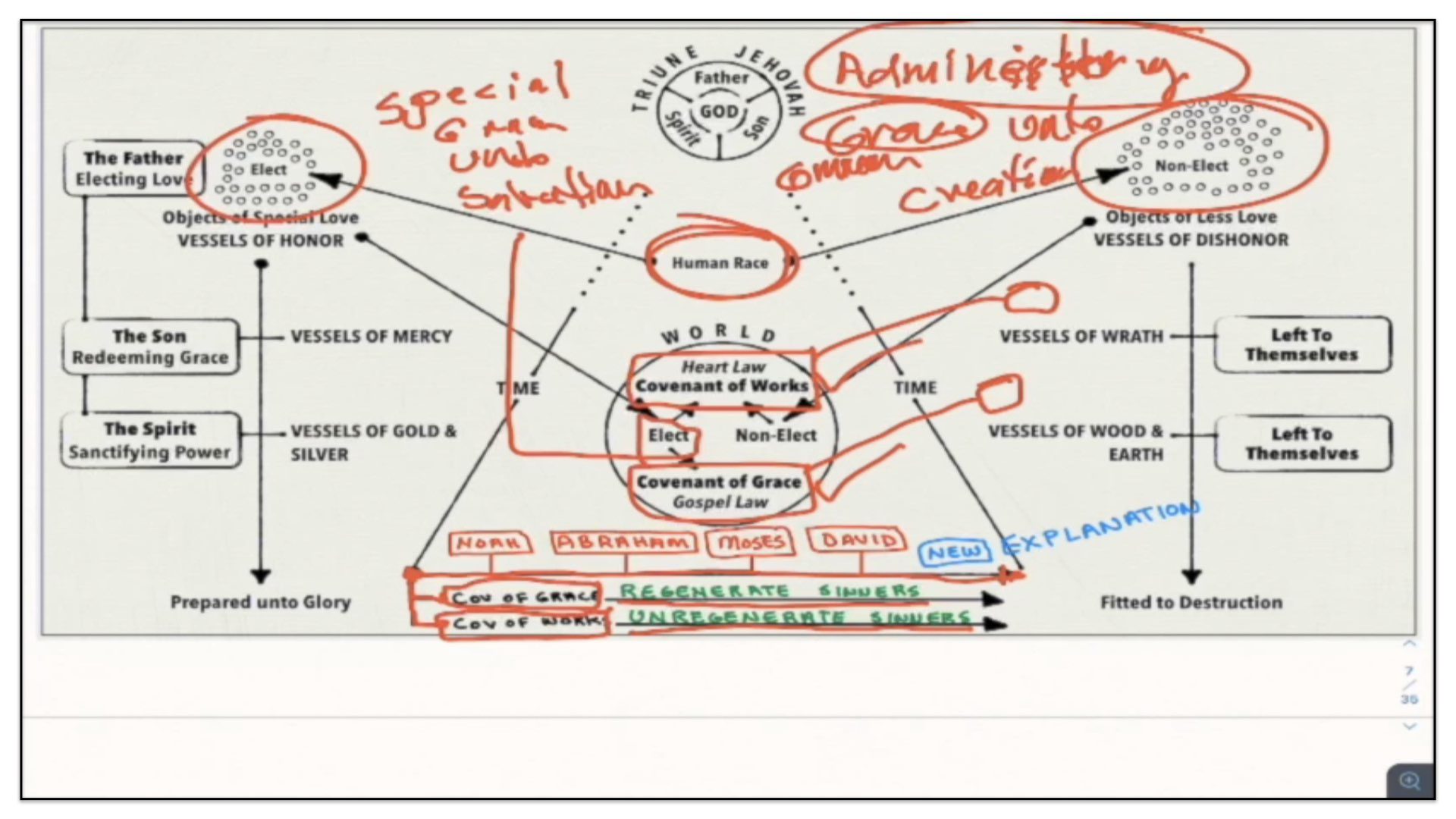
So, beginning with Adam and Eve to the end of this world, God is administering grace to the human race under one or the other of these two covenants. If they are unregenerate sinners, there is a common grace and if they are regenerate sinners it is a special grace. I believe it’s that simple.
The Earthly Covenants Were Established By God With A Different Purpose And Design
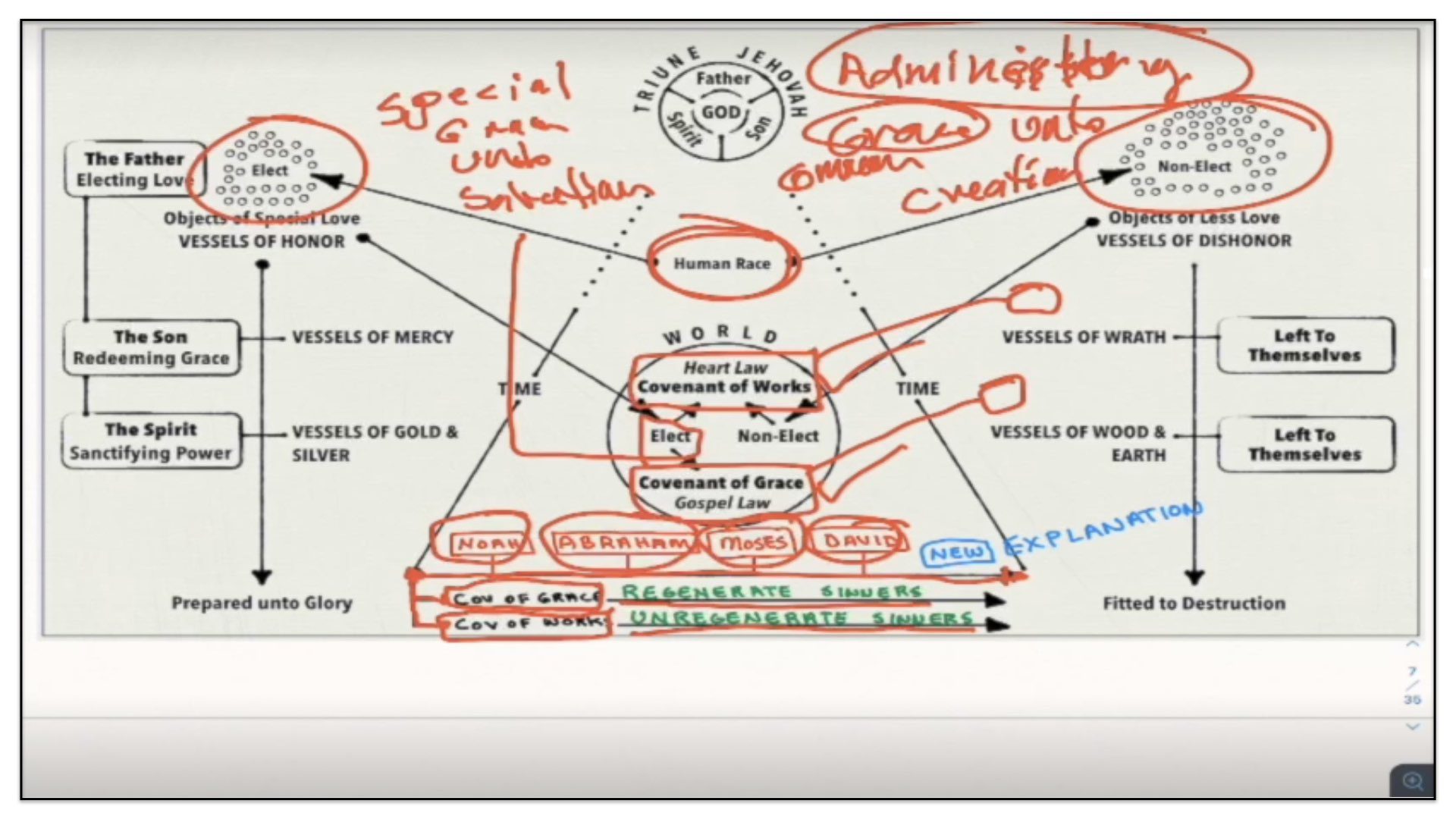
As for the other covenants you see, where they fit in now to the whole of this—the Noahic Covenant, the Abrahamic Covenant, the Mosaic Covenant, the Davidic Covenant are separate from the Covenant of Works and the Covenant of Redemption. They are earthly covenants, temporary covenants. God has a different purpose and design for those covenants. They’re not to be mixed together with or confused with the Covenant of Works or the Covenant of Grace/Covenant of Redemption.
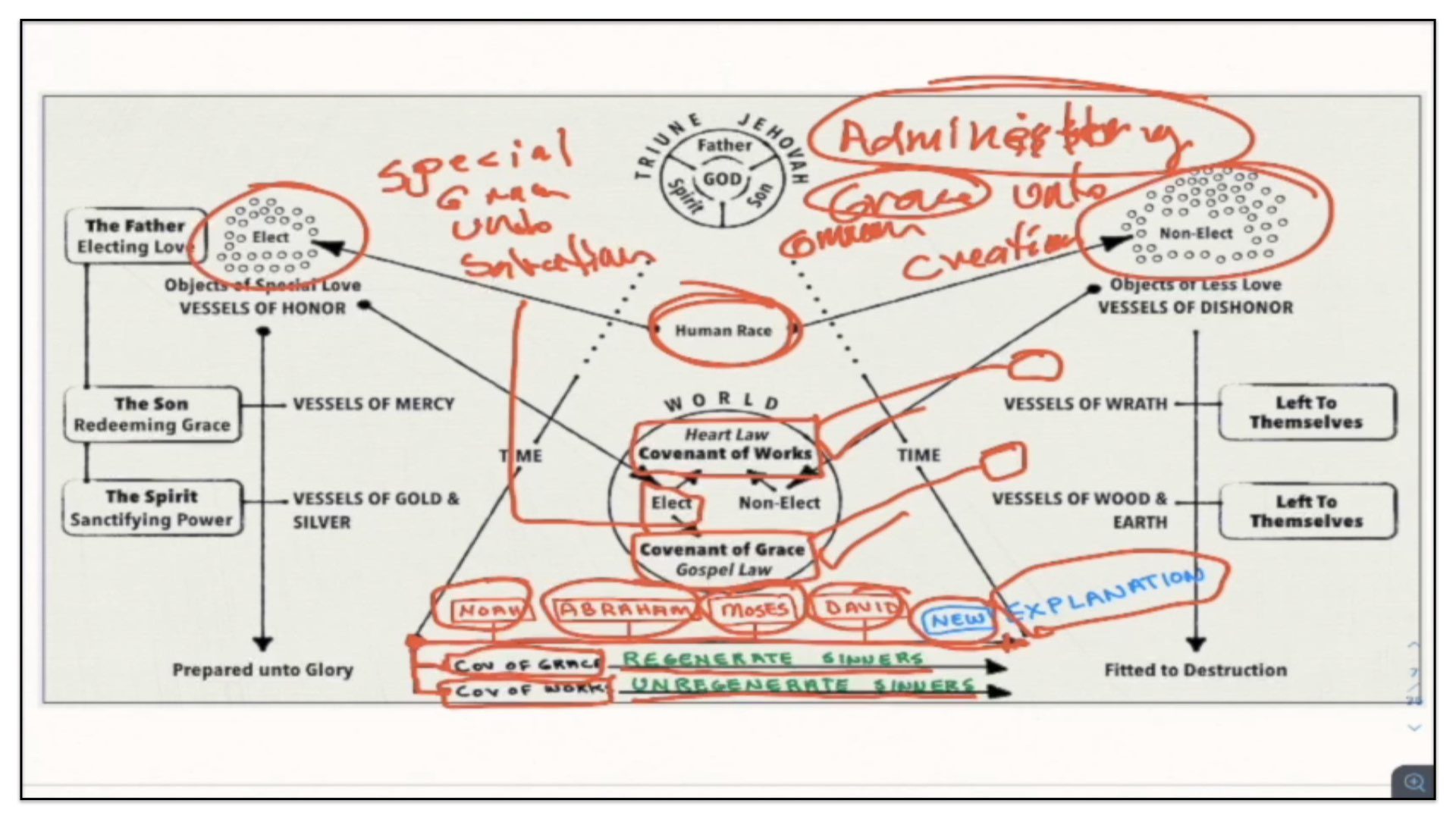
As for the New Covenant, watch. It’s not an administration of the Covenant of Redemption. It’s an explanation.
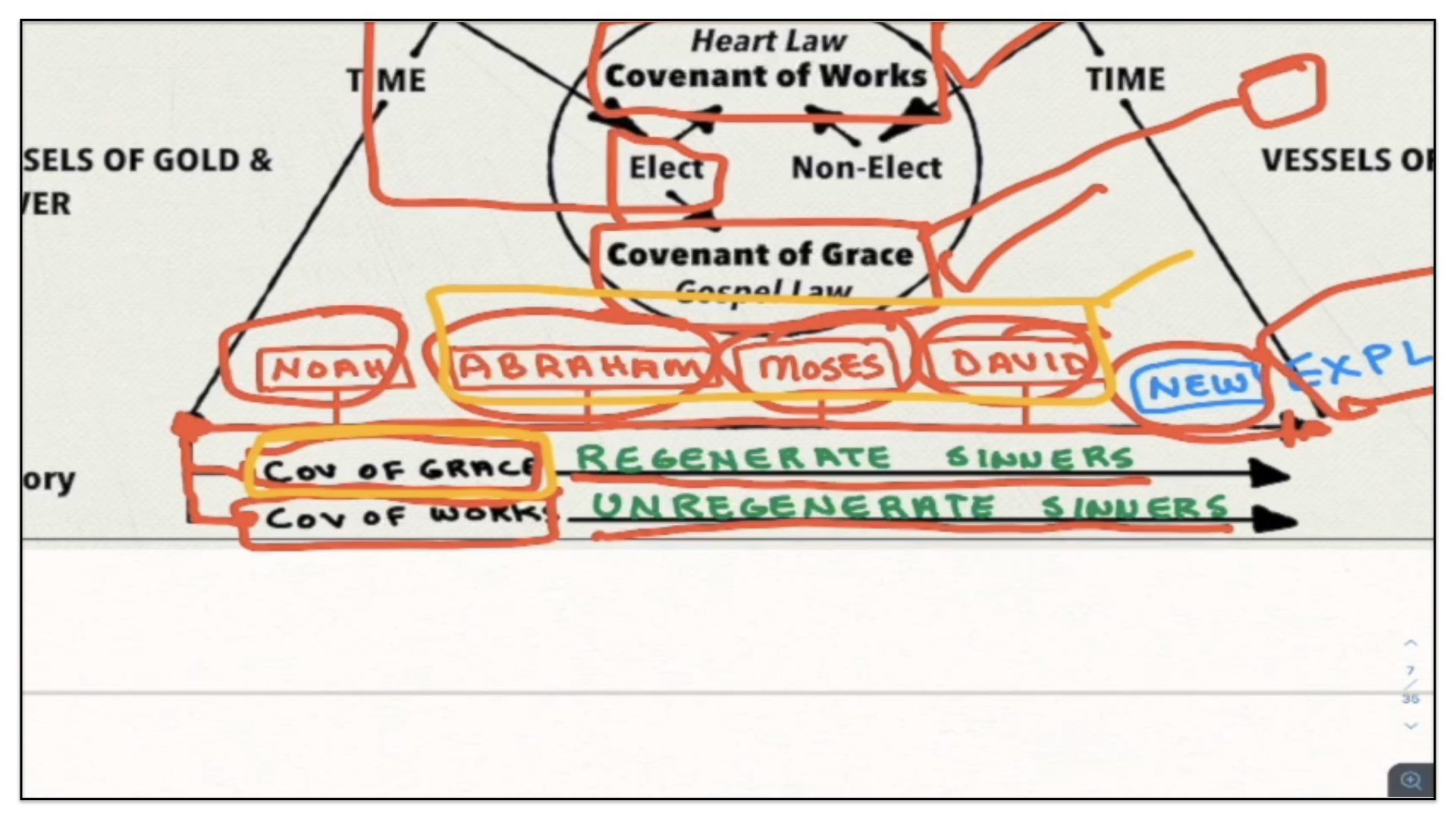
The Lord and the Apostles and Prophets are explaining to—I just change the color pen—they’re explaining to the Jewish people as a nation the Covenant of Grace while those Jewish people were living under the Mosaic economy and its laws. It’s an explanation, not an administration.
The New Covenant Is Not An Administration, Republication, Actualization Or Fulfillment Of The Covenant Of Redemption Or A Conditional Covenant Of Grace, But Rather, An EXPLANATION Of The Covenant Of Redemption To The Jewish People As A Nation That Were Living During The Time Of The Old And Early New Testament Eras
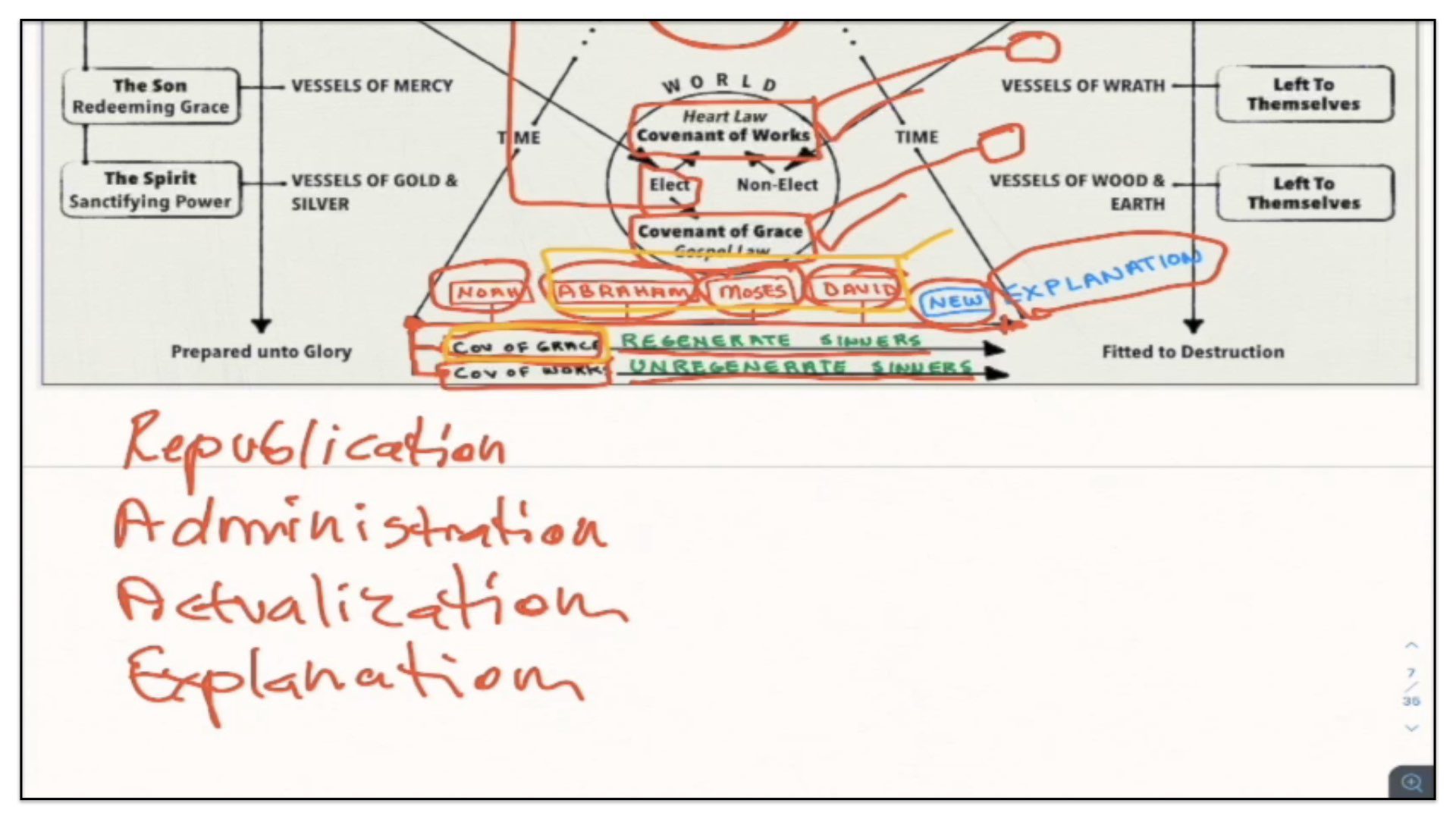
So to draw this to a conclusion on the comparison of views, let me put it to you in this form. There are four basic views then that we have on the New Covenant. Some believe that the New Covenant is a republication of a conditional Covenant of Grace; others and the same who believe it’s a republication, they also believe it’s an administration of a conditional Covenant of Grace or of the Covenant of Redemption, if one be a High-Calvinist. And then the 1689 Federalists believe the New Covenant is the actualization of a conditional Covenant of Grace. They don’t believe it’s an administration or a republication. They believe it’s an actualization, the realization of a conditional Covenant of Grace. Whereas the view I’m taking, which differs from these others, is that the New Covenant is an explanation of the Covenant of Redemption, otherwise known as the Covenant of Grace, to the Jewish people as a nation within the context of the Mosaic economy and its laws.
Some Lessons That May Be Gleaned From This Teaching
Okay. Well, that’s my teachings for you in the comparative views. Before I close the study, let me give you just a few points to take away with you. What can we learn from this teaching? What can we take practically away with us?
I Hope This Overview On The Views Maintained By Various Groups Will Enable You To Exercise Discernment When Sitting Under Their Teachings
Number one—the next time you sit under the teachings of a Presbyterian, a traditional Reformed Baptist, a 1689 Federalist, a High-Calvinist, I hope you’ll be better able to exercise discernment when you listen to those teachings. Understand how they’re approaching the scriptures. They all use the same language. My dear friends, please listen to me. They all use the same language. They all use Covenant of Redemption, Covenant of Grace, administration, republication, actualization, progressive revelation. All of these are common phrases, common language for all the groups, and yet depending on which group you belong, it determines how you understand that language. They do not all mean the same thing by that language. And that’s what makes it so confusing for a lot of people. They can sit under one Reformed Baptist, a traditionalist for instance, and think, “Hmm, that’s interesting.” Then sit under a 1699 Federalist and then they get confused. They think well, “I thought they believe this and not that.” And then a Presbyterian confuses it more; High-Calvinist confuses it more. We all use same language, but we mean different things by it. So please, my dear friends, understand the perspectives these groups have and when you sit under their teachings don’t get confused by what it is they’re saying. Understand what they’re aiming at.
We Should Not Be Afraid To Nurture Views On Biblical Teachings Which Differ From Others If The Lord Is Pleased To Shed Light On Issues Sealed by Conviction
Here’s another point that you can take away with you—I presented to you in the series of teachings and even in this study a slightly different view on the earthly covenants and the New Covenant than even that which John Gill subscribed to. It’s a healthy thing for all of us to examine the scriptures and seek an understanding directly from the Lord. It’s important we don’t depart from generally accepted views quickly. These are people that have gone before us. They too have sought that guidance from the Lord and that was their understanding of things. And it’s good that we study their teachings and know how it is God led them and their understandings. But we should never be boxed in to those teachings. We should always have a fresh approach to the scriptures and be willing to examine the Word of God from scratch and be willing to depart from the views—even if they be views held for a long period of time by many people—be willing to depart from those views if God gives us clarity on the teachings of his Word and we are sharpening our understanding of things. No one has a monopoly on the truth. All of us are in error on many different aspects of scripture. All of us. None of us are infallible. And we must therefore with a humility and caution come to the scriptures seeking an understanding directly from the Lord. This is how I’ve approached the scriptures when it comes to my understanding of the earthly covenants. And departing from the views of Gill is not something I did quickly or have taken lightly. But having done so, I do believe how I understand these things is in accordance with a legitimate interpretation of scripture. And therefore the takeaway from this is simply to say to you, not only study the scriptures for yourself to seek an understanding from the Lord, for your own personal conviction and viewpoint, but perhaps there’s something that I have said in these teachings that will cause you to be challenged in how you have been understanding the scriptures and theology. And if so, you might not cultivate my same view but perhaps it’ll help you as a stepping stone as you continue to gain clarity for yourself on these issues.
My Dear Friend, You Are A Dispensation Of God’s Grace
Here’s another takeaway for you and this will be my final point—take a look at the Framework of Sovereign Grace in front of you here on the screen. God’s masterplan for the ages. That language is something you hear people that are called dispensationalists. That’s the language they use. Dispensationalists love to talk about God’s masterplan for the ages. I’m adopting the language. And I’m now referring with that language to covenant theology. And I’m now asking you to consider God’s masterplan for the ages in light of covenant theology. What is God’s masterplan for the ages? It is a dispensation, otherwise known as administration—that’s the meaning of dispensation, an administration—God’s masterplan for the ages is an administration or dispensation of God’s grace to the human race under one of two covenants. A Covenant of Works and a Covenant of Grace or Redemption. That’s what God is doing for every man and woman in this world today and what He did in years gone by and what He will continue to do to the end of this world as we know it. It is an administration of God’s grace to individuals. Have you ever considered that, my dear friend? You are a dispensation of God’s grace. It doesn’t matter who you are—a non-Christian or a Christian.
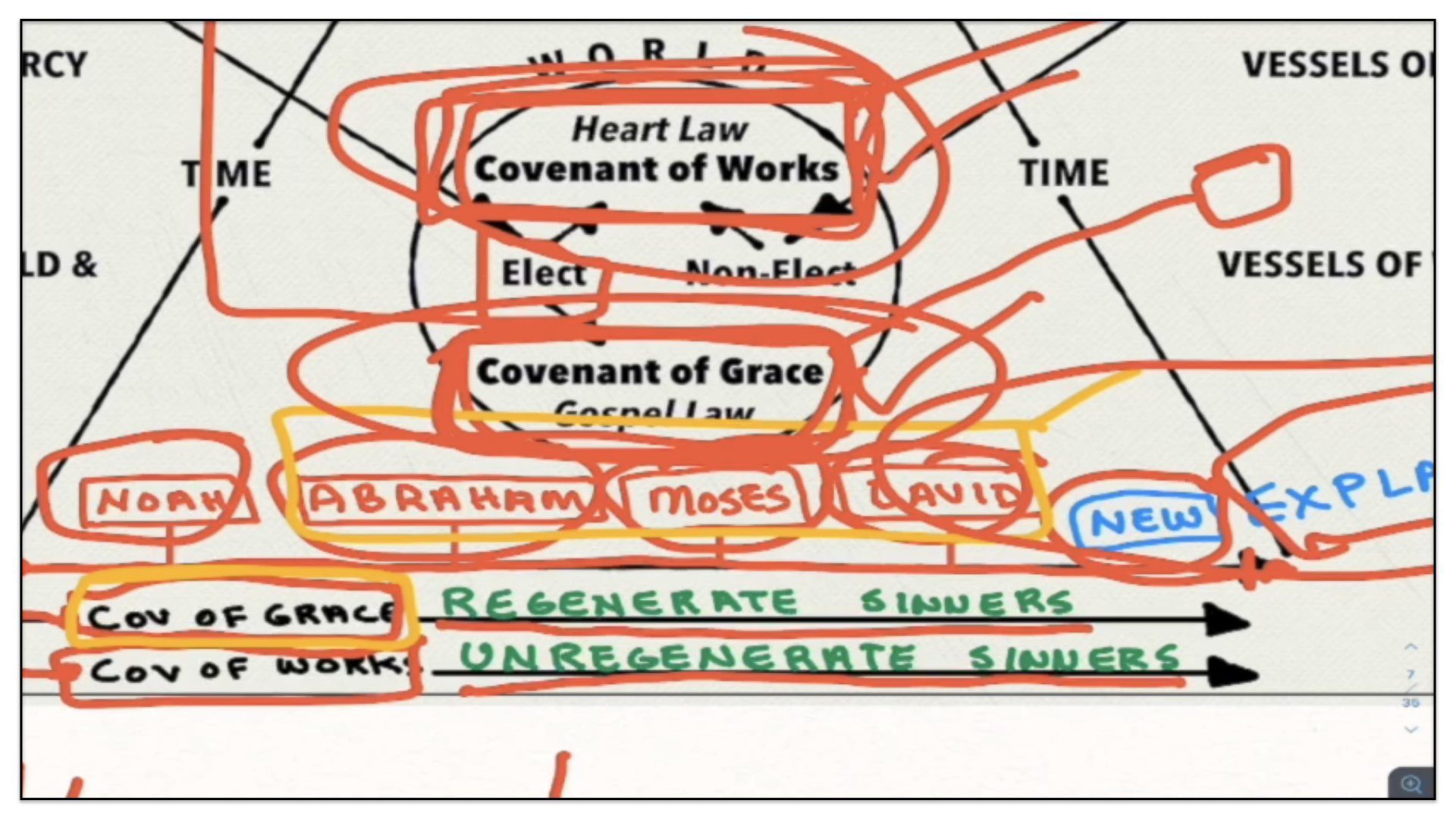
My dear friend, you are an administration of God’s grace. A dispensation of God’s grace. God is currently at this very moment dispensing, administering to you grace in some form. He’s either administering to you a common grace under the Covenant of Works if you be an unregenerate sinner, or He’s administering to you a special grace unto salvation under the Covenant of Grace if you’ve been born again. And that should be a great encouragement to all of us my friends. We are dispensations of God’s grace. That is His masterplan for the ages. That is God’s plan for you and for me, that we be administrations of His grace.
A Final Word
Okay. Well listen, I have one more study to bring to you in this series on the biblical covenants. I think one more. And that’s going to be on the difference between Israel and the church. Reformed theology, covenant theology, often blurs the line between Israel of the Old Testament and the church of the New Testament, and Reformed theology often thinks of the church as a universal and invisible body of all of God’s elect people throughout the ages. I don’t believe that that is a proper use of the words church or Israel as we find it in the scriptures. And therefore, I’m a covenant believer, covenant theologian, covenant preacher, and therefore I’m going to present to you next week my views on Israel and the church as a covenant theologian, or a covenant preacher, covenant believer. And I’m going to take a very Baptist view on the subject and I’ll invite you back to join me for that study. Until then, I want to wish upon you every blessing in the Lord and may you know His grace administered to you as you walk with Him step by step.
Jared Smith served twenty years as pastor of a Strict and Particular Baptist church in Kensington (London, England). He now serves as an Evangelist in the Philippines, preaching the gospel, organizing churches and training gospel preachers.
Jared Smith's Online Worship Services
Jared Smith's Sermons
Jared Smith on the Gospel Message
Jared Smith on the Biblical Covenants
Jared Smith on 18th Century Covenant Theology (Hyper-Calvinism)
Jared Smith on the Gospel Law
Jared Smith on Bible Doctrine
Jared Smith on Bible Reading
Jared Smith's Hymn Studies
Jared Smith on Eldership
Jared Smith's Studies In Genesis
Jared Smith's Studies in Romans
Jared Smith on Various Issues
Jared Smith, Covenant Baptist Church, Philippines
Jared Smith's Maternal Ancestry (Complete)




